

TOM’S CRUISE
Matthew Macfadyen sidles into Succession’s hot seat
JUDGE NOT Why Bryan Cranston has never done karaoke
PLUS: Emily Blunt, Dominique Fishback, Evan Peters, Keri Russell, Michael Chiklis, Elizabeth Debicki
HIGH CONCEPT: GAME OF THRONES BROKE DOWN THE EMMY BARRIERS, AND NOW THIS YEAR’S CROP OF GENRE HITS REDEFINES PEAK TV, INCLUDING: THE LAST OF US, HOUSE OF THE DRAGON, STAR WARS: ANDOR, THE LORD OF THE RINGS: THE RINGS OF POWER & STAR TREK: PICARD
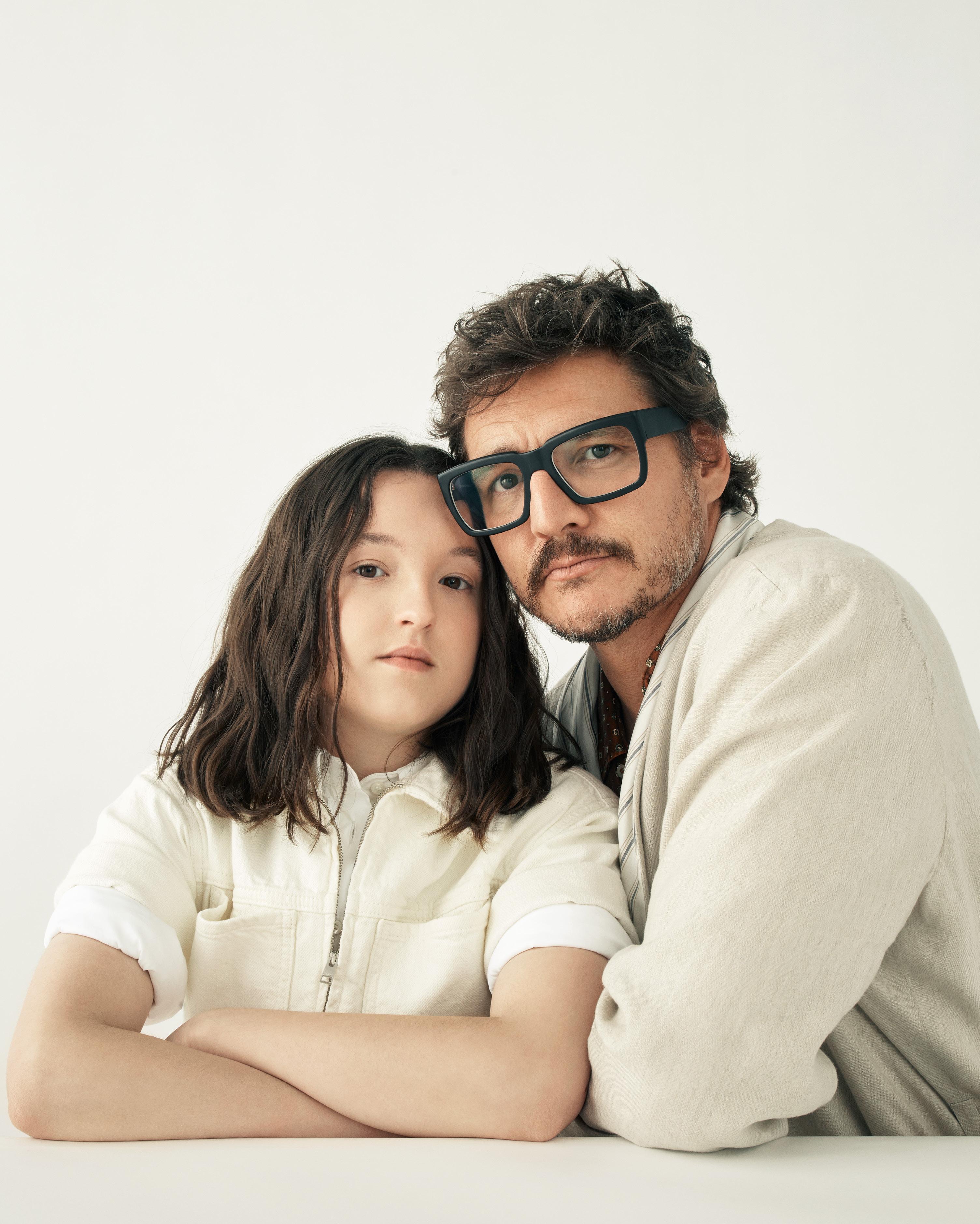
JUNE 14, 2023 / EMMY PREVIEW
Intriguing one-on-one conversations between Deadline’s awards editor and leading actors of film & television SCAN

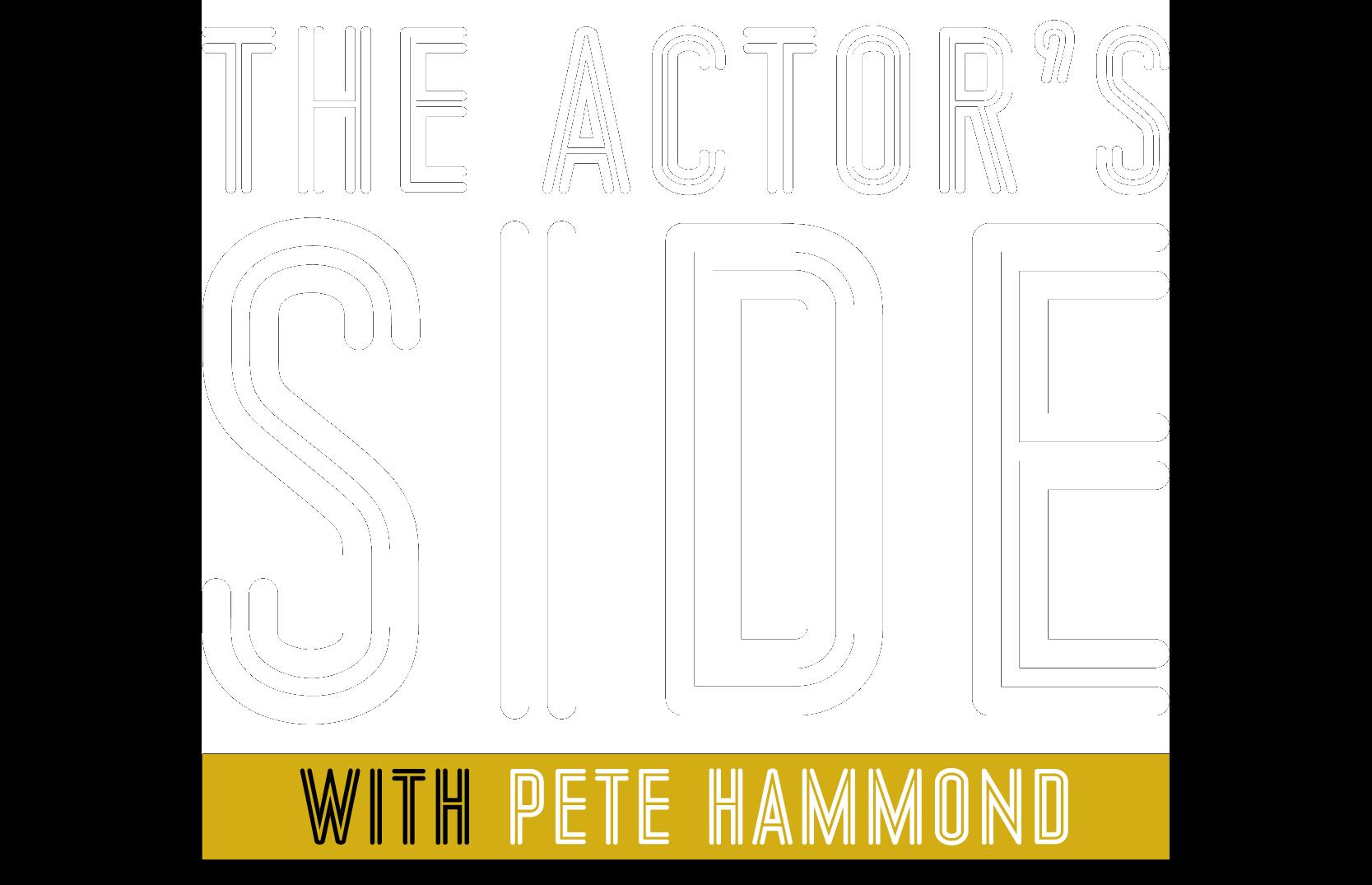
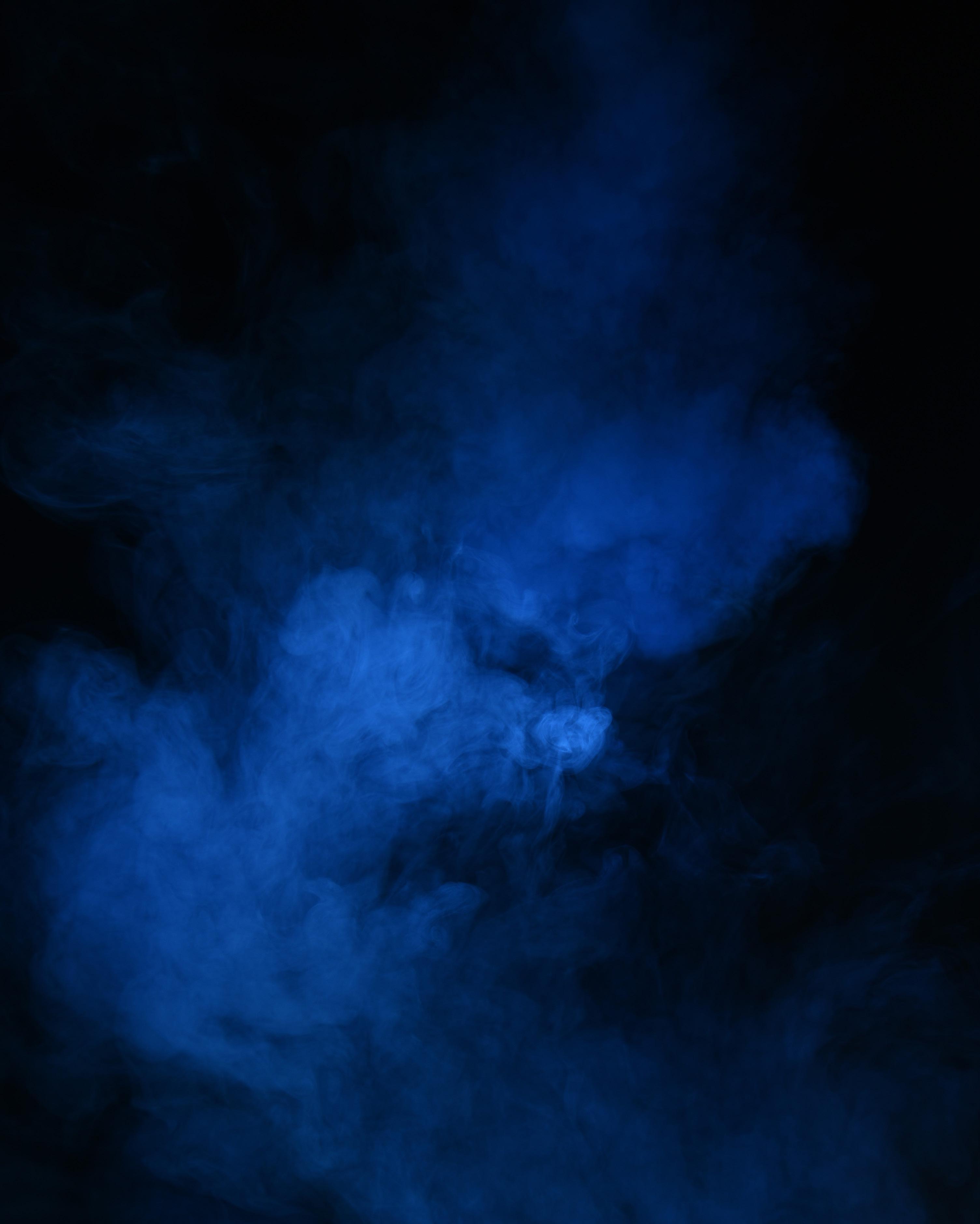
DEADLINE.COM/VIDEO
THE QR CODE OR VISIT:
TOM’S CRUISE
JUDGE NOT Why Bryan Cranston has never done karaoke
HIGH CONCEPT: GAME OF THRONES BROKE DOWN THE EMMY BARRIERS, AND NOW THIS YEAR’S CROP OF GENRE HITS REDEFINES PEAK TV, INCLUDING: HOUSE OF THE DRAGON, THE LAST OF US, STAR WARS: ANDOR, THE LORD OF THE RINGS: THE RINGS OF POWER & STAR TREK: PICARD

JUNE 14, 2023 / EMMY PREVIEW
Matthew Macfadyen sidles into Succession’s hot seat
PLUS: Emily Blunt, Dominique Fishback, Evan Peters, Keri Russell, Michael Chiklis, Elizabeth Debicki

PRESIDENT Stacey Farish
EXECUTIVE AWARDS EDITOR
Joe Utichi
VICE PRESIDENT, CREATIVE
Craig Edwards
SENIOR AWARDS EDITOR
Antonia Blyth
TELEVISION EDITOR
Lynette Rice
FILM EDITOR
Damon Wise
DOCUMENTARY EDITOR
Matthew Carey
CRAFTS EDITOR
Ryan Fleming
PRODUCTION EDITOR
David Morgan
EDITORIAL ASSISTANT
Destiny Jackson
DIRECTOR, SOCIAL MEDIA
Scott Shilstone
DIRECTOR, EVENTS
Sophie Hertz
DIRECTOR, BRAND MARKETING
Laureen O’Brien
EVENTS MANAGER
Allison DaQuila
VIDEO MANAGER
David Janove
VIDEO PRODUCERS
Benjamin Bloom
Jade Collins
Shane Whitaker
DESIGNERS
Catalina Castro
Grant Dehner
SOCIAL MEDIA COORDINATOR
Natalie Sitek
DESIGN/PRODUCTION COORDINATOR
Paige Petersen
CHIEF PHOTOGRAPHER
Michael Buckner
PUBLISHER
Kasey Champion
SENIOR VICE PRESIDENT, GLOBAL BUSINESS
DEVELOPMENT & STRATEGIC PARTNERSHIPS
Céline Rotterman
VICE PRESIDENT, ENTERTAINMENT
Caren Gibbens
VICE PRESIDENT, INTERNATIONAL SALES
Patricia Arescy
VICE PRESIDENT, SALES & EVENTS
Tracy Kain
SENIOR DIRECTOR, ENTERTAINMENT
Brianna Corrado
DIRECTOR, ENTERTAINMENT
London Sanders
DIRECTOR, DIGITAL SALES PLANNING
Letitia Buchan
ACCOUNT EXECUTIVE
Michael Bronstein
SENIOR DIGITAL ACCOUNT MANAGER
Cherise Williams
SALES PLANNER
Luke Licata
SALES ASSISTANT
Daryl Jeffery
PRODUCTION DIRECTOR
Natalie Longman
DISTRIBUTION DIRECTOR
Michael Petre
PRODUCTION MANAGER
Andrea Wynnyk
CO-EDITORS-IN-CHIEF Nellie Andreeva (Television)
Mike Fleming Jr. (Film)
AWARDS COLUMNIST & CHIEF FILM CRITIC
Pete Hammond
COLUMNIST & INTERNATIONAL EDITOR-AT-LARGE
Baz Bamigboye
EXECUTIVE MANAGING EDITOR
Patrick Hipes
EDITORIAL DIRECTOR & BOX OFFICE EDITOR
Anthony D’Alessandro
SENIOR EDITOR, LEGAL & TV CRITIC
Dominic Patten
SENIOR MANAGING EDITOR
Denise Petski
MANAGING EDITOR
Erik Pedersen
DEPUTY MANAGING EDITOR
Tom Tapp
TELEVISION EDITOR
Peter White
INTERNATIONAL EDITOR
Andreas Wiseman
BUSINESS EDITOR
Dade Hayes
EDITOR-AT-LARGE
Peter Bart
FILM CRITIC & COLUMNIST
Todd McCarthy
EXECUTIVE EDITOR
Michael Cieply
SENIOR FILM WRITER
Justin Kroll
CO-BUSINESS EDITOR
Jill Goldsmith
LABOR EDITOR
David Robb
POLITICAL EDITOR
Ted Johnson
INTERNATIONAL TELEVISION CO-EDITOR
Max Goldbart
INTERNATIONAL FEATURES EDITOR
Diana Lodderhose
INTERNATIONAL BOX OFFICE EDITOR & SENIOR CONTRIBUTOR
Nancy Tartaglione
INTERNATIONAL TELEVISION CO-EDITOR
Jesse Whittock
INTERNATIONAL INVESTIGATIONS EDITOR
Jake Kanter
ASSOCIATE EDITOR & FILM WRITER
Valerie Complex
BROADWAY AND NEW YORK NEWS EDITOR
Greg Evans
ASSOCIATE EDITOR
Bruce Haring
CONTRIBUTING EDITOR, ASIA
Liz Shackleton
ASSOCIATE EDITOR, TV
Rosy Cordero
SENIOR INTERNATIONAL FILM CORRESPONDENT
Melanie Goodfellow
FILM REPORTER
Matt Grobar
INTERNATIONAL FILM REPORTER
Zac Ntim
TELEVISION REPORTER
Katie Campione
NIGHTS AND WEEKENDS EDITOR
Armando Tinoco
PHOTO EDITOR
Robert Lang
DEADLINE.COM
Breaking News Follow Deadline.com 24/7 for the latest breaking news in entertainment.
Sign up for Alerts & Newsletters
Sign up for breaking news alerts and other Deadline newsletters at: deadline.com/newsletters
VIDEO SERIES
The Actor’s Side
Meet some of the biggest and hardest working actors of today, who discuss their passion for their work in film and television. deadline.com/vcategory/ the-actors-side/
Behind the Lens
Explore the art and craft of directors from first-timers to veterans, and take a unique look into the world of filmmakers and their films. deadline.com/vcategory/ behind-the-lens/
The Film That Lit My Fuse
Get an insight into the creative ambitions, formative influences, and inspirations fuelling today’s greatest screen artists. deadline.com/vcategory/ the-film-that-lit-my-fuse/
PODCASTS
20 Questions on Deadline
Antonia Blyth gets personal with famous names from both film and television. deadline.com/tag/ 20-questions-podcast/
Scene 2 Seen Valerie Complex offers a platform for up-and-comers and established voices. deadline.com/tag/ scene-2-seen-podcast/
Crew Call Anthony D’Alessandro focuses on the contenders in the below-the-line categories. deadline.com/tag/ crew-call-podcast/
CHAIRMAN & CEO
Jay Penske
VICE CHAIRMAN
Gerry Byrne
CHIEF OPERATING OFFICER
George Grobar
CHIEF FINANCIAL OFFICER
Sarlina See
CHIEF DIGITAL OFFICER
Craig Perreault
EXECUTIVE VICE PRESIDENT, BUSINESS AFFAIRS & CHIEF LEGAL OFFICER
Todd Greene
EXECUTIVE VICE PRESIDENT, OPERATIONS & FINANCE
Paul Rainey
EXECUTIVE VICE PRESIDENT, OPERATIONS & FINANCE
Tom Finn
EXECUTIVE VICE PRESIDENT, PRODUCT & ENGINEERING
Jenny Connelly
MANAGING DIRECTOR, INTERNATIONAL MARKETS
Debashish Ghosh
EVP, GM OF STRATEGIC INDUSTRY GROUP
Dan Owen
SENIOR VICE PRESIDENT, SUBSCRIPTIONS
David Roberson
SENIOR VICE PRESIDENT, PROGRAMMATIC SALES
Jessica Kadden
SENIOR VICE PRESIDENT, DEPUTY GENERAL COUNSEL
Judith R. Margolin
SENIOR VICE PRESIDENT, FINANCE
Ken DelAlcazar
SENIOR VICE PRESIDENT, HUMAN RESOURCES
Lauren Utecht
SENIOR VICE PRESIDENT, BUSINESS DEVELOPMENT
Marissa O’Hare
SENIOR VICE PRESIDENT, CREATIVE
Nelson Anderson
SENIOR VICE PRESIDENT, LICENSING & BRAND DEVELOPMENT
Rachel Terrace
VICE PRESIDENT, ASSOCIATE GENERAL COUNSEL
Adrian White
VICE PRESIDENT, HUMAN RESOURCES
Anne Doyle
VICE PRESIDENT, REVENUE OPERATIONS
Brian Levine
HEAD OF INDUSTRY, CPG AND HEALTH
Brian Vrabel
VICE PRESIDENT, PUBLIC AFFAIRS & STRATEGY
Brooke Jaffe
HEAD OF INDUSTRY, TECHNOLOGY
Cassy Hough
VICE PRESIDENT, SEO
Constance Ejuma
VICE PRESIDENT & ASSOCIATE GENERAL COUNSEL
Dan Feinberg
VICE PRESIDENT, MARKETING, STRATEGIC SOLUTIONS GROUP
Denise Tooman
HEAD OF LIVE EVENT PARTNERSHIPS
Doug Bandes
VICE PRESIDENT, AUDIENCE MARKETING & SPECIAL PROJECTS
Ellen Deally
VICE PRESIDENT, GLOBAL TAX
Frank McCallick
VICE PRESIDENT, TECHNOLOGY
Gabriel Koen
VICE PRESIDENT, BUSINESS INTELLIGENCE
Greta Shafrazian
VICE PRESIDENT, E-COMMERCE
Jamie Miles
HEAD OF INDUSTRY, TRAVEL
Jennifer Garber
VICE PRESIDENT, ACQUISITIONS & OPERATIONS
Jerry Ruiz
VICE PRESIDENT, PRODUCTION OPERATIONS
Joni Antonacci
VICE PRESIDENT, FINANCE
Karen Reed
VICE PRESIDENT, BUSINESS DEVELOPMENT
Katrina Barlow
VICE PRESIDENT, INFORMATION TECHNOLOGY
Kay Swift
VICE PRESIDENT, HUMAN RESOURCES
Keir McMullen
SOCIAL MEDIA Follow Deadline
Facebook.com/Deadline
Instagram.com/Deadline Twitter.com/Deadline
YouTube.com/Deadline TikTok.com/@Deadline
HEAD OF AUTOMOTIVE INDUSTRY
Matthew Cline
VICE PRESIDENT, STRATEGIC PLANNING & ACQUISITIONS
Mike Ye
VICE PRESIDENT, PRODUCT DELIVERY
Nici Catton
VICE PRESIDENT, CUSTOMER EXPERIENCE & MARKETING OPERATIONS
Noemi Lazo
HEAD OF INDUSTRY, PERFORMANCE MARKETING
Scott Ginsberg
VICE PRESIDENT, ASSOCIATE GENERAL COUNSEL
Sonal Jain
DEADLINE HOLLYWOOD IS OWNED AND PUBLISHED BY PENSKE MEDIA CORPORATION
First Take
Cover Stories
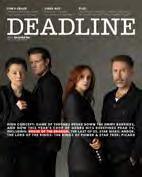
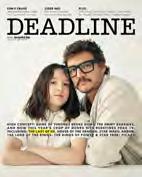
Craft Services

Portrait Gallery: Contenders Television
On The Covers
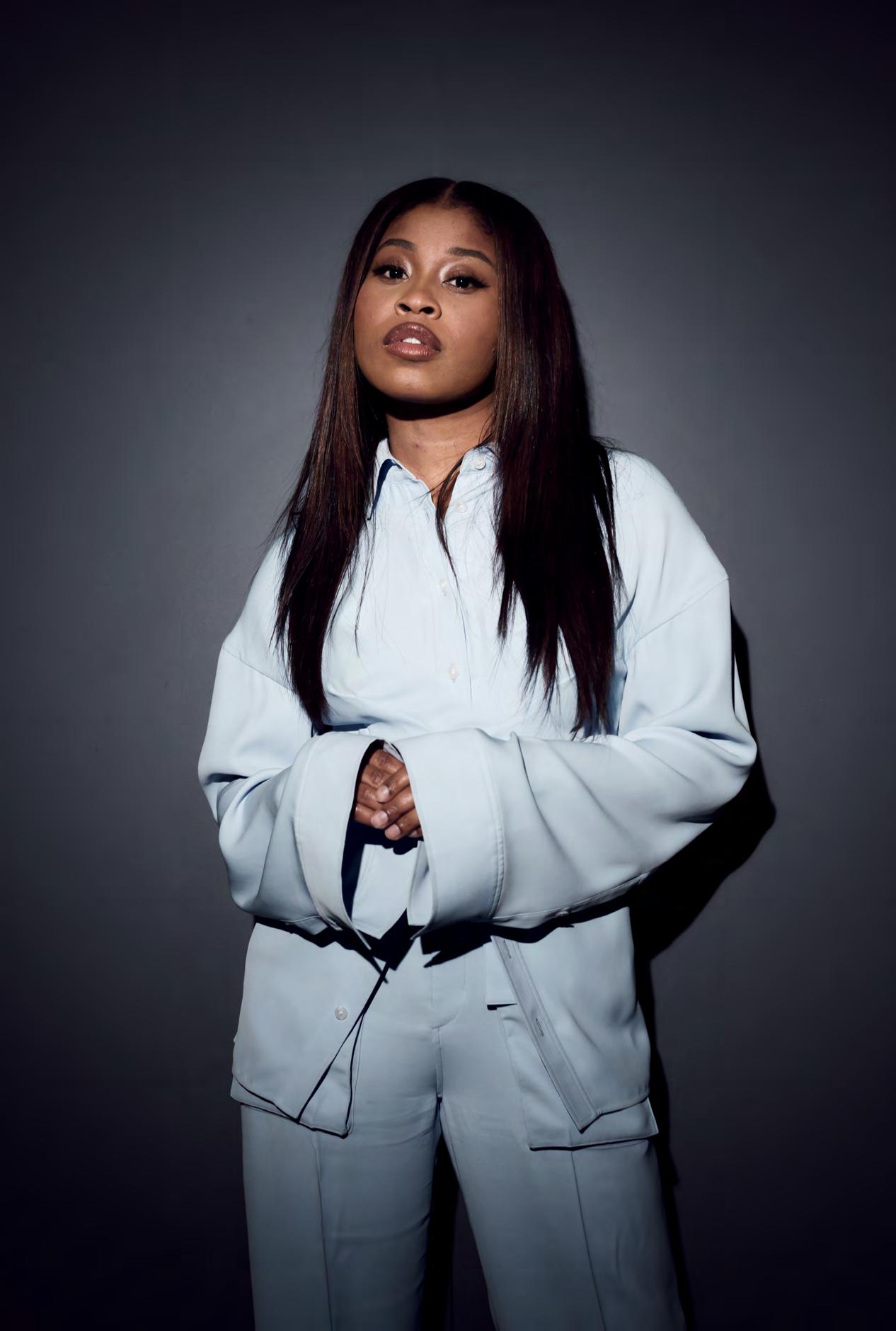
6 MATTHEW MACFADYEN: The secrets of his Succession 10 QUICK SHOTS: Putting the Chilean into Star Wars: Visions and taking the chilly out of Yellowjackets. 12 ON MY SCREEN: Your Honor’s Bryan Cranston rules on retirement, karaoke, Broadway and his desert island picks. 14 FRESH FACE: 1923’s breakout star Aminah Nieves.
16 THE LAST OF US: Meet Pedro Pascal, Bella Ramsey and the rest of the fungi bunch. 22 HOUSE OF THE DRAGON: Burning down the House Targaryen. 28 STAR WARS: ANDOR: Why Diego Luna and Tony Gilroy wished upon a Death Star. 32 THE LORD OF THE RINGS: THE RINGS OF POWER: How they shot J.R.R. 36 STAR TREK: PICARD: Once more unto the brig, with Patrick Stewart and friends. Dialogue 42 MICHAEL CHIKLIS 44 EMILY BLUNT 46 DOMINIQUE FISHBACK 48 EVAN PETERS 50 ELIZABETH DEBICKI 52 KERI RUSSELL
54 LOOK MA, NO JAZZ-HANDS: Choreographers kick up their heels to keep the stories moving.
58 Drama at Deadline’s Emmy event at the DGA Theater in Hollywood.
MICHAEL BUCKNER FOR DEADLINE
Bella
Deadline.
Ramsey and Pedro Pascal (The
Last
of Us) photographed by Josh Telles exclusively
for
Deadline.
Emma D’Arcy, Matt Smith, Olivia Cooke & Paddy Considine (House of the Dragon) photographed by Violeta Sofia exclusively for

F T I A R K S E T
HEIR TODAY,
TOM TOMORROW
As a new CEO ascends the Waystar-Royco throne, the man in the thorny crown, Matthew Macfadyen, reflects on four seasons of Succession
 By Joe Utichi
By Joe Utichi
QUICK SHOTS 10 | ON MY SCREEN: BRYAN CRANSTON 12 | FRESH FACE: AMINAH NIEVES 14 6 DEADLINE.COM/AWARDSLINE GRAEME HUNTER/CLAUDETTE BARIUS/HBO/KEVIN WINTER/GETTY IMAGES
On the Friday after Tom Wambsgans became the new puppet CEO of the Waystar-Royco media empire, the actor who has spent the past five years essaying the character’s ups, downs, and withering one-liners is propping up the bar of a small boutique hotel in London’s Chelsea. Matthew Macfadyen is nursing a lime tonic and contemplating a rest after several months of hard work on Succession’s blockbusting fourth season. In some other world, one imagines his fictional alter-ego is already discovering the poison in the chalice of the job he has spent a lifetime coveting. Macfadyen, instead, is content simply to think ahead to a quiet family dinner, and to reflect on the adventure of his past half decade.
“I’ll miss it,” he says quietly of his time on Succession . “It was such a lovely, lovely job.”
So confidently has Macfadyen brought his character to life through Succession ’s four seasons that it’s hard to recall the unlikeliness of his casting when the show began. The Norfolk-born RADA graduate had never starred in an American series and was better known in his native Britain for his role on the BBC spy drama Spooks [ MI-5 ], and as the stoic Mr. Darcy in Joe Wright’s Pride & Prejudice , the film that first broke him out.
But Succession ’s creator, Jesse Armstrong, himself a Brit, came to
Macfadyen after seeing his work as the capricious Sir Felix Carbury in the BBC’s Anthony Trollope adaptation The Way We Live Now , certain that the actor could find the unbridled ambition of the scheming Minnesotan he had written… if only MacFadyen could master the accent.
“I’d wanted to do an American accent in something,” Macfadyen says. “I’d gone through pilot season hell once, and it wasn’t fun. Even if you’re known, if you haven’t done an American accent in something, people won’t put you in front of the networks.”
The part in The Way We Live Now had also afforded Macfadyen a chance to play comedy. “I’d done so much serious stuff on TV, but I think Jesse saw that and thought, ‘Oh, he can do comedy too.’”
The accent was no big stretch for Macfadyen, who had played American on stage, and he fell in love with the pilot script as quickly as audiences would. With a young family, Macfadyen hadn’t wanted to commit to a series in Los Angeles, but Succession would film in New York (and eventually travel the world). “It was this brilliant, New York, sexy HBO thing,” he laughs. “But you never know how it’s going to land. I thought I might only be in it for one season, and Tom was barely in the pilot.”
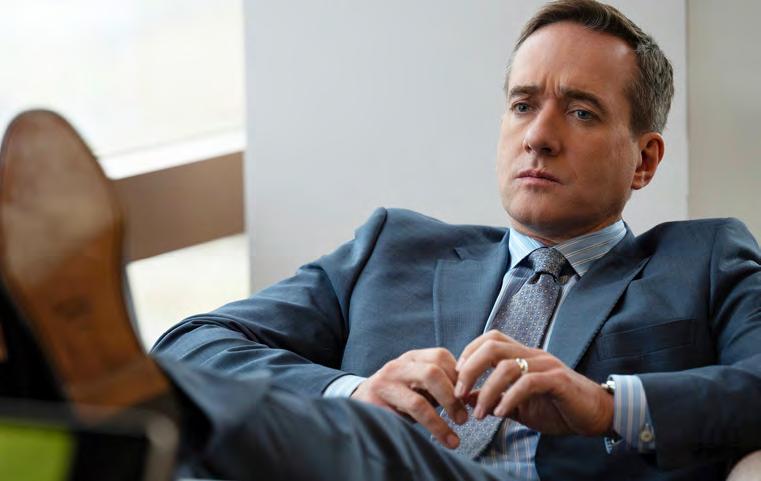

Adam McKay directed Succession ’s first episode and established the
show’s blend of comedy and drama by bringing across his improvisational process, banking a scripted take and then encouraging his cast to riff on the dialogue, throwing in new belittling wordplay for them to seize on. “Tom in the pilot script wasn’t necessarily the Tom that emerged,” says Macfadyen.
The making of the character happened during the pilot shoot, on a cold neighborhood baseball diamond to which Logan Roy (Brian Cox) had choppered his extended family after a birthday celebration. As his mischievous son Roman (Kieran Culkin) is taunting a young boy with the offer of a $1 million check for a home run, his son-in-law, Tom, introduces himself to Cousin Greg (Nicholas Braun), who is trying to crowbar his way into a job with his uncle’s company.
“I’ve got my eye on you,” Tom tells Greg. “You need any help, advice, just, you know, don’t fucking bother, OK?” As Greg’s smile drops, Tom laughs at him. “I’m only razzing you cuz. You’re dreaming, honestly. I may look really fun, but the thing about me is I’m a terrible, terrible prick.”
As Greg discombobulates further, Tom cackles. “I got you again! Seriously… pals, yeah?” And then the scene veers off script, as Tom tests his new protégé. “Would you kiss me? Would you kiss me if I asked you?
If I told you to?”
“I think they saw me and Nick together and thought, ‘Oh, this could be good,’” says Macfadyen, on the moment that would set the stage for one of the show’s most beloved dynamics. “You’re there, you’re responding to things on the day. Greg’s an interloper, Tom’s an interloper, and they’re both sort of ingratiating themselves. There was an instant something there.”
Macfadyen reflects on the joy he found with Braun especially, riffing on ways for Tom to torture the hapless Greg in each of the show’s episodes. Even in the finale, Greg can’t get it right, as Tom blows up at Greg in a bathroom, pushing him up against a wall for risking his new job, and receiving a slap back. But Tom can’t quite bring himself to ditch his favorite punching bag. “You fucked it, man. You are a fucking piece of shit. But I got you. I got just enough capital. I got you.”
“We’d get a freebie take at the end of every scene,” Macfadyen says. “They’d feed you extra lines, you’d do alt lines. It was just bliss as an actor. The alts were
Macfadyen accepting his Supporting Actor trophy at the Emmys.
DEADLINE.COM/ AWARDSLINE 7
Matthew Macfadyen as Tom Wambsgans in Succession .
so funny, and there were sometimes 20, 30 alternates that wouldn’t make it through.”
If mobsters love The Sopranos and Washington politicos love The West Wing , despite both shows making no effort to present those classes in a wholly positive light, it’s a safe bet that Succession is a favorite of media tycoons the world over. The show hasn’t afforded Macfadyen much opportunity to walk in those circles, he says, but he does recall the challenge even its writers faced in trying to comprehend the obscene levels of wealth and lifestyle Succession portrays.
“On the pilot, we had a sort of wealth consiglieri— who I think we retained throughout—who operated in that world and would give production tips on what
rang true and what didn’t,” he says. “One of their first notes was to ditch all the coats and gloves and scarves from wardrobe, because when you go from your private plane to your car to your penthouse, you don’t need to be swathed in cashmere.”
Macfadyen has never been able to wrap his head around such one percent behaviors, but he says it didn’t matter. “I don’t have a plan for my life. I can look back and go, ‘Oh, I did that because I was scared,’ but I didn’t know that in the moment. I think that’s quite a good understanding to have as an actor, because you don’t need to come in knowing all the answers.”
After all, Tom doesn’t fully know why he does the things he does. “I think that’s the real brilliance of Jesse’s writing, and all the other writers plugged into that.” Macfadyen can’t rationalize why Tom might take the job as CEO, having been told, explicitly, that he was being hired as a “pain-sponge” for a tech entrepreneur’s sociopathic whims.
Does he do it to level the playing field with his on-again, off-again spouse Shiv Roy (Sarah Snook), to whom he’s always been the pauper invited to the feast? “It makes sense,” Macfadyen considers. “But it only makes sense when you look at the whole, and I don’t think he’s able to do that. The only way to survive in that world is to think moment-to-moment.”

The decisions being made, simply, are too big, and too earth-shattering, to be well-considered. “Yeah, because otherwise you wouldn’t be able to move.”
Tom Wambsgans is not an easy character to love. Few of Succession ’s ensemble of avaricious power players are. But Macfadyen will miss him. “I feel a mixture of relief and heartbreak, I think,” he says, less than a week out from the show’s final episode having aired. “I wouldn’t want to play the same person forever. None of us do. Inevitably, you find yourself playing familiar beats. But I’ll miss the writing. I’ll miss Jesse, and Tony [Roche], and Lucy [Prebble]. I’ll miss the cast, and I’ll miss the crew.
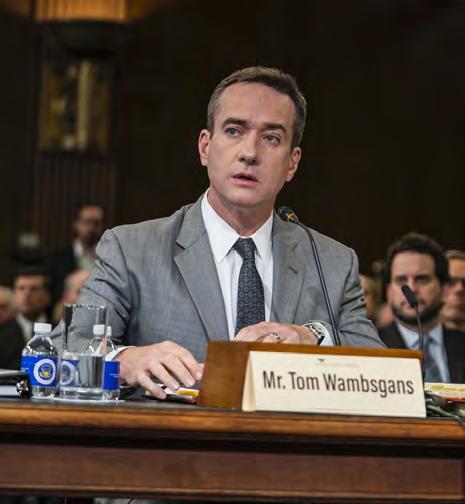
“Watching Episode 9—Logan’s funeral—was hard for me. Tom is barely involved, and so I was really watching it. I found it enormously upsetting because I do feel a part of that family. It was like, ‘There are all of my buddies, and they’re all so amazing.’” A
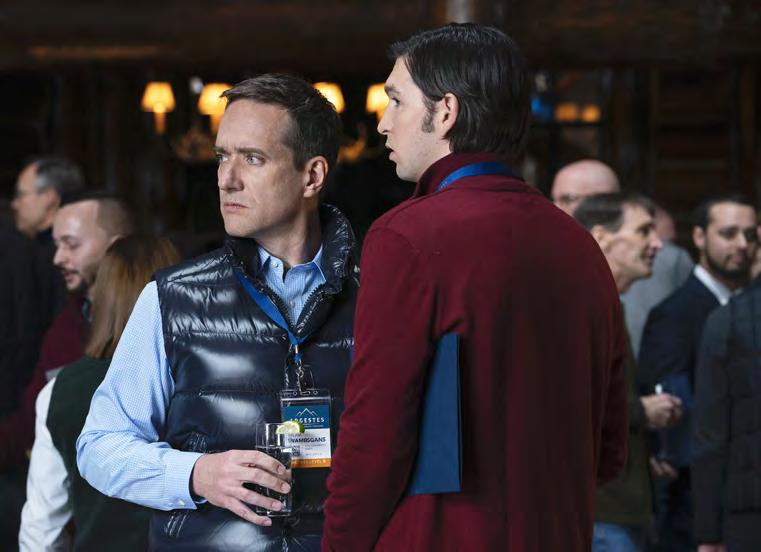
FT CLOSE-UP
8 DEADLINE.COM/ AWARDSLINE
Left: Macfadyen with Nicholas Braun; below, as Wambsgans testifying at a Congressional hearing.
DAVID RUSSELL/ZACH DILGARD/PETER KRAMER/HBO
Macfadyen with Sarah Snook.

At press time, here is how Gold Derby’s experts ranked the Emmy chances in the Best Drama Series, Drama Actor and Drama Actress races. Get up-to-date rankings and make your own predictions at GoldDerby.com
“In the Stars” director Gabriel Osorio on bringing Patagonian influences to Star Wars: Visions
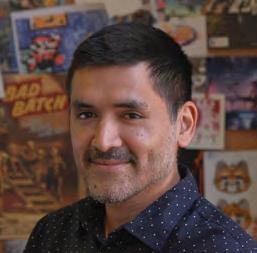
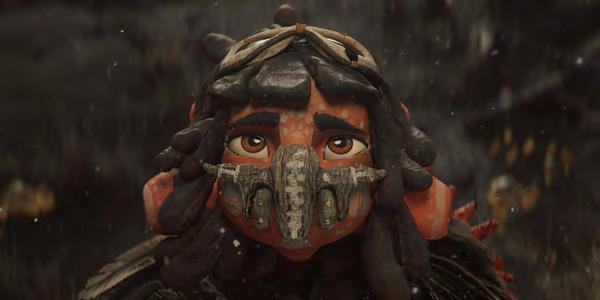
As an animated anthology series, Star Wars: Visions gives animation studios from around the world an opportunity to bring their perspective and inspirations to the Star Wars universe. “The most important inspiration for us was the story of the original nations of Patagonia,” says Chilean director Gabriel Osorio. “They were one of the last nations in South America that was colonized.”
Osorio’s episode “In the Stars” follows two sisters living in hiding from the invading Empire. As the last of their kind, they must fight back when they are discovered. Using the Empire as a colonizing force, Osorio brought in elements of the actual story of how Patagonia was colonized. “They were hunting people,” he says. “It was a very rough, terrible story of colonization.”
The short gives the

Global Warning Cold Comfort
them on their hands for gloves and repurposing sweaters as beanies around their head,” she says.
appearance of a stop-motion animation, but Osorio says that it was mostly computer generated. “It has the flavor that it looks handmade,” he says. “It was very important for us to have that handcrafted feel because it connects us more to the nature of what we are talking about.”
Although the episode was directly inspired by colonization in Latin America, Osorio says the story is much more global. “We feel that this is the same story that has repeated, not only in Latin America, but in every country that has been colonized.”
“As a team, this is very personal to us,” he says. “So, I felt that this was the perfect place and perfect universe to tell this story.” —
Ryan Fleming
girls don’t have the skills and it shouldn’t look like it was well done.” —Ryan
Fleming
How costume designer Amy Parris kept the Yellowjackets team warm in the harsh winter
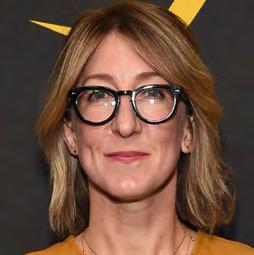
For Natalie, the hunter of the group, Parris added a layer of a faux deer pelt to keep her warm on her hunts. “We found a fake deer skin rug, and repurposed it with a latex treatment that made it look muscly and sinewy,” she says. “It looks like a crude version of a hide being tanned, because these Joining in the second season of Yellowjackets , costume designer Amy Parris was tasked with creating the winter apparel for the stranded soccer team. “I tried to find layers that were believable,” she says. “They didn’t land in the winter, they landed in the spring and summer, so they weren’t prepared with heavy winter coats.” She found that the girls would most likely need to repurpose the clothing from their suitcases. “They’re cutting holes in the socks to put

1 Jeremy Strong Succession ODDS 9/2 2 Bob Odenkirk Better Call Saul ODDS 5/1 3 Pedro Pascal The Last of Us ODDS 5/1 4 Kieran Culkin Succession ODDS 13/2 5 Brian
Succession ODDS 17/2
Cox
Drama Series
Charted Territory
FT QUICK SHOTS FRANK MICELOTTA/SHOWTIME NETWORKS/LUCASFILM LTD/DISNEY+
Star Wars: Visions
10 DEADLINE.COM/ AWARDSLINE Drama Actress 1 Melanie Lynskey Yellowjackets ODDS 39/10 2 Sarah Snook Succession ODDS 11/2 3 Bella Ramsey The Last of Us ODDS 6/1 4 Imelda Staunton The Crown ODDS 13/2 5 Emma D’Arcy House of the Dragon ODDS 11/1 1 Succession ODDS 9/2 2 The White Lotus ODDS 6/1 3 The Last of Us ODDS 13/2 4 Better Call Saul ODDS 8/1 5 The Crown ODDS 10/1 Drama Actor
Yellowjackets

BRYAN CRANSTON
The veteran star of Your Honor is too busy acting, writing, directing and producing to find himself a hobby
By Antonia Blyth
In the second and final season of Showtime series Your Honor , Bryan Cranston reprises the role of disgraced judge Michael Desiato. At the end of Season 1, Desiato’s son was murdered by the Baxter crime family, and fresh out of prison himself, Desiato not only seeks to avenge his son’s death but to rediscover his own moral compass and find some kind of redemption. It’s another nuanced performance in a storied career that includes such roles as the inimitable Walter White in Breaking Bad and Better Call Saul , the titular character in Trumbo , Hal in Malcolm in the Middle and Stan in Little Miss Sunshine . Here, Cranston muses on his French country retirement plans, explains the glaring absence of karaoke in his life, and reveals his dreams of making a Broadway musical and why his desert island TV picks definitely won’t include Breaking Bad
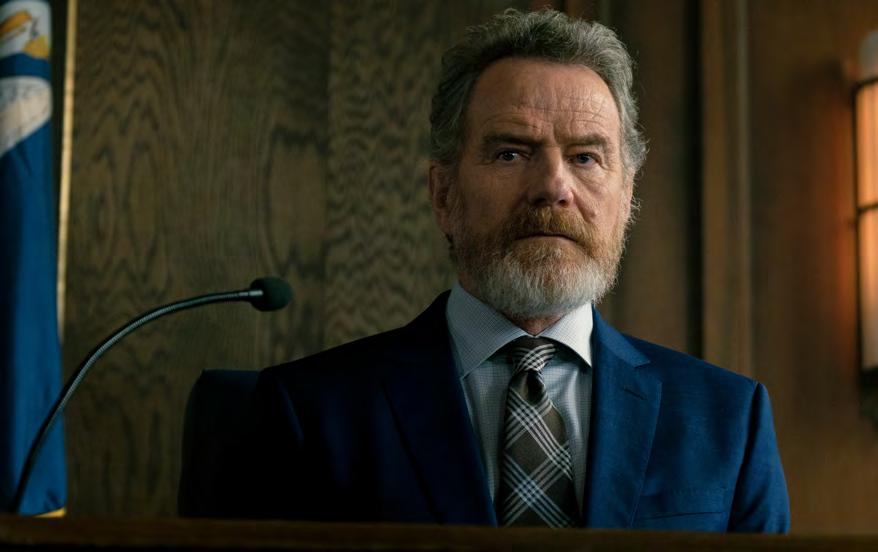
My First Film Lesson
Don’t be late. Be on time Know your work. Be respectful. I remember I got a job on Days of Our Lives . This was one of my first jobs, so it was 1979, I think, or 1980. And back in those days, you set an alarm clock, and apparently I forgot to pull out the pin of the clock, and slept through it. I just had the worst day. And I panicked and ran to the studio. I lied that I got a flat tire. I was so embarrassed. And every moment that I was on the set, I felt like I was behind, and even though I was apologizing profusely, it just felt terrible. Being late is just not a good thing. That’s happened again because of other
circumstances. So, that, being friendly, being kind, and knowing your work, going in prepared, coming in with ideas, that’s the thing I would tell young actors.
The Best Advice I Ever Received
The thing that’s coming to mind now is how to live . Forty years ago, I was doing another soap opera in New York
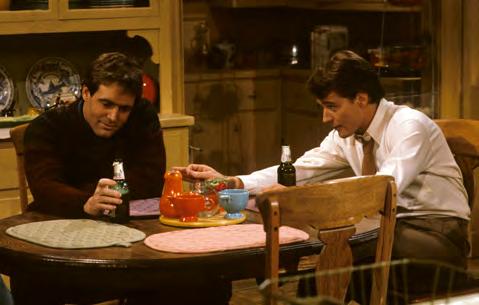
[ Loving ], and I worked with a dear friend of mine, James Kiberd. He studied the Alexander Technique, which is a way of breathing and stance and presence. It’s very, very intense, but a curious and interesting discipline. And [creator Frederick] Alexander had a quote: “If you only do what you know, you will never do what you don’t know.” And I think that’s really good.
Loving
The Part I Always Wanted
I want to do a Broadway musical , because it scares the daylights out of me. I need to take chances to go into something that is not my comfort zone and see what happens. And it may be that I don’t like it. I remember, I was asked to do a narration of a book called The Things They Carried Tim O’Brien is the author. This is during Breaking Bad years, and I’m getting into the booth to read the entire book. And I realized, I’m not really that good at this. This is much more difficult than I thought. I don’t have the talent to do this, or the ability. and perhaps, I think I have a learning issue, and I invert lines—Dyslexia. The engineer would say, “OK, can we read that sentence again?” I’d go, “Oh, OK. Why? Is there an emphasis you wanted?” “No, you just inverted this. You left out this word. You changed that word.” And I was like, “I did?” And I wouldn’t even know.
The Most Fun I’ve Had On Set
On a movie called
Why Him? With James Franco, Zoe Deutch, Keegan-Michael Key and Megan Mullally. We just had a blast every day. It was already a funny script, and every day we’d go and we’d say the funny lines, and then we’d improv and make up things trying to crack each other up. Every day was just a joy, and I loved those people I worked with. I look back at a lot of the things I’ve done, and while I have tremendous respect and gratitude for doing them, it wasn’t necessarily the most fun on the set. It could be so physically demanding or so intense and heartbreaking, and your body goes through that—and I truly believe tha t your body doesn’t know if you’re pretending. There is this emotional damage happening, and fear and anger and r age—you have that exhaustion afterward.
The Films That Make Me Cry
I think the first one that made me cry back when I was a boy was a movie called Brian’s Song , which got every man to watch it because it was about football. It was about Brian Piccolo, a
12 DEADLINE.COM/ AWARDSLINE ABC PHOTO ARCHIVES/GETTY/SHOWTIME/EVERETT COLLECTION/20TH CENTURY FOX/AMC/KARWAI TANG/WIREIMAGE/MARK PIASECKI/FILMMAGIC
FT ON MY SCREEN
Your Honor
football player with the Chicago Bears, and he had a terminal illness. It was about his friendship with another player on the Bears called Gale Sayers, and men bonding. So, it’s James Caan and Billy Dee Williams, these two grown men, athletes, who were like brothers. One was Black, one was white, and they bonded, and it was the turbulent ’60s and the race riots. After James Caan’s character dies—spoiler alert—Billy Dee Williams, as Gale Sayers, goes up to the microphone and in his own beautiful way, says these words: “I loved Brian Piccolo.” To see grown men, athletes, all machismo, say, “I love another man,” and nobody was making fun of that. Just, your tears came out. And I realized at that moment, rela -
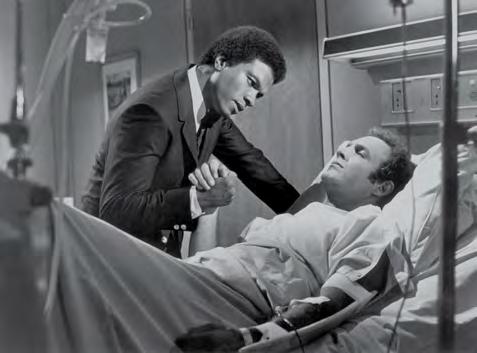
tionships are different in all different kinds of ways.
The Character That’s Most Like Me
In Why Him? I carried something like that, because it was about the father of a daughter and being overly protective. There was some cadence to that. Isn’t that funny? I think probably someone more objective… I mean, I wonder what my wife would say would be the character most like me?
My Most Quoted Role
It’s definitely Walter White [in Breaking Bad ]. There are several different iconic phrases, I guess. “I am the danger,” and “Say my name,” are the two most common ones.
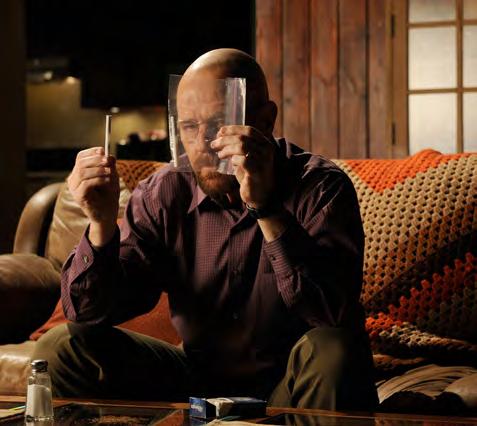
My Toughest Challenge
I think it’s always been finding balance . Honestly, I write, I direct, I produce and I act, and I have no other time to do anything else. So, if someone says, “Well, what do you do? What’s your hobby?” I go, “Oh, I don’t have a hobby.” “Do you collect things?” “Nope.” “Do you make sure you play golf?”
“No, don’t play golf.” Nope, nope, nope, nope. I’ll go to the gym and I’ll run, but that’s because I need to maintain and all that. And I don’t know how to cook.
My Bucket List
One of the things that I’m going to do with my wife, after I turn 70, which is only three years from now, is I’m going to push the pause button on my career and go away to a foreign country for about six to eight months, minimum. Immerse myself in the language, the culture and the life. It’s not a vacation, it’s living. And we’re going to rent a house and we’re going to go on bike rides and we’re going to make new friends, and I’m going to learn how to cook, and
My Karaoke Playlist
Breaking Bad
I’m going to learn the language, and I want to read at least some of the classic books that I’ve always threatened to read. I think somewhere in France.
My Guilty Pleasure
It’s not guilty at all but I’m a big baseball fan I don’t go to that many games anymore, but I’ll watch it on television. I’m a Los Angeles Dodgers fan and always have been. So, I’ll watch the occasional baseball or football game, or basketball game, but I’m always doing something else. I’m answering emails and looking up. It’s like, I feel like I have to be productive in some way while watching a sporting event.
Who’d Play Me In My Biopic
Maybe Domhnall Gleeson or someone Irish-y and fair-haired. I’d be honored. He’s such a good actor.
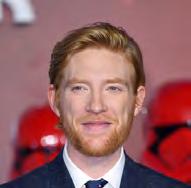
I’ve never done karaoke. Remember I said I don’t have a hobby? I’m too busy, so I’ve never done it. Isn’t that something? I think, if I were to do it, I would choose something that could be c omical, that would make people laugh, as opposed to, “Hey, let’s listen to him and see how his voice is.” I would probably just try to do something funny
My Desert Island Film &
TV Shows
The requisite Godfa -
thers have to be involved. It’s just superb filmmaking. Sc orsese films. Tarantino films. And then, also going back and looking at Altman and Truffaut. Kurosawa is another filmmaker I love. And then, hopeful films, because you’re on a deserted island, like It’s a Wonderful Life
A television series? I watch my own stuff once and then I don’t really watch it ever again. I’ve only seen every episode of Breaking Bad once but that’s it. Same thing with Malcolm in the Middle A
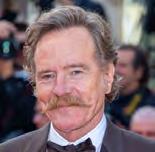
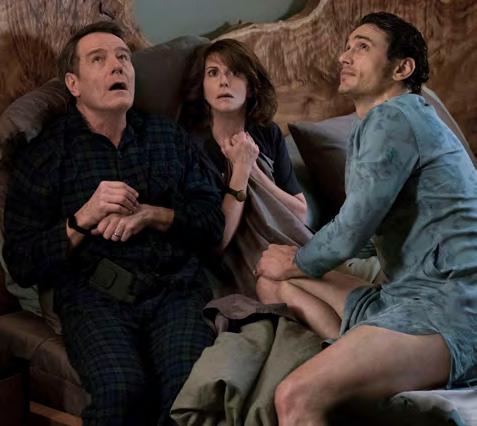
It’s a Wonderful Life
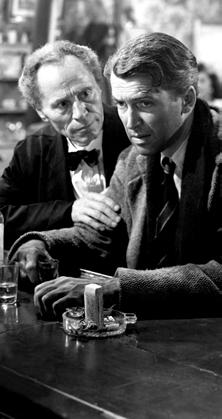
DEADLINE.COM/ AWARDSLINE 13
Brian’s Song
Why Him?
FRESH FACE
By Lynette Rice
WHO
Aminah Nieves
Age: 25 Hometown: Hammond, Indiana
WHAT
Newcomer Aminah Nieves plays Teonna Rainwater, a student—or rather, prisoner—of a Catholic boarding school in Montana. In 1923 ’s authentic depiction of how the church dehumanized indigenous youths while trying to assimilate them into European American culture, Teonna rages against—and ultimately escapes—her brutal captors. “I was scared a lot,” the actress recalls of her first season. “I wanted to make sure I was honoring every single human, every single family member, my grandparents, my aunties, my mom, my dad and then all of the communities. I’m so happy that I’m here and doing it and being a voice.”
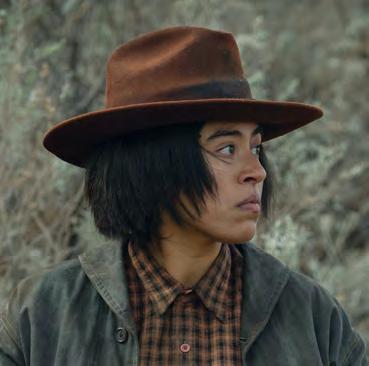
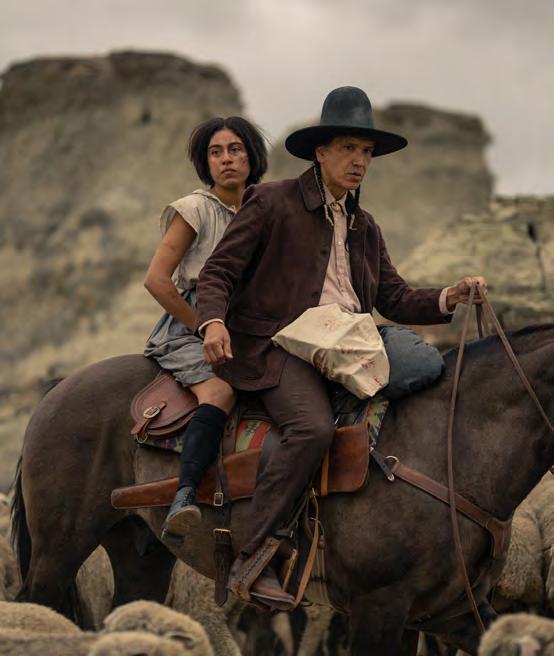
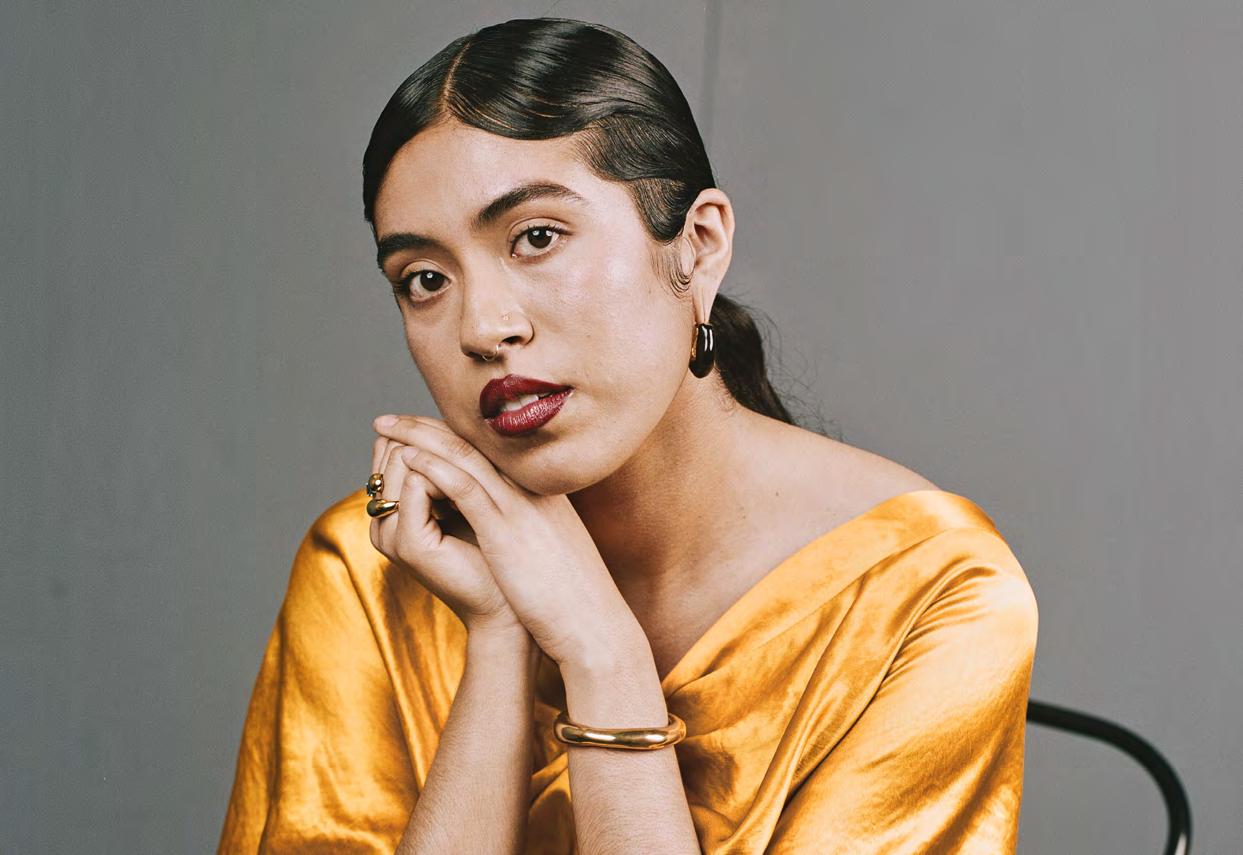
FT FRESH FACE
MICHAEL BUCKLEY FOR DEADLINE/EMMERSON MILLER/CHRISTOPHER SAUNDERS/PARAMOUNT
14 DEADLINE.COM/ AWARDSLINE
From left: Aminah Nieves; Nieves and Michael Greyeyes.
WHY
Joining 1923 was the realization of a dream she’s held since grade school. After appearing in the requisite school plays, Nieves traveled to New York, where she booked background actor jobs while making ends meet as an herbalist, doula and working at a clothing store. But her big break never came, so she quit all of her gigs and moved back to her parents’ house with only $21 to her name. Fortunately, her manager never lost faith. “We talked a lot about my expectations and my strong ability to say no, because I’m not going to do something that feels icky or doesn’t feel good in my body. He was honest that there isn’t a lot out there, but he was going to try to get me into every room possible. He only submitted me for leads. I was only with him for eight months before I booked 1923 .” But it wasn’t the easiest decision to accept the part. “I read it and was emailing my manager, ‘I don’t know, man. I don’t know if I should do this. It’s just heavy and triggering.’ My manager was so supportive and said, ‘You know what? I support anything you do, so whatever decision you make is a good one.’ My mom is my reader for everything. We talked about it a lot. I did the audition the day it was due because I waited so long. I was scared. My mom was like, ‘Aminah, you have to do this, not just for you, it’s for us. It’s for our communities and for all indigenous peoples across the world.’”
WHEN & WHERE
Though her character’s tragic journey is far from over, Nieves is eager to see what Season 2 of 1923 brings. More than that, she’s appreciative that her breakout role has made such an impact on viewers. “From what my family says and from what other cast members and their families are saying, it’s really great feedback,” Nieves says. “People have told me that it’s given them the opportunity to be more open with what is happening [within the community]. I think that’s the whole reason why we do this art, to share honest and real stories that spark curiosity and help people feel safe. Having a moment to see yourself and to feel the strength to talk about certain things is super important. That’s all I wish for—sharing these stories that make people want to do a Google search to see what really happened.”
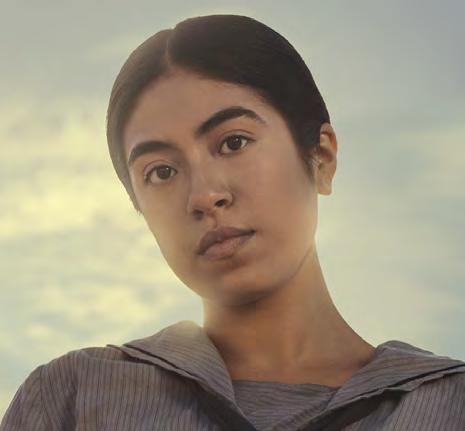
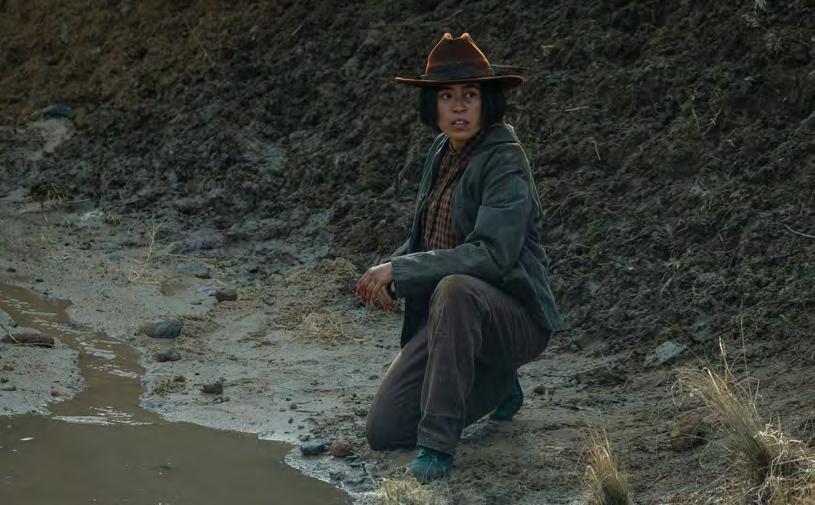
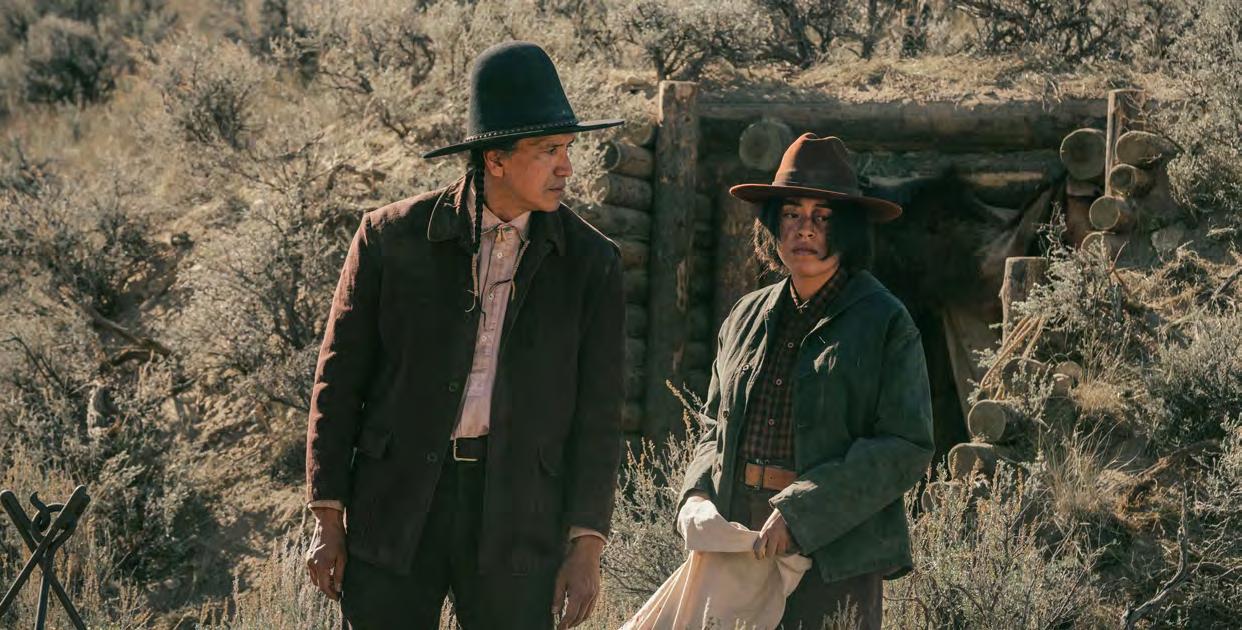
A
DEADLINE.COM/ AWARDSLINE 15
Below and bottom: Neives as Teonna Rainwater; with Greyeyes as Hank in 1923
HBO’S THE LAST OF US CONJURES A POST-APOCALYPTIC HELLSCAPE IN WHICH NATURE HAS RECLAIMED OUR CITIES AS HUMANITY BATTLES A FUNGAL PANDEMIC. STARS PEDRO PASCAL AND BELLA RAMSEY EXPLAIN TO DESTINY JACKSON WHY THE SHOW IS ABOUT HUMAN SURVIVAL, NOT THE INFECTED.
Photographed by Josh Telles exclusively for Deadline



16 DEADLINE.COM/ AWARDSLINE
House of the Dragon
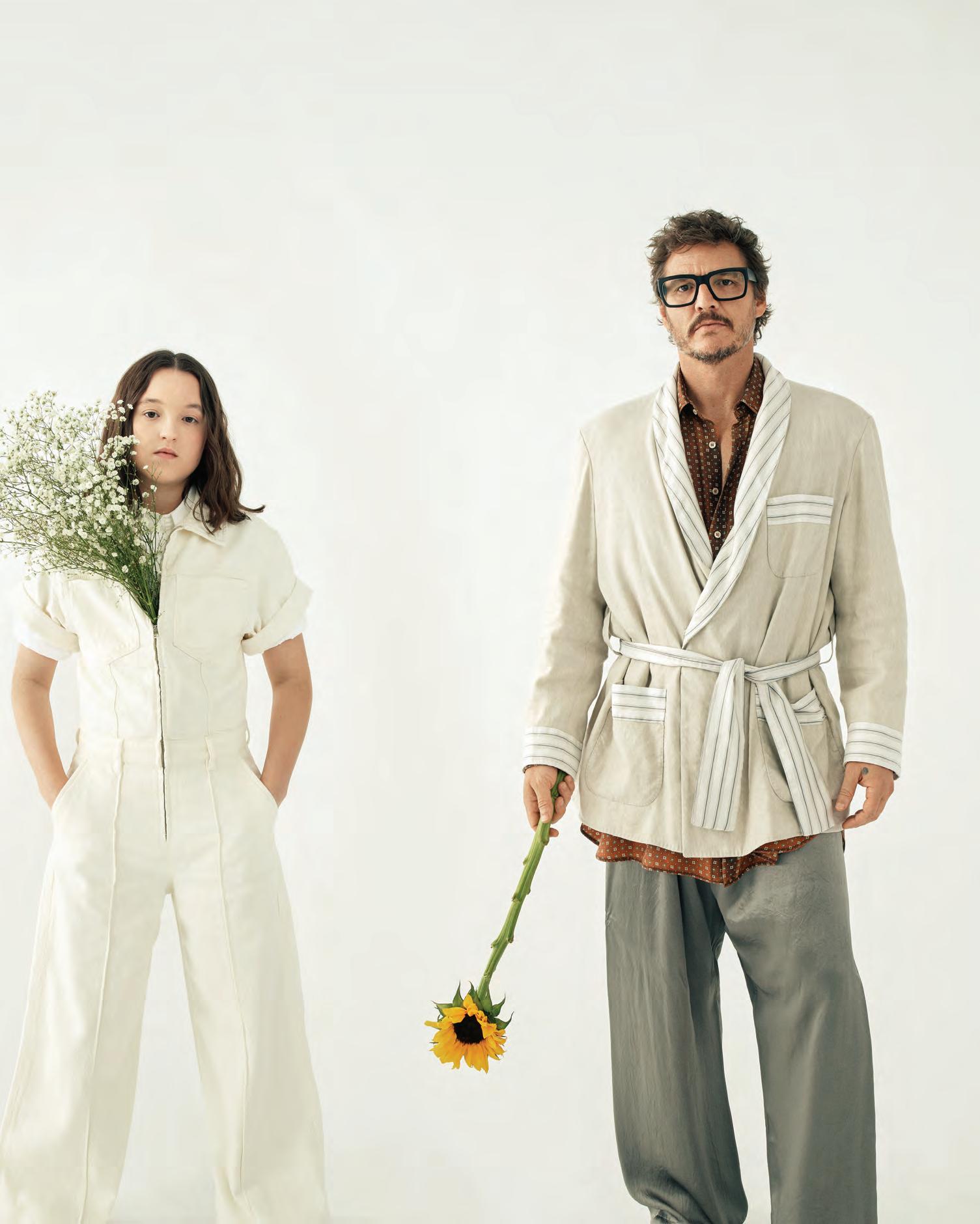
Star Wars: Andor The Lord of the Rings: The Rings of Power
Star Trek: Picard
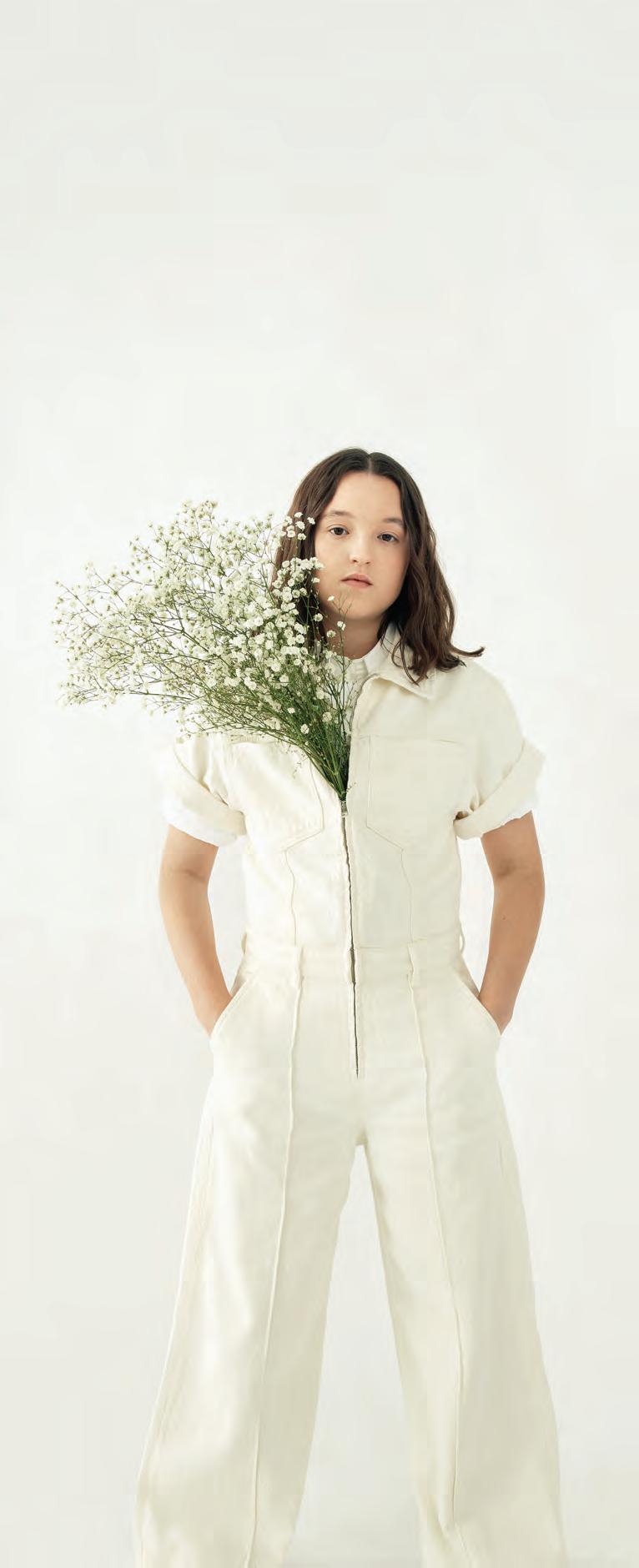
The Last of Us
In HBO’s hit series the end of the world as most of human ity knows it, but Pedro Pascal and Bella Ramsey feel just fine. Long gone are the traces of the hardened survivor Joel (Pascal) and the teenage spitfire Ellie (Ramsey), who must endure the collapse of modern civilization due to a deadly mutable fungus that turns people into zombie-like creatures. Well, sort of. Comfortably sat within the confines of a secluded lounge at the Directors Guild of America, the pair are swapping inside jokes and bursting with laughter. While Pascal trades in Joel’s stoicism for passion, Ramsey can’t quite shake the penchant for Ellie’s habitual cussing.
For what they don’t share with their characters in terms of post-apocalyptic misery, they speak with similar thoughtfulness as they describe the vulner abilities of Joel and Ellie’s partnership, and of their experience working on the widely popular video game adaptation created by Neil Druckmann (who also created the game) and
While the world at large knows them as the onscreen daddy-daughter duo, it’s clear that their bond has also transcended offscreen into something special, and the pair are thick as thieves.
Despite The Last of Us being a wildly popular video game series, you’ve never played it. And yet, here you both are on the TV series. What made you say yes?
BELLA RAMSEY: Well, they offered it to me, so I said yes because I wanted to do it.
PEDRO PASCAL: I didn’t know what the game was, but HBO had sent the scripts over, and I was put through a process of auditioning. Not a terribly arduous one, but one that had to be related to having read the scripts. I realized in reading episodes 1 and 2, that once Joel met Ellie, it was a part that you undeniably had to chase and play.

I was blown away by the world of it. And though I wasn’t familiar with the game, I was familiar with Bella, and with Craig Mazin, and I wanted to do it. It intercepted me in a very specific way. I had a plan for the next couple of years, and within a 24-hour period, this project intercepted everything because of how special I thought it was. And then I found out that it was this big fucking popular game that people lose their minds over.
RAMSEY: Yeah, that was exactly it. It was a lot.
Describe your first meeting with one another. How did you approach having to build this rela tionship of faux father and daughter in a way?
PASCAL: I think it’s surreal [looking back at it], the amount of pressure we felt that was not imposed upon us at all. If anything, I feel like it was inappropriate that they hadn’t asked us to do more. What I mean is I met you simply because you were coming to get your hair cut in the trailer and not because you were coming to meet me or that Joel and Ellie were going to meet.
RAMSEY: Right. It was a byproduct. You were on your lunch break.
18 DEADLINE.COM/ AWARDSLINE
PASCAL: It was this byproduct because we were shooting the first episode, and then you had arrived, and you were—everyone was—put in quarantine and borders were still closed. And there were very important protocols being abided by, and that could be a big part of it. But there was an artful part of not really trying to force anything to happen and the feeling of the confidence of casting, which I found to be utterly delusional [laughs]. I was like, “How could you know that you’d have a hit casting me with Bella?” Like, how did they know? Somehow, they did. And I think through a form of real decency [and eagerness] to start, we cared very much how the other felt. And that gradually brought us to a bond that is very deep. Plus, Bella is a Libra, and I am an Aries, so that means polar opposites just attract, we complement one another.
RAMSEY: There was no bonding. It was very much showing up on set as just who you are.
PASCAL: We didn’t have a choice. And I feel like we did—in an unspoken way—by taking one another’s cues and not putting pressure on one another, and yet still hoping that she approved of me or vice versa.
RAMSEY: Exactly. It was like, here, meet the person you’re going to spend the rest of the year with. And that’s cool, and I think it worked out. I think our relationship grew and developed as Joel and Ellie’s did. No, actually, Joel and Ellie initially were very estranged and had a lot of anger and resentment towards one another. We didn’t have that. We were just shy of each other. And now that I think about it, us being trapped in the car together for episode 3 did a lot for us.
PASCAL: Yeah, that and the walking. [There is] so much walking.
RAMSEY: So much walking. Do you remember you wanted to rename the show, Come Walk With Us?
PASCAL: Just Walk With Us. Because we were on that trail [in episode 3], and we had to go back to the beginning of it every single time. It was a long-written scene, and the sun was blazing.
Craig Mazin’s screenplays are unique and so meticulous that he even includes a character’s inner thoughts as dialogue on the page. As actors, what was your experience like working with such highly-detailed material as opposed to something
a little less structured?
RAMSEY: [The process] was so easy, and I think we were very supported by them and held by the writing and the detail. There wasn’t a moment that I was unsure of who the character was. And yeah, he writes character thoughts in the stage directions, which I loved. They were the best scripts I’ve ever read. Craig hates praise, he hates being told that he’s good, but he’s a genius.
PASCAL: [Incredulously] He loves it! He absolutely, period-ly loves it.
RAMSEY: I strongly disagree.

PASCAL: He needs it.

RAMSEY: He needs it, but he hates it.
PASCAL: Don’t let him trick you into thinking he hates it. He loves it. And we all fucking love it and hate it. The interesting thing—and I think probably the thing that got the most pushback from me—were things in terms of points of confusion and where there is such a reliable portrait on the page. He is, I think, unwilling to confess to how specific it is to him as far as the page is concerned. And so, in moments of pushback, he’s very patient, and I found a very unexpected way of discovering that he was right.
Was there a particular scene that you had to work through together?
PASCAL: There’s plenty of instances that felt awkward to me, where a character moves from one moment to another as far as the language was concerned. And then once I questioned it, and then by questioning it, was invited into a collaborative conversation about it, I was made to think about it a little bit longer instead of just having a response. Thinking about it a little longer, I was like, “Holy fuck. He’s right.” You know what I mean? Craig would say, “This is how it should be, and it does make sense.” And I’d eventually [realize], “Yeah, it makes perfect sense.” Bastard [laughs].
What aspects of yourselves do you see in Joel and Ellie?
PASCAL: We’re both assholes [laughs].
RAMSEY: Well, there’s lots of similarities for me. I feel Ellie came very naturally to me, and I didn’t have to really try very hard. My American personality is
“With The Last of Us, it’s a little scary. Because we are going into Season 2 with the way that it’s already been received, it has already started with a certain amount of pressure. ”
DEADLINE.COM/ AWARDSLINE 19
—PEDRO PASCAL
Ellie because I learned the American accent through Ellie’s dialogue. So now, whenever I speak in an American accent, for whatever reason, I become Ellie. I swear in an American accent, too. In my own [British] accent, it just sounds wrong, the words don’t come out properly, and it trips me out. But I’ll happily call you a motherfucking asshole or dumbass [laughs].
PASCAL: Wait, is this the first time you’ve ever done an American accent for a job?
RAMSEY: Properly, yeah. I did one job where I had one but barely spoke with an accent. So, this is the first proper time.
PASCAL: Wow. Who do you think you are, nailing everything?
How did you both get through some of these harrowing emotional scenes together?


RAMSEY: I would repeat the things that Pedro would say to me back to him. All the wisdom that he’s given me, I just spew it back to him, and he’d be like, “Wow.” And I’ll be like, “Well, you told me first. It has all come from you.”
PASCAL: We definitely complimented each other’s mood systems. And granted, we can lean into this kind of conversation, but we’re fucking angels by comparison, I think [laughs]. But in a place of sensitive awareness, if she was feeling incompetent or I was feeling incompetent— because that’s what it ultimately comes from, your fear— whenever we were afraid, we couldn’t be afraid together.
RAMSEY: No.
PASCAL: We couldn’t be afraid at the same time. We were afraid together the entire time. But we couldn’t…
RAMSEY: …be occupied by fear.
PASCAL: If Bella was afraid, I had to see that from the outside and know that she had nothing to fear. And it was very mutual.
RAMSEY: I remember [when we filmed scenes] in the car in the studio, there was so much going on outside of the car. I remember us being like, “It’s just the two of us. Just forget about everybody else, this is just our own world.”
Bella, you’ve said before that you almost rejected the role because of the potential levels of fame and attention it could bring. In the aftermath of the show, how are you dealing with that?
PASCAL: Your instincts were right.
RAMSEY: Yeah, I know, right? It’s been a mixture of things. I keep thinking that I’ve adjusted, and then something new will happen and I’ll have realized I’m not adjusted at all. There’s been a lot of really lovely positive reactions, and most people that come and say hi are very sweet. But I think when it’s just happening so much, it can get tiring, and you can slip into feeling like more of an object than a person. That’s one of the biggest things. It’s scary sometimes. And also, what I find hard is the knowledge that [fame] is never going to be less than this now. I can’t reverse it.
PASCAL: You’ve crossed a threshold.
RAMSEY: Yeah. And there’s no way back, even if I quit acting, which I’m not going to do, but even that won’t cure it because I’ve already crossed the threshold. I’m learning to accept it in terms of traveling, which I enjoy particularly, and doing lots of press. But recently, I’ve been like, “Well, this is it. This is my life now.” And I just have to get on with it and deal with it and accept it. And this acceptance does a lot for me rather than trying
From top: Pedro Pascal as Joel Miller and Bella Ramsey as Ellie Williams in The Last of Us ; Pascal and Ramsey in the season finale “Look for the Light ”.
“There’s been a lot of really lovely positive reactions, and most people that come and say hi are very sweet. But I think when it’s just happening so much, it can get tiring.”
20 DEADLINE.COM/ AWARDSLINE LIANE HENTSCHER/HBO
—BELLA RAMSEY
 Bella Ramsey styled by Fabio Immediato /The Only Agency
Bella Ramsey styled by Fabio Immediato /The Only Agency
DEADLINE.COM/ AWARDSLINE 21
JUMPSUIT: FRAME , RING: KLOTO
to fight it.
Pedro, your popularity has soared in the last few years. Has your perception of fame changed?
PASCAL: I don’t have a problem with it. But there’s a routine function, I think, that you don’t realize how precious it is to pull up and put gas in your car before you’ve showered or had coffee or anything like that. And then somebody’s taping you with their phone, and that’s the kind of object feeling. There are different moments of the day that feel more vulnerable than others when your central nervous system simply isn’t prepared for an interruption of that kind, and that can have an accumulative effect for sure. So, it’s just something I’ve remained really curious about because it does feel... I think that it’s something that if you don’t water the garden, it won’t grow. You know what I mean? So, in my mind, I’m like, “Don’t give it [any attention].” Maybe I’m lying to myself a little bit, or it’s just not that big of a deal. So, I don’t worry about it. It’ll pass.
What have you both learned about yourselves while making this series? Heading into Season 2, is the pressure still there?
RAMSEY: I think, in a way, it’s diminished. But also, it’s there even more so than before because it’s been so successful. So, there’s the pressure of doing it again, but better. But I think if we think about that too much, there’s nothing you can do. You just have to do it, right? There’s no way of sitting down and like, “Right, how do I make this better?” You just go and do it. But because I don’t have to write or produce it, I can just turn up on the day and hope for the best.
PASCAL: I know it’s a challenge, but one that we’ll be able to beat. This isn’t HBO’s first rodeo, and Craig, Neil, Bella, everyone… there’s a benefit in having two previous experiences, one being Narcos and the other being The Mandalorian, where we were underway on the second season before the first had premiered, so that it couldn’t affect things and it didn’t change the course of the show. So, with The Last of Us, it’s a little scary. Because we are going into Season 2 with the way that it’s already been received, so it has already started with a certain amount of pressure. It would actually be weird if we didn’t feel it. But, in terms of how beloved the game is, we’re in good hands.

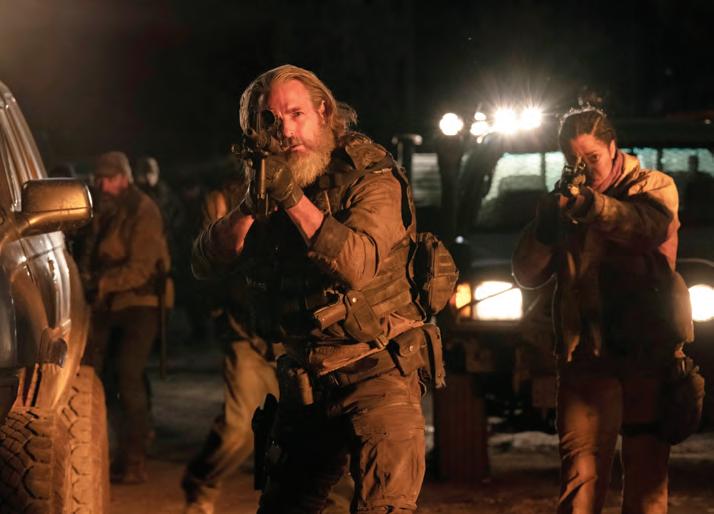

What are you looking forward to in Season 2?
RAMSEY: I’m looking forward to just being back, and I’ve heard bits about how the story’s developing, and I know quite a bit about the second video game. I’ve watched a lot of it. So, I’m just excited to experience more things and for it to get a bit deeper and more intense.
PASCAL: I’m really excited that there’s a likelihood that the dynamic between the two of them has really changed and that the texture of that is something that goes even further in the playing. ★
22 DEADLINE.COM/ AWARDSLINE LIANE HENTSCHER/HBO
From top: Gabriel Luna, Rutina Wesley, Pascal and Ramsey; Jeffrey Pierce; and Ramsey and Storm Reid.
Love in the Time of Cordyceps
DIRECTOR PETER HOAR AND CINEMATOGRAPHER EBEN BOLTER DIVE INTO EPISODE 3 OF THE LAST OF US, THE BOTTLE EPISODE THAT BROKE OUR HEARTS. BY
While the onscreen travails of Joel and Ellie take center stage in The Last of Us, as they did in the videogame, for Neil Druckmann and Craig Mazin, the translation to television afforded an opportunity to delve deeper into the larger struggle of survivors of the pandemic. The show’s third episode “Long, Long Time” expands the game’s story of survivalist Bill (Nick Offerman), who turns his hometown into an infected-proof compound, and who seems content to survive on his own. That is, until Frank (Murray Bartlett) gets stuck in one of Bill’s traps, and the pair fall delicately, and movingly, in love with one another.

While Pedro Pascal and Bella Ramsay charged headlong into the series without having played the videogame, for the core team behind “Long, Long Time,” director Peter Hoar and cinematographer Eben Bolter, a chance to work on an adaptation of one of their favorite games was unpassable. Bolter, who is credited on three episodes of the season and did additional photography on others, was excited to help execute the explosive infected attack on a cul-de-sac in the show’s fifth episode “Endure and Survive”, which felt like a real opportunity to bring the videogame to life. But he wasn’t expecting to be so struck by the script for “Long, Long Time.”
“The first episodes establish the season, but reading episode 3, it was this sense of, ‘Oh my god, these people are real. Episode 3 always had this asterisk next to it as a special episode, because it strays from the story we’re following, and we knew it would have the potential to run a little longer. This wasn’t just another episode of television—which I think, by the way, all the directors and crew
JOE UTICHI
would probably say about their own episodes. It felt like we were prepping a movie, and getting to make our movie the best it could possibly be.”
“Craig had said, ‘Whenever I see a moment, I’m going to make more of it,’” notes director Peter Hoar. “He had that feeling most strongly with Bill and Frank, that he wanted to know more about these two characters.
So, the episode felt like it was giving you everything you wanted, and then more, not less.”
The production built Bill and Frank’s town from scratch, erecting several buildings around a main street intersection and fully furnishing the inside of Bill’s house. The schedule placed the episode in the moment summer turned into fall, offering Bolter and Hoar opportunities to bathe the sets in natural light. “We leaned into the natural light,” says Hoar, “obviously with many thousands of silks and flags because of Eben’s genius. It was two actors in a strawberry patch, falling into them and eating them. It couldn’t have been simpler, and yet it was huge. It was epic and intimate, all at the same time.”
The scene in the strawberry patch was designed around the weather, says Bolter. “We knew this was a special moment, and so we plotted where the strawberries should be based on the sun’s position in the sky. We knew, if it were a sunny day, we’d get this beautiful, low sun. And we got lucky.”
Bolter says working on The Last of Us involved ceding control to the environment wherever possible. “You find yourself doing a lot to make it look like you’ve done nothing,” he explains. “There are times when, as visual storytellers, you have to bring a lot to the party. When the raiders attack the town, you’re bringing in rain, and fire, and that’s obviously a
huge technical exercise, but there were times when you knew you had to back right off. When Bill and Frank are sitting at the piano, you cross-shoot it, and stay out of the actors’ way.”
Hoar remembers that particular moment. “You’re almost disappointed from a visual standpoint, because it would have looked beautiful if we’d shot it from the other angle, but there was no choice other than to do it the way we did. We shot with three cameras, as live, and they didn’t do it too many times. That was important to me, because I felt like we opened the floodgates for them to do it, and then moved on.”
Hoar applied that same delicacy to each of the episode’s most heartrending moments, trusting in Offerman and Bartlett to deliver. “Murray was already cast when I came aboard, but when Nick’s name came up for Bill, I thought it was a bit of risk. Of course, we knew he had the survivalist edge for Bill, no question. But when we met him, I was struck by how gentle he is, and how little ego there was. He saw immediately that he had this brilliant script, and he didn’t want to fuck it up.”
Bartlett, an openly-gay actor who has played gay characters on screen, took Offerman under his wing and helped him through the most intimate scenes, Hoar says. “In a very meta way, he just helped that performance out, I think. They are both brilliant, but I know that for Nick and Murray, the perfection was putting the two of them together.” For Hoar and Bolter, who have attended many episode screenings on cinema screens, the reaction from the audience as Bill and Frank’s story plays out has meant a lot. “The other thing I got really into was reaction videos on YouTube,” laughs Bolter. “So often on set, we’re talking about, how do we get this information that’s on the page to translate to the screen? So, it’s interesting to watch people react to it with no filter. They’re not thinking about the fact that the filmmakers are going to be watching them. They’re just sitting down and watching it. You see people read those visual cues in real time, and that’s been incredibly satisfying and interesting. I keep sending them to Peter all the time. ‘Here’s another one! Watch this!”’
From left: Nick Offerman and Murray Bartlett as Bill and Frank.
DEADLINE.COM/ AWARDSLINE 23

HOUSE OF THE DRAGON DELVES INTO THE BACKSTORY OF GAME OF THRONES’ TARGARYEN FAMILY, SETTING THE STAGE FOR ANOTHER EPIC ROYAL BATTLE. LYNETTE RICE
TRAVELS TO WESTEROS TO MEET THE CAST— PADDY CONSIDINE, MATT SMITH, EMMA D’ARCY AND OLIVIA COOKE
Photographed by Violeta Sofia exclusively for Deadline
House of the Dragon
Star Wars: Andor
The Lord of the Rings: The Rings of Power
Star Trek: Picard
Styled by Rose Forde /The Wall Group DEADLINE.COM/ AWARDSLINE 25 The Last of Us
Emma D’Arcy was feeling like a bit of a cheat. It was July of 2022 at the world premiere of House of the Dragon in Los Angeles. Stylishly dressed in an oversized suit and drop earrings, D’Arcy worked the red carpet like an old pro but never felt completely at ease among the hundreds of eager fans who packed the Academy Museum theater. “It’s like finding yourself in someone else’s life,” recalls the actor, who plays Queen Rhaenyra Targaryen in the HBO drama that’s based on George R.R. Martin’s Fire & Blood. “It’s quite wild having never done that before, and certainly not on that scale, obviously, with one of the biggest shows in the world. And I am quite camera shy, which is obviously a disaster.”
But when the lights went down and the Game of Thrones theme music filled the theater, D’Arcy’s anxiety was replaced by an inescapable euphoria. “We were so thrilled because we heard initially how they were sort of holding their cards close to their chests about what the theme would be,” says the actor. “I sort of felt like, ‘come on, you cowards, use the music!’ Like, put your money where your mouth is. It’s embarrassing, but when I used to watch Game of Thrones when it was on TV, I got chills every time. I would never skip the titles, you know? They were so good. So good.”
Though it’s impossible to continue the Westeros franchise without featuring various towheads, dragons and that indelible title music, Martin and co-creator Ryan Condal weren’t looking to straight-up copy what David Benioff and D.B. Weiss achieved over eight, Emmy-winning seasons on Game of Thrones. Rather, their goal was to tell more of an intimate family story that takes place 172 years before the birth of Daenerys (played in Thrones by Emilia Clarke) by focusing on three main characters within the House Targaryen—the reluctant King Viserys (Paddy Considine), who ends up marrying Alicent (Olivia Cooke), the best friend of his daughter Rhaenyra whom he dubbed the heir apparent to the throne. Add in a reckless uncle named Daemon (Matt Smith) who falls hard for his brother’s dragon-riding daughter, and you’ve got a jam-packed first season full of treachery, incest and familial violence.
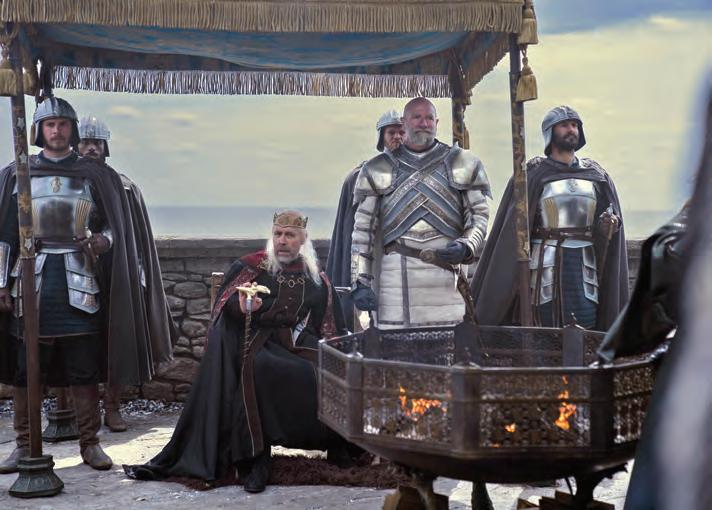

“The trick was really to show this generational conflict that began with Viserys’s generation,” said Condal at Deadline’s Contenders event. (Because of the WGA strike, Condal would not do interviews for this story). “Viserys and his hand Otto Hightower (Rhys Ifans) passed it down to their children, Rhaenyra and Alicent, who were young women and used as pawns in the game of thrones. And then as they grew up and became adults and had children
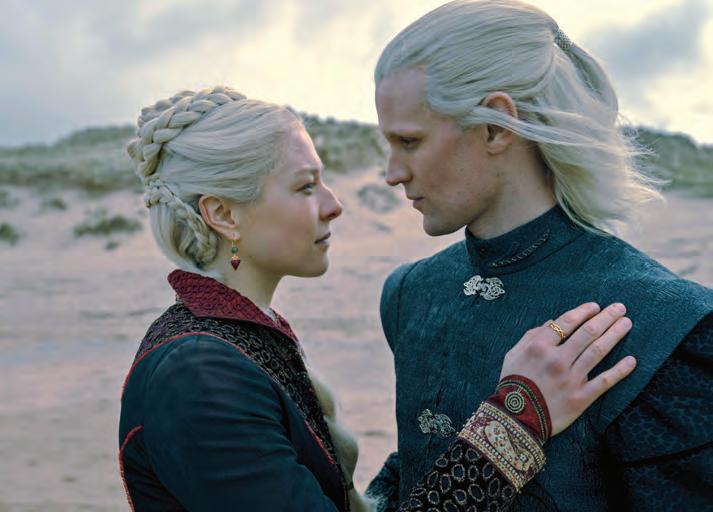
OLLIE UPTON/HBO 26 DEADLINE.COM/ AWARDSLINE
From top: Emma D'Arcy and Matt Smith as Rhaenyra and Daemon Targaryen; Olivia Cooke as Alicent Hightower; and Paddy Considine (seated) and Graham McTavish as King Viserys Targaryen and Ser Harrold Westerling.
of their own, and this bitter rivalry and grasp for power gets passed on to their children. So it’s a threegenerational story and we needed to get through that in the course of one season.”
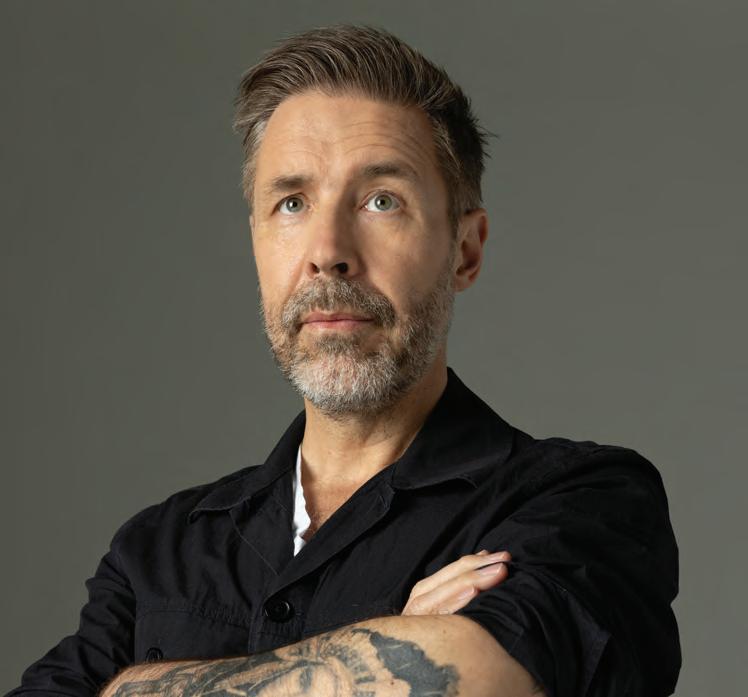
That meant beginning the prequel with two younger actresses playing Rhaenyra and Alicent—a risky proposition that meant switching out actresses Milly Alcock and Emily Carey for D’Arcy and Cooke halfway through the 10-episode season and possibly raising fan ire (which ended up happening since Alcock, in particular, was so well-liked).


“It’s rarely done,” admitted Cooke to Deadline in
2022. “I think while watching it, I felt more pressure than when I actually filmed it. It never felt like we were replacing the others. It just felt like the first five episodes were a sort of a time capsule.”
Fortunately, Cooke and D’Arcy never felt a need to constantly share notes with their younger counterparts to maintain some continuity in their roles.
“There was no laying down of the law for Rhaenyra. I also didn’t feel like that was necessary,” D’Arcy says.
“I think something that’s so nice about how the first series is constructed is that it does give sort of a tangible distance from one’s childhood. I definitely
feel my childhood self to be quite separate from me and I can sort of see the edges of the person that I was as a child in a way that I’m not as good at seeing my edges now. I loved how that was literalized in the show. It was also just a huge honor because Millie is such a brilliant actor, and it was very lovely to come in after they’ve taken care so beautifully in the first five episodes. It was a very generous springboard for me and Olivia, I think.”
But while fans learned to love the changing faces of Rhaenyra and Alicent, they remained somewhat skeptical of Considine’s Viserys—especially after the
DEADLINE.COM/ AWARDSLINE 27
death of his wife Aemma Arryn and their newborn son in the first episode. People assumed he ordered her death to save his male heir, even though both were going to die regardless. (That’s medieval medicine for you!). And to make matters worse, Viserys was then encouraged to marry Alicent, a kind and rather timid teen less than half his age.
“I was sort of shocked in the first episode or so when people commented that they hated him,” Considine says. “I didn’t understand that. Why would you hate him? I don’t think that fans were used to a character like that in that world, a king who wasn’t corrupted by power or entitlement. I think it was difficult for people to place him because he wasn’t particularly archetypal and he wasn’t what they were expecting from what they’d read in the books, either.” That in itself is what made Viserys such a provocative character—and why Considine, whose previous credits included The Death of Stalin and Peaky Blinders, was the perfect man to play him. (Condal likes to describe Considine’s casting as “celestial” after both he and director Miguel Sapochnik singled him out from a long list of candidates).
As for writing Viserys, “We started with the desire to portray this very complicated character who we always said was a really good man but was not a good king,” Condal said. “The reason for that is because he’s actually quite a modern politician. He’s not quick to move. He takes consensus. He finds the middle often. Those aren’t qualities that work in a feudal medieval society. They are things we look for in our contemporary leaders. We were really excited to populate this world with a character like that. There’s a certain weakness seen in that.”
No one recognizes his brother’s shortcomings more than Daemon, who serves as the King’s Landing watch commander by having his soldiers castrate and behead criminals. Despite his malevolent reputation, Daemon was the obvious choice to succeed Viserys on the throne, but Hightower manufactured a scandal by alleging how he denigrated Viserys’ dead infant son at a local pleasure house. No such words were spoken—at least, we never heard them in the pilot episode—but it was enough to convince Viserys to give up any hope of his brother taking over the realm. That led him to anoint Rhaenyra, instead.
“I think Daemon’s got his own sense of morality, so to him, he feels like he’s always doing the right thing,” says Smith. “I think his love for his brother is true. It’s just slightly ill-conceived at times. And when you think he’s doing the right thing, actually, he’s not. And when
he thinks he’s doing the wrong thing, he’s not. I don’t know whether there’s a good guy waiting to come out in Daemon, but I certainly think there’s a side of him that is loyal.”
If not a tad, ahem, perverted: Daemon ends up—gasp!—bedding his niece Rhaenyra while she’s still a teen. Even though he doesn’t end up fathering her three dark-haired sons (Ser Harwin Strong was responsible for that), Daemon ends up marrying D’Arcy’s Rhaenyra in the seventh episode. Awkward! But before you clutch your pearls, Smith and D’Arcy actually leaned into the yukiness of it all. “If we’re going to show this relationship and we’re going to do the whole thing justice, the ick factor has to be present because that’s honest,” D’Arcy says. “It can be sexy, and you’ve got to keep the ick in the room because that’s honest.”
“Obviously we’re dealing with events that are hundreds of years old and the morality was different then,” adds Smith. “But ultimately, it’s important to the story. So, therefore, Daemon and Rhaenyra do their thing.”
And thus began the start of the Targaryen civil war, otherwise known as the Dance of Dragons, as Rhaenyra fights for her true birthright. But before we get into gritty details, get ready for the world’s most delayed spoiler alert: Viserys dies in episode 9, but not before he confuses his wife Alicent with a deathbed utterance that leads her to believe their son, Aegon II, would inherit the Iron Throne. (Viserys thought he was talking to Rhaenyra about the Song of Ice and Fire prophecy, and how she is the only one who can unite the realm). Off-camera, Considine knew the day was coming as he was told at the very beginning that his time in Westeros would be short. Besides being delightfully relieved that he would no longer have to wear such ghastly makeup—by the time of his death, his face was sunken, and he had only one eye—Considine thought his prompt passing only made the story better.
“There’s none of that wondering what is going to happen in Season 2, you know?” Considine says. “There were some comments from people who felt that the show moved along too quickly. They wanted to live with the younger versions of Rhaenyra and Alicent, but for my character, I just think he would’ve gotten too drawn out. He would’ve become quite a boring character to spread out over a season. So, I was quite grateful to die.”
And though he was a little disappointed that he never got to ride a dragon (“I would have settled
for Pete’s,” he said, in reference to the title character from the 1977 musical fantasy film), he was particularly happy to walk away with high praise from the auteur Martin himself. “His words to me were you played Viserys better than he ever imagined. Your Viserys is better than my Viserys,” Considine recalls. “To get a nod from a creator like that, for him to say that he wants to go back and rewrite Viserys history, that’s really flattering. There was a bit of jealousy when Season 2 started filming and I wasn’t part of it anymore. But at least I made an impact.”
It’s Rhaenyra’s turn now. Bereft that one of her sons was murdered in the season finale, she’ll no doubt be eager to start that civil war with Alicent and Co. when the show returns in 2024. Naturally, Condal is loath to spoil anything about the new episodes, though he did tell fans during an FYC event in March that five new dragons will be introduced in Season 2. (Deadline also broke that Season 2 will only consist of eight episodes, down two from Season 1. That’s part of a long-term plan for the drama, which means HBO is already mulling a green light for a third season.)
“I’m excited to pick up where we left off,” Condal said. “We did the hard, complex work of setting up this entirely new dynasty and family and all the players in Season 1 and took the time to do all the character work so you understood where everybody fell along the line of are they on Alicent’s side of the equation, Aegon’s side or are they on Rhaenyra’s side and Daemon’s side. The excitement now is that we get to fall into the more traditional rhythms of storytelling and see where that story is going to go. We’ve always talked about this particular tale, and George has talked about it too, about this being a Shakespearean or Greek tragedy. Whereas the original series is like this big epic sweeping fantasy, about light and darkness, ice and fire, this series is very much about a house tearing itself apart from within. Now that all those pieces have been set on the board, I’m really excited to tell the next chapter, to see what happens now that Viserys is gone and is no longer keeping a lid on things.”
As for D’Arcy, simply donning those long blonde locks helps them prepare for the battle that’s yet to come. “The wig is amazing. It does all the work,” they admit. “It changes everything about your reality. It’s funny, when we come in on a weekend to rehearse or something, I would be as I am. I come in and I’m completely invisible. People are barging around, and I can just sort of lurk about and no one really notices that I’m there until we’re doing the work. Obviously as an actor it’s a total gift because I leave the makeup trailer with that platinum blonde hair and the world is different. When you come in wearing a blonde wig, people want to hold the door open for you. Honestly, I can’t stress this enough. People should try it. People should go out in the reverse of however they look or present and see how different the world is. It’s wild.” A
“ If we’re going to show this relationship and we’re going to do the whole thing justice, the ick factor has to be present because that’s honest.”
28 DEADLINE.COM/ AWARDSLINE
—EMMA D'ARCY
House of the Dragon
Star Wars: Andor
The Lord of the Rings: The Rings of Power
Star Trek: Picard
PICKING UP ON ROGUE ONE’S HAUNTED THIEF, DISNEY+ SHOW ANDOR UNCOVERS
A NEW CORNER OF THE STAR WARS
GALAXY. CREATOR TONY GILROY AND STAR DIEGO LUNA EXPOUND TO ANTHONY D’ALESSANDRO ON CASSIAN’S JOURNEY AND ITS REAL-WORLD PARALLELS.
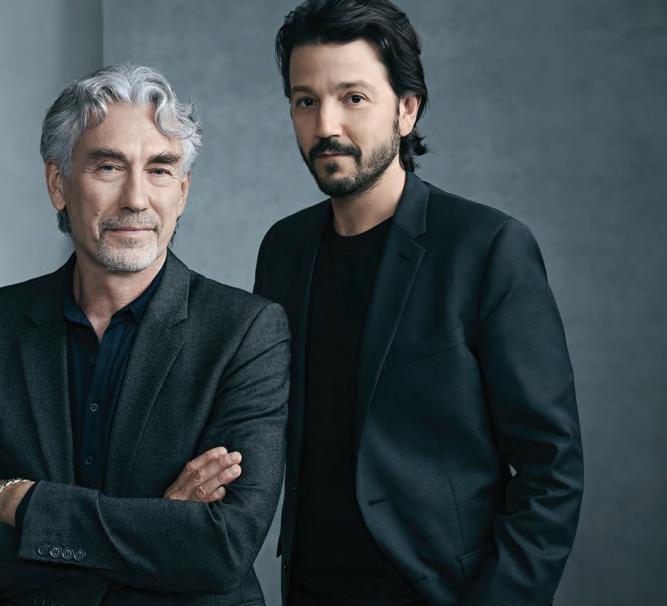
Just as he redefined the legal drama with the Oscar-winning movie Michael Clayton, Tony Gilroy has made arguably the most serious Star Wars streaming series to date in Disney+/ Lucasfilm’s Andor, which is steeped in the binary of a burgeoning morose utilitarian empire that’s dominating the denizens of the universe.
Set before the events of the 2016 prequel, Rogue One: A Star Wars Story, which focused on the band of misfit spies who team up to steal the Death Star plans (which are in turn used by the Rebellion to take out the massive space station in 1977’s Star Wars: A New Hope), Andor follows Rogue One’s Cassian Andor (Diego Luna)—known for being a thief, a liar and a cheat—as he becomes a lynchpin in the Rebellion’s rise against the
DEADLINE.COM/ AWARDSLINE 29 The Last of Us
EMILY SHUR
Empire. Gilroy wound up writing on Rogue One, directed by Gareth Edwards, and handling additional shoots and edits on the movie.
The series, in allegorical fashion, hits close to home in echoing a lot of what we see on the news, from the rise of the Trump era, the liberals who seek to undermine it, the Mexican border crisis, and the war in Ukraine. In an interview before the WGA strike, Gilroy and Luna share more insights on Season 1. At the time, they were halfway through production of Season 2. Gilroy announced in early May that he had ceased all non-writing producing duties on the series due to the strike. All scripts for Season 2 were completed ahead of the WGA’s contract expiration.
Diego, what were you privy to about the development of Andor before Tony arrived?
DIEGO LUNA: It was very vague. It was more like it was the idea of what could we get with this premise. We know what Cassian’s capable of, but we didn’t know where he came from, and what made him the right guy to lead this mission. Rogue One is this film about an event where you get to know these amazing characters, but you don’t know what happened to them before. So, it was about answering that, and for a long time, there was a battle between how far we go and how much is it going to be about the relationship between him and his droid? It wasn’t until Tony came that we got to this very specific idea of, let’s go five years prior.
On Rogue One, did both of you interact?
TONY GILROY: We’re not going to get specific about what happened on Rogue One. We spent a lot of time together. We spent 10 months together, but we’re not going to go beyond that.
What parts of the original movies inspired you and made you want to expand on canon?
GILROY: I was there in the audience in 1977. That’s one of those things, it was like seeing Avatar or Apocalypse Now at the Ziegfeld [Theatre]. It wasn’t just going to a movie; it was an event. It was a cultural passage. I was an audience member along the way, but it would be disingenuous for me to say that there was some burning desire or some issue that I wanted to rectify in the Star Wars canon. No, for me, it was a much different point of entry.
I had seen one of the versions [of the previous drafts of Andor] Kathy [Kennedy] sent, just as a point of interest, not as an employment request, and I
thought it was incredibly well done. But I thought it was totally limiting and claustrophobic in a way.
It was really Cassian and the droid—Butch and Sundance—and they go out and do all these things. So, I wrote a long letter back to her: if you’re going to do it, maybe you should do something this insane. And it was a year later when they came back and said, “You know, we kind of thought about it. Would you be into doing that insane version that you pitched?” I had no burning desire, I had no issue in Star Wars that I wanted to rectify.
My attitude [toward the series] was everything has to be real. I’ve done all kinds of movies and fixed movies. My whole thing is it’s got to be real, it’s got to be vivid, you’ve got to really be desperate to know what happens next. And if I can hit those three, and I can break your heart in the bargain, that’s what I’m going for.
On keeping it real, there’s a line in the prologue of Star Wars: Episode I - The Phantom Menace about the taxation of trade routes. You have been unafraid to go into the taxation of trade routes in this show, meaning you got really granular about the inner workings of the Star Wars universe. Was there ever any concern that the series would be too heady for the average Star Wars fan?
GILROY: No, they yearn for it. As long as you’re making up things that are interesting, and consistent, and really non-cynical and really detailed, and really fascinating, and as long as they don’t violate some basic thing [in canon]. I’m just creating canon every episode. Our main navigational Star Wars piece of information is the calendar, is the five years that we’re covering. And obviously, our last block is the last three days before Rogue One. So, the last shot will be walking into Rogue One. So, you can imagine that we have to do a lot of interlacing at the end, with the calendar.
In building Cassian Andor, where did you draw inspiration from?
LUNA: I can’t be specific, because then it ruins the whole… if you answer this with specificity, then it’s like, Cassian is this, you know? I’ll tell you, there’s so much inspiration that comes from growing up in Mexico, knowing the history of Latin America, of so many people who are devoting their lives for change. I’ve been witnessing from a very privileged position all my life, living in a country that serves as a way for many to try to change their lives, because there’s no opportunities, because of what oppression is;
oppression, violence, corruption, and witnessing that. Also, crossing this border over and over. There’s a lot of that. A lot of those stories that I’ve heard over the years, that are represented here. And it’s interesting, because they were there from the moment I was thinking of Cassian in Rogue One, before I met Tony and after I met Tony.
How long does it to take for you to put an entire season together?
GILROY: Oh my god, to do this… I started on this in Scotland, two and-a-half years ago. 18 months to get the scripts ready, 18 months to get here, and then another 18 months to finish.
LUNA: Three years.
GILROY: In the end, it’ll be five years of my life. So, I’m three and a half years in. I’ve got another year and a half to go.
How big was the writers room?
GILROY: Well, I did it in a weird way, because I didn’t know what I was doing, and I was desperate, and I was afraid. I’d never done it before. I panicked, so the first time around, I had about a hundred pages. I had the beginning, the middle, and the end. I knew a bunch of stuff, I knew where we wanted to go, I knew the structure. I brought on Beau Willimon, who I worked for on House of Cards, a good friend, and my brother Dan, and I actually trust him quite well.
I knew they could play really hard, really fast, and we went into a room for five or six days with this sort of big, 100-page piece of meat. And we had one of the most exciting creative experiences I’ve ever had. I mean, it was just wildly energetic, and brutal, and effective. But here’s the thing, it wasn’t just the three of us that were in the room. Sanne Wohlenberg, who’s the [executive] producer, was in the room, sitting, not at the table, but one row back, and Luke Hull, who’s the production designer—who I’d been collaborating with for four months before I got to that room—was in the room. He’s my primary creative collaborator on the story. And so, we chewed that up, within five days. We filled in the blanks over five days, very powerful days.
When you’re outlining a script, and a plot point just feels same old, same old, how do you break it and make a story fresh?
GILROY: You throw it away and start over. For example, the prison. I have all this stuff. It’s like, can this work? But I have a big gap. I go, “Man, I’d really like this guy [Cassian] to go to prison here. This would be really good, would spread out the time. I’d like to put him on ice for a while. This is the point in his education where I’d really like him to be part of a mini revolution. I’d like to see a little Spartacus, and I’d like to really see him do it through somebody else.”
We love prison movies so much. And if we can’t do something completely unusual and fresh, then we’re not going to do it. We’ll do something else. So, that’s the mandate: for the whole day, we start, what kind of prison? What does it do? What is it? Weapons all away? What if it’s clean? What if it’s antiseptic? What if there’s very few guards? What if they’re building pieces for the Death Star? My God, what if
“
I was there in the audience in 1977. It was like seeing Avatar or ApocalypseNow at the Ziegfeld [Theatre]. It wasn’t just going to a movie; it was an event.”
30 DEADLINE.COM/ AWARDSLINE DISNEY+/LUCASFILM/EVERETT COLLECTION
—TONY GILROY
they have electric floors? Holy shit, that means you don’t wear any shoes, and then boots became… I think Beau did, like, three boot drafts. We’re like, boots were everything. Every now and then, I have to do something a little ordinary here and there, just for utility. But 99 percent of the time, the mandate is, no scene doesn’t have a hook. No scene is a scene that we did exactly before, that I’ve ever done before; we’re always trying to push it.
Is there more Star Wars for you both after this?
LUNA: What kept me sane when Rogue One was finally offered to me is that he had a very definitive end, and there was no way to go back. I really went home thinking it’s over, took all the shit from my kids, like, “You took us there and you’re not invited anymore? You’re a one-hit wonder?”
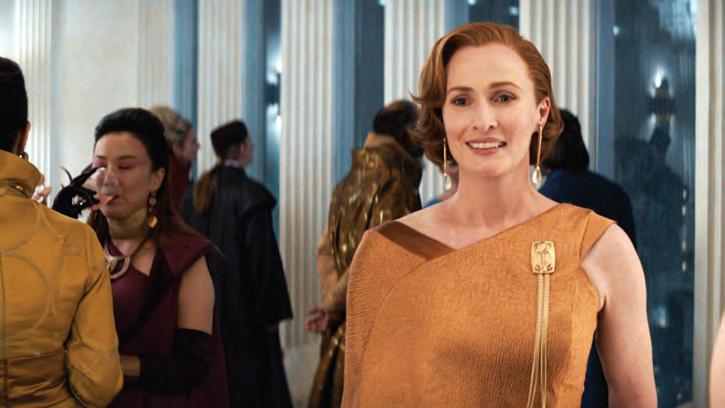
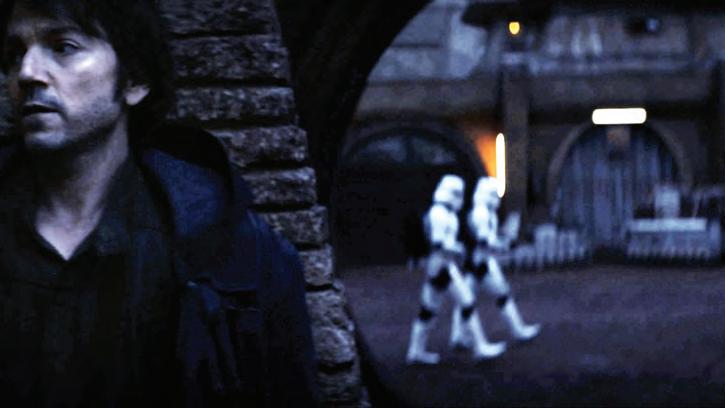
Then this happened, and it comes with the same premise, and I’m just going to stick to that idea, obviously, because it’s been so demanding, so hard, so interesting, but also so weird, and so different from everything I thought was essential in my life.
GILROY: I mean, look, you know, most of your readership is in the business. People know there’s no crying in baseball, and there’s no whining about how hard you work, but man… I have a friend who runs a dairy farm, and I used to go up there and work at the dairy farm. The cows have to be milked twice a day, every day. It doesn’t matter if your leg just got cut off. They have to be milked; it never ends.
And it’s been three and a half years of dairy farm. I have no idea what I want to do. I am like, literally, maybe get in touch with a bunch of the friends who I haven’t seen for the last three and a half years, maybe go to some of the places I used to love to go, that I haven’t been able to go for the last three and a half years. Maybe try to get my wife to remember that we didn’t used to do this show. I really want to finish strong and stick to the landing, and take a very big, deep breath.
The way you’ve mapped out your second season narratively is unlike any other show.
GILROY: When we come back later, it’ll be literally like a Friday, Saturday and Sunday. And then, we’ll jump a year, and then it’ll be, like, four or five days, and then we’ll jump a year, and then there’ll be another four or five days, and then we jump a year, and be another four or five days. I don’t know whether anybody ever did it before because I don’t know if anybody had a chance to do it before. We’re in the brand-new era of making these shows. These shows are all new. This whole idea of how to make these shows, and the economic scale of them is new, and everything’s new.
There’s one dangler you’ve left from Season 1—Cassian looking for his sister in the brothel in the first episode. Is that a string you’re going to pull on in Season 2?
GILROY: I don’t really want to get into spoilers. What’s the gracious answer on this? One of the important things in this show, because of the expanse of it, and because of the detail of it, is knowing when and where to make things intricate and have them tie together, and the other side of it is knowing when to let things go and have chaos. And because that’s what life is like and finding that balance that suits the storytelling is part of it.
So, I don’t feel beholden to what you’re talking about in any way, but there are a lot of things that we do that are intricate, that we weed along the way. So that’s a complicated answer. A
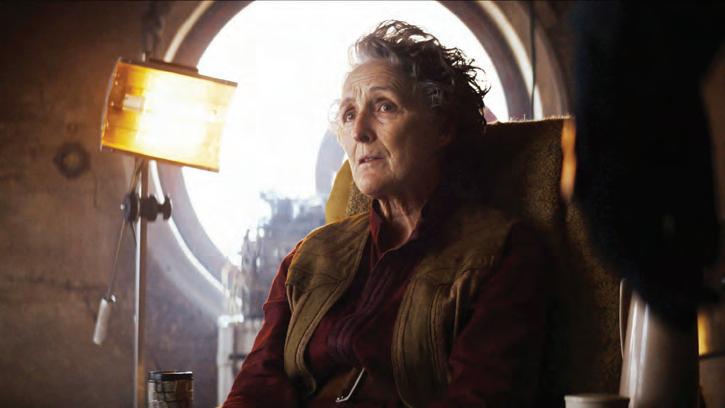
DEADLINE.COM/ AWARDSLINE 31
From top: Diego Luna as Cassian Andor; Fiona Shaw as Maarva; and Genevieve O'Reilly as Mon Mothma.
THE LORD OF THE RINGS: THE RINGS OF POWER MAY BE THE MOST EXPENSIVE TV SHOW EVER PRODUCED, BUT THE MONEY IS ON THE SCREEN, FINDS HELEN O’HARA, AS SHE MEETS THE CAST ON THE SET OF THE SHOW’S SECOND SEASON.
32 DEADLINE.COM/ AWARDSLINE
Fantasy on TV was once the preserve of teen-skewing shows like Xena and Hercules, until Game of Thrones made things bigger but bloodier with its blockbuster eight-year run. Now, however, the genre is expanding in unexpected ways, typified by Amazon’s The Lord of The Rings: The Rings of Power. Where we might have expected another adaptation about obviously good folk fighting clear evil, the show that emerged offers a look at power, obsession and conflict set thousands of years before J.R.R. Tolkien’s foundational text. After Thrones (and its own prequel), it is a coming-of-age for the genre, proof that fantasy is capable of offering subtlety and complexity as well as large-scale adventure.
The TV spin-off from the most influential fantasy book of all time might have gone any number of ways: there were rumors of a new adaptation of Frodo’s story or a straightforward prequel about a young Aragorn. But the show that emerged, from showrunners Patrick
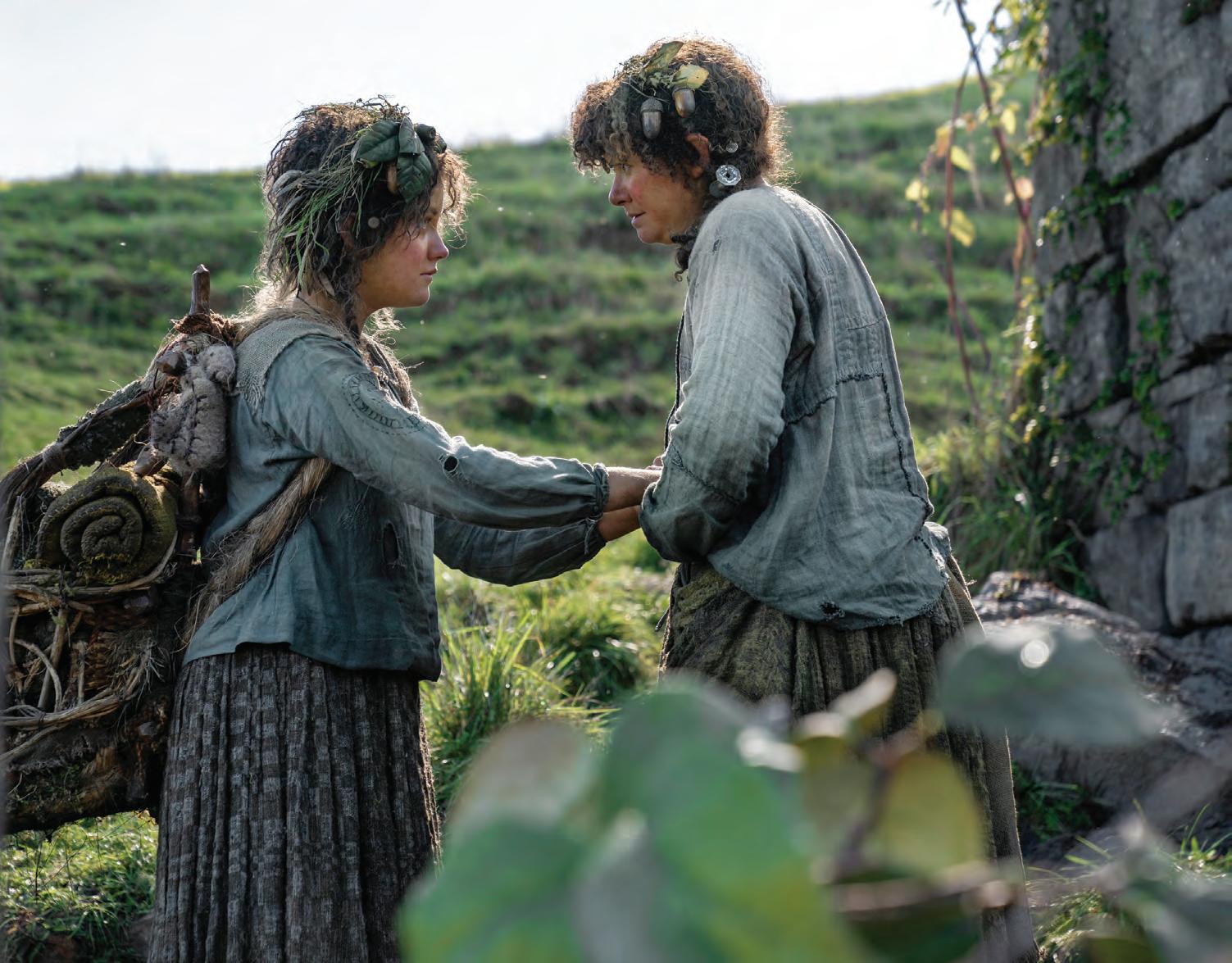
McKay and John D. Payne, is a stranger and more morally compromised beast, drawn from the appendices to Tolkien’s richly detailed text and hinted-at histories to some of its peripheral characters.
Chief among those is Galadriel, once played with stately reserve by Cate Blanchett in Peter Jackson’s films but now brought to younger and more fiery life by Morfydd Clark, the gifted young Welsh star of Saint Maud Secrecy around the show was so tight that Clark didn’t know what show she was auditioning for until she was in the room—and didn’t know her role until she reached New Zealand, where Season 1 was shot. “I had to have a word with myself, and redo everything in my head that I had thought of,” she says. “Looking back, it was a crazy thing to do, to fly to the other side of the world without knowing anything. It felt like I got on a rollercoaster and just kept going. I don’t think it was until I got into my costume on set that it really hit. Your imagination can only go so far.”
Imagination was key because the scale of The Rings of Power is unprecedented. Famously, it is the most expensive TV show ever made, with Amazon paying a
House of the Dragon
Star Wars: Andor
The Lord of the Rings: The Rings of Power
Star Trek: Picard
From left: Markella Kavenagh as Elanor 'Nori' Brandyfoot and Megan Richards as Poppy Proudfellow.
The Last of Us
BEN ROTHSTEIN/PRIME VIDEO
reported $250 million to the Tolkien estate just for the rights. Prior to release there was an attempt to portray it as a sort of Bezos folly, with a source describing the rights deal as “insane”. That initial outlay, after all, had to be followed by lavish costumes, huge sets and a full complement of dwarves and orcs, by some accounts doubling its cost.
“When I heard all that stuff about numbers I thought, ‘Isn’t it amazing that so much has been put into a piece of art?’” says Clark. “You did feel that when you were there. You could be completely transformed, see nothing but set. The orcs and the background actors are such a massive part of it. I’ve never felt more like [acting] is not an individual pursuit.”
The sprawling story of the show takes in numerous races and their competing politics, but at its heart stands Galadriel and her conviction that the elves’ ancient enemy, Sauron, has survived his apparent defeat centuries before and will return if not found and destroyed for good. As she seeks him out, the presence of certain suspicious strangers and growing tensions between the dwarves, elves, humans and hobbit-like ‘Harfoots’ suggest that Sauron’s influence is not only alive but growing across Middle Earth.
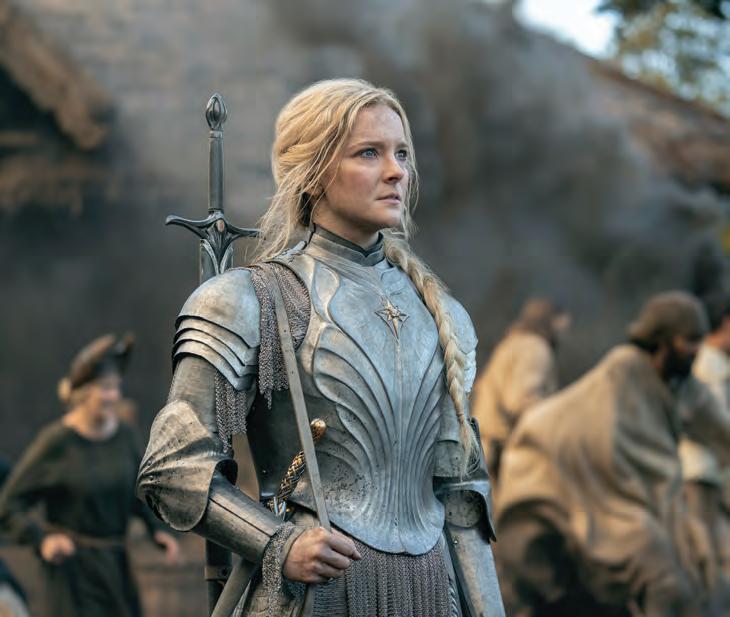
Such a plot required vivid, layered characters of all sizes, which inevitably brought challenges for its cast. The dwarves labored to communicate emotion

through thick beards and bushy wigs, while the elves had to leave behind human weakness and avoid any impulse to slouch in order to embody the grace of millennia (“You never feel more human than when you fall over while playing an elf,” laughs Clark). For the cast, creating such non-human roles requires more of actors, not less.
“Fantasy pushes you to elevate your craft,” says Sophia Nomvete, who plays the garrulous dwarf princess Disa. “There is a theatricality about it; everything has to extend that little bit further because you’re working hard through these costumes and prosthetics to match a story and a performance. That’s what’s exciting about the craft for actors working with fantasy. It’s unreal that it’s not noticed or given the credit it deserves, because every single department is working in such a tough and more elevated place. Creativity at its highest form, I think.”
Her onscreen husband Durin, aka Welsh actor Owain Arthur, concurs. “It feels like theater. I remember coming off the day’s work buzzing with adrenalin. And I’ve never had that on TV or film before, only on stage.” Arthur, who comes from a mining part of Wales, connected immediately to the dwarfs’ Celtic energy and underdog indefatigability, and if he lost his battle to give them all Welsh accents, grew to enjoy their Scottish tones instead.
He even grew fond of his prosthetic nose and itchy beard. “I’d never worked with prosthetics
before, so I was excited. But I quickly realized how challenging it was going to be. With all of this stuff on, it is a hindrance. You try to focus on your intentions, but you have to make these things work for you. So, it took a while. But still, today, I’m humbled. I consider myself very lucky to go in and play a different being every day, to stretch how far you can go from being a human.”
For the largely unknown cast, that vast budget was most felt in those expert prosthetics and in that sense of detail and depth created by the show’s talented crew. They had Kate Hawley costumes in natural materials, rich with details that no camera would ever catch; elements of the various races’ histories carved into the sets and props around them. Hawley created an ‘inspiration room’, with a corner for each race and samples of materials, examples of key colours and design motifs and sketches of their typical looks.
“I remember seeing someone making the lichen on the rocks,” marvels Ismael Cruz Córdova, who plays the forest elf foot soldier Arondir. “I thought they were real, and I grew up in the mountains! It was that level of detail; there’s mythology in each of the sets for each world. What it does to you as an actor, even when you don’t perceive it, is it infuses your work.”
Puerto Rican actor Cruz Córdova saw the Peter Jackson Lord of The Rings films as a child and got his
“When I heard all that stuff about numbers I thought, ‘Isn’t it amazing that so much has been put into a piece of art?’ You did feel that when you were there.”
34 DEADLINE.COM/ AWARDSLINE
—MORFYDD
CLARK PRIME VIDEO
introduction to the craft of filmmaking when he saved his pocket money to buy the DVDs and devoured the ‘making of’ featurettes. “I fought tooth and nail for the role. Fantasy, growing up, did give me magic. I always wanted to be an elf. It inspired me to go into filmmaking, because of the bonus features on Lord of the Rings. In my mind, I have always been on the fringe and so is Arondir, so I really believed in this role. Genre is overlooked because I don’t think people know how much goes into preparing for these roles, what it requires of an actor. It’s very removed from anything we can pull from life.”
He too only learned which part he was playing, and that his lifelong dream of elf-hood was about to come true, the night before his final audition in New Zealand. He recalls going to a local park and trying to improvise among the trees, apologizing to and praying for a tree before resolving to cut it down. That moment, repeated in his audition, made it to an episode of the show. Nor is he alone in contributing ideas to McKay and Payne’s vision of Middle Earth.
“They were so inspiring,” says Arthur of the showrunners. “John and Patrick were my gateway into this world. Just watching both of them being so excited about what they were creating was intoxicating. I felt that I had the right to contribute to that level of excitement like, what about this? What about this? There’s stuff that happens in Season 2 that I think came from a conversation we had together. It’s wonderful to have such receptive showrunners.”
It’s proof that even a half-billion-dollar behemoth can allow for individual creative input. Of course, in the end much of the show’s massive cost was due to Covid delays. The pandemic hit just as the cast began to arrive in New Zealand. Even though the country locked down its borders but not its people, the internationally-based cast still had to endure quarantine if they traveled to or from New Zealand, and as the uncertainty of the whole world paused production, causing serious delays. Nomvete, for example, was in New Zealand for 362 days before shooting her first scene. But the cast
who stayed there bonded closely, and emerged more determined than ever to make the long wait worthwhile.
“We were some of the only people in the whole world who could keep going,” Clark says. “That feeling was very difficult to wrap your head around. We already felt so lucky to be a part of this, and then when we could carry on doing it… I don’t know about you, but I watched so much TV [in lockdown]; I felt very grateful for it. It elevated us to be as good as we possibly could be, and everyone became deeply obsessed.”
The bonds the cast made also served them well when a vociferous minority of fans reacted with fury to the diverse casting of elves and dwarfs. Cruz Córdova had expected some attacks as the price of representing the dream he had had of seeing himself as an elf, but the scale and cruelty of the racist response was worse than anyone had anticipated.
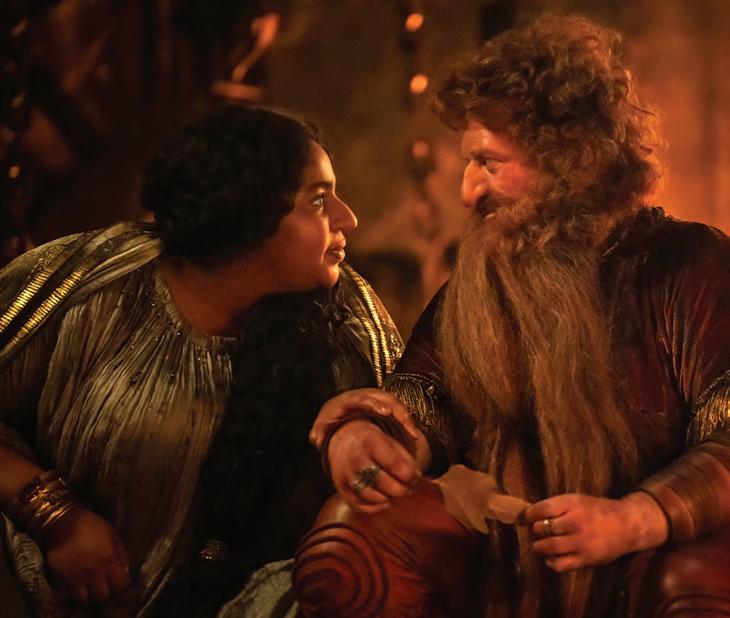
“Sometimes I want to say it was fine. But it floored us,” says Cruz Córdova. “It really, at one time, destroyed my sense of, ‘Why am I doing this?’ We would get on the phone just to cry, to scream. The real bonds that we had were necessary for us to be able to withstand that. [Clark and Arthur] were two of the biggest allies we had in that, in terms of standing up for us in interviews, taking and redirecting those questions, creating structures that kept us safe. It was that bond that kept us going.”
“We were tired,” agrees Nomvete. “But we weathered that storm, and we couldn’t have without the solidarity of everyone in our team. I’m excited for Season 2 and getting to talk about Disa and her story [instead], because she’s such an extraordinary character.”
Clark credited a majority of the fans for standing up in defence of the cast (“at cost to themselves as well”) but it clearly shook the whole team. It was a relief, then, that the critics were kinder to the show, engaging with its new characters as well as old favorites, and that audiences became deeply invested in speculating about its secrets as the largely unfamiliar
story unfolded.
As shooting wraps up in the U.K. on the show’s second season—the last few weeks without Payne or McKay on set due to the WGA strike—the cast’s hope is that all the fuss about budget and casting is behind them, and that the show can now be judged on its merits, as something that tries to tell an epic but also relevant story about how power can corrupt and goodness can, hopefully, endure.
“Season 1 was a time of relative peace, an introductory time meeting everybody,” says Nomvete carefully of what lies ahead. “Season 2 is the unravelling of it all. It’s when the force of evil really starts to put pressure on Middle Earth and we watch how everyone that we know and hopefully love handles that situation. The stakes are higher. We see what that force of evil does to each race and to each relationship. There’s so much more action. We weathered the storms, and there’s a real sense of confidence in who and what we are. I’m really excited about it.” A
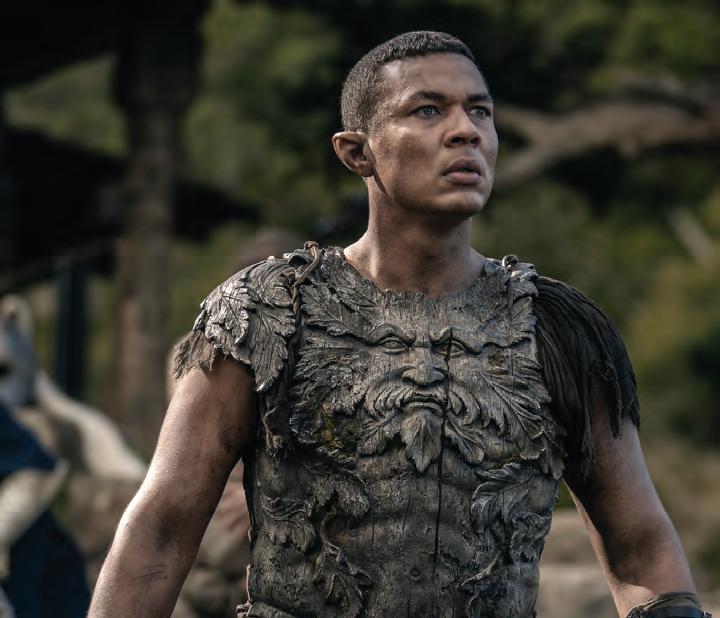
DEADLINE.COM/ AWARDSLINE 35
From left: Joseph Mawle as Adar; Morfydd Clark as Galadriel; Sophia Nomvete and Owain Arthur as Disa and Durin; and Ismael Cruz Córdova as Arondir.
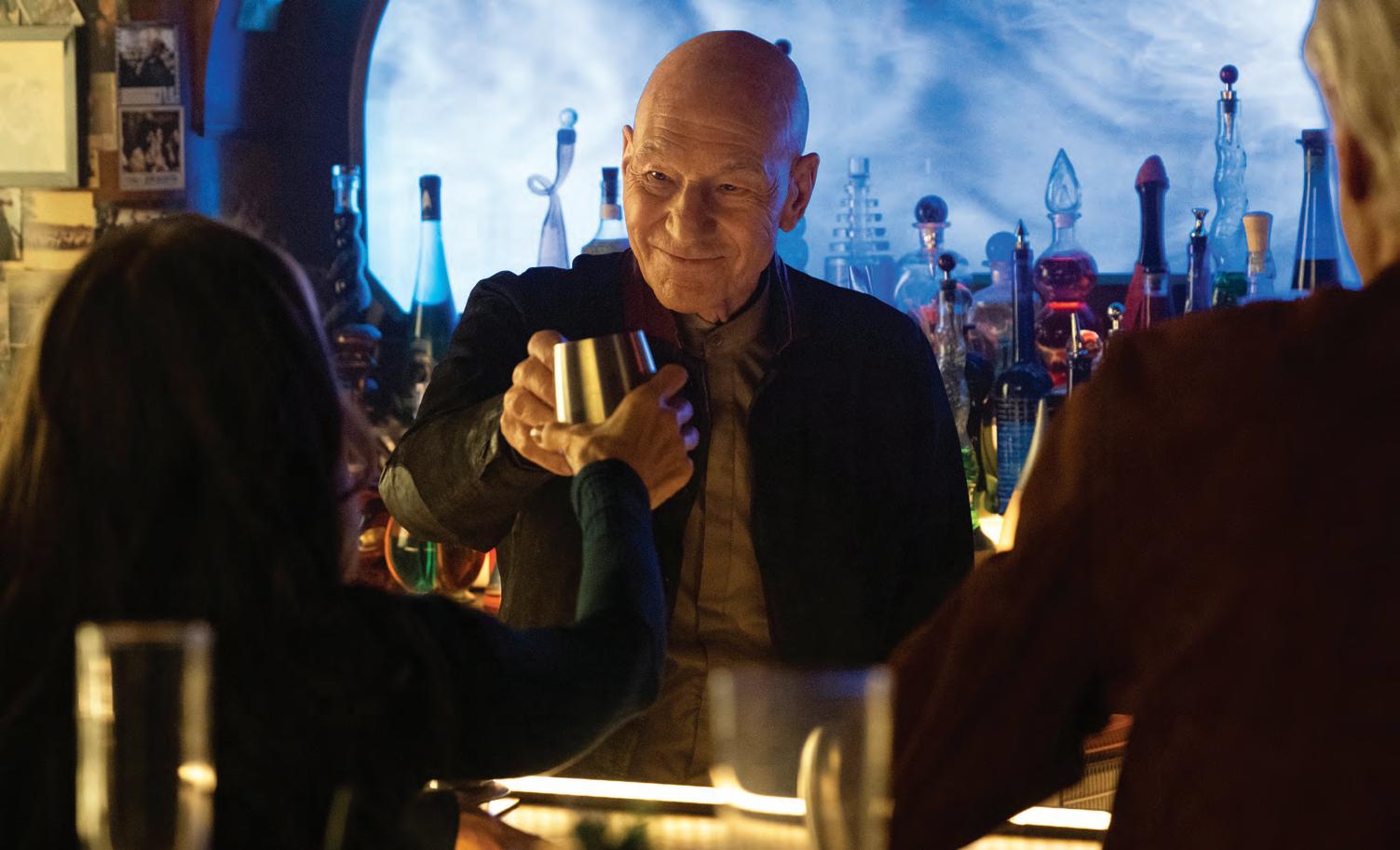
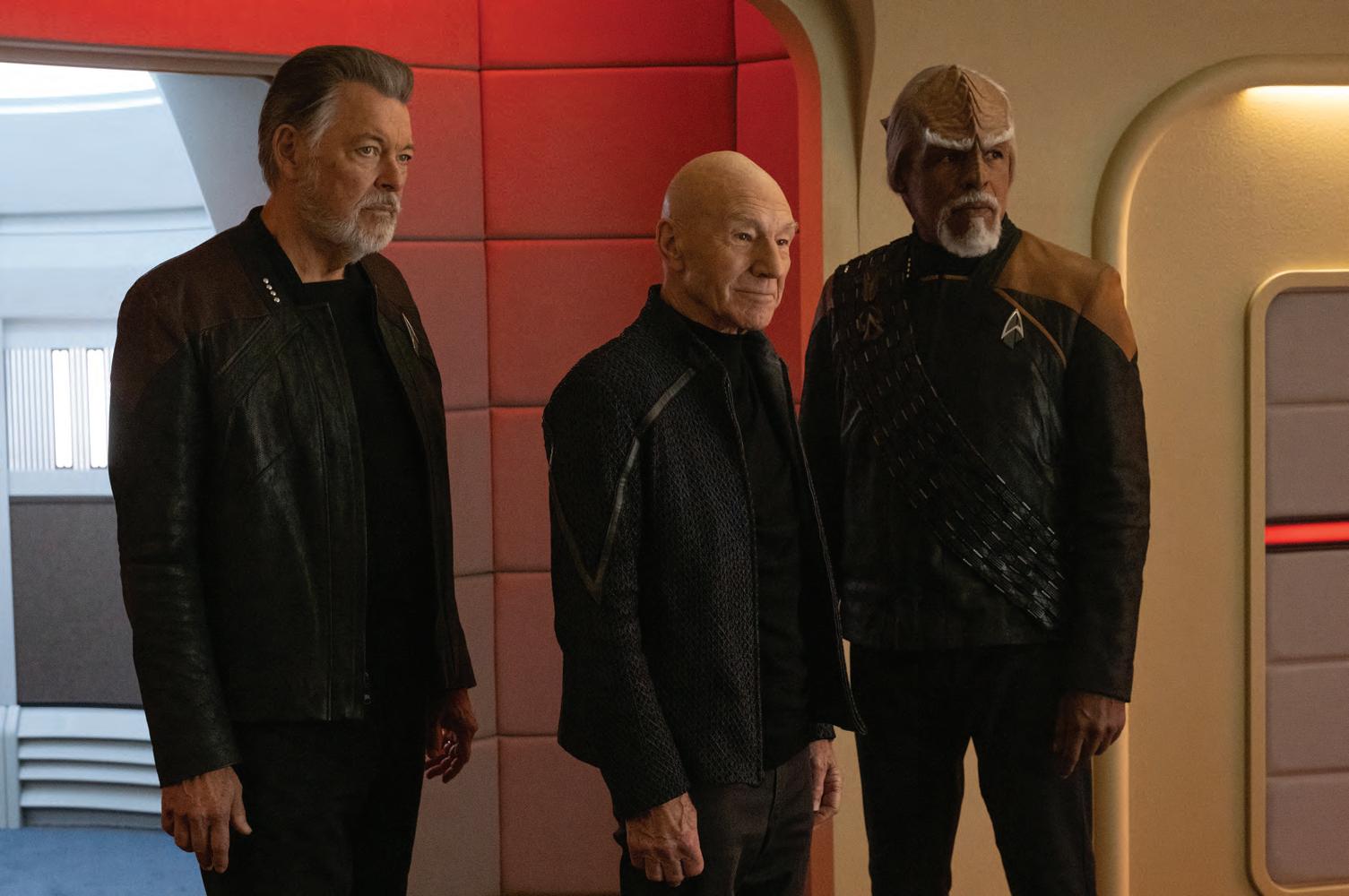
TRAE PATTON/PARAMOUNT+
From top: Patrick Stewart as Jean-Luc Picard; Jonathan Frakes as Will Riker, Stewart, and Michael Dorn as Worf.
House of the Dragon
Star Wars: Andor
The Lord of the Rings: The Rings of Power
Star Trek: Picard
Tomorrow’s Enterprise
THE THIRD AND FINAL SEASON OF STAR TREK: PICARD WENT OUT WITH A BANG THIS YEAR, REUNITING THE CAST OF STAR TREK: THE NEXT GENERATION AND DELIVERING A COMPELLING CONCLUSION TO A STORY THAT STARTED 37 YEARS AGO. PATRICK STEWART, GATES MCFADDEN AND JONATHAN FRAKES REFLECT WITH JOE UTICHI ON THEIR EARLIEST DAYS, AND DESCRIBE THE EMOTION THEY FELT AS THEY STEPPED BACK ONTO THE BRIDGE OF THE U.S.S. ENTERPRISE.
Do you remember your first meeting with one another, way back in 1986?
JONATHAN FRAKES: I do remember the first time I met Patrick. We’d been called into the makeup trailer to meet the great king of makeup, Michael Westmore. Patrick and I introduced ourselves to one another, and we got right into a cricket versus baseball conversation that eventually led to him becoming a big LA Dodgers fan [laughs].
GATES MCFADDEN: I was doing a play with Linda Hunt called The Matchmaker, down in La Jolla. Patrick
DEADLINE.COM/ AWARDSLINE 37 The Last of Us
came down to see it. We went out to dinner and it was all very exciting; we found we had a lot of mutual friends who were in the Royal Shakespeare Company. We talked all night. We both said, “I don’t know, I’m nervous about this whole thing…”
PATRICK STEWART: I remember people telling me not to worry about signing a six-year contract. They said, “You’ll be lucky to make it through the first season.” You cannot revive an iconic series, that’s what they told us. I was told, “Get a plane ticket, come over here, do the show, make some money for the first time in your life, and work on your tan, then you can go home.”
FRAKES: You have to remember, audiences were not ready for a bald English captain with a French name. And a Klingon on the bridge, and a blind guy driving. It was a very strange environment and people were skeptical to say the least. I didn’t know anything about Star Trek. Neither did Gates, or Brent [Spiner], or Patrick. I think [Michael] Dorn did, and I know your space son, Gates, Wil Wheaton did. But we had different tastes in television—in spite of the fact that my wife, the wonderful Gina Frakes, had a poster of Captain Kirk on her bedroom wall when she was a kid [laughs].
MCFADDEN: Brent said the same, that we just didn’t know if this was a good idea.
Johnny, do you remember the first time I met you? We went to a costume fitting the day before a shoot, and I was so excited and intense about it all. It was a silly scene in a shopping mall. I said, “Can we rehearse? Can we go over the scene?” You looked at me and just said, “Sure.” After about three times, you were like, “I think we’ve got it.” It was a four-line scene [laughs]. But I’d never done anything like this; committed to a series like that.
STEWART: Of course, I found out eventually that I was also signing up for six years of Jonathan Frakes.
FRAKES: Hey, now [laughs].
Star Trek: Picard’s third season reunites the whole Next Generation ensemble. The chemistry between the characters takes us right back to Next Gen when it had hit its stride. How long did it take you to settle in and find that chemistry?
FRAKES: I don’t think we got rolling until about the third season of Next Generation, in terms of chemistry. The writers didn’t know yet who they were writing for. For us, I’d never worn a silly spandex spacesuit with no pockets. I didn’t know how to act without my fucking hands in my pockets. It was a lot to learn. And the technobabble. God bless Brent and LeVar [Burton], who were given the bulk of it.
MCFADDEN: Excuse me, Beverly had quite a lot to say, too.
FRAKES: Yeah, and Beverly Crusher, my apologies [laughs]. I had the great privilege that for most of the scenes, we’d be gathered as a crew and I just had to sit next to the captain and say, “Report.” Then I could listen to everyone else mumble the technobabble, and Patrick would wrap it up. That was my favorite kind of scene.
STEWART: My knowledge of Star Trek was so minimal, and my knowledge of being on a soundstage with cameras and 40 crew was non-existent. I wasn’t
called to shoot on the first day, and I remember being very annoyed about that. I wanted to be there from the start. I wanted to experience everything. So, I went out to the location in Griffith Park, just to watch how they did it. It was Brent and you, Jon.
FRAKES: The “Pop Goes the Weasel” scene.
STEWART: The ease and relaxation with which everyone was approaching that day’s work so impressed me. I think maybe I’d been unlucky. Whenever I’d been on camera, or where cameras were the observers, I had experienced tension and stress and anxiety. The atmosphere that day in Griffith Park was so relaxed. You and Brent were working together as though you’d been doing it a lifetime, and you’ve never worked together before, had you?
FRAKES: No. We’d done a play reading, but never anything on camera before, and certainly not with these characters.
STEWART: Those first days for me was just acquiring information and experience at the highest possible speed, and from the beginning there was a cooperative and social atmosphere on set. There was a lot of fun, too, a lot of humor, for which I paid a big penalty down the road [laughs]. But most of the first season, for me, was a huge learning experience.
I’ve watched quite a lot of it in the past few months as we’ve been talking about Picard, and I must say I’m not happy with a lot of the work I did in that first season. It was a little artificial, not spontaneous, not being in the moment. Not all of those things that are now fundamental to whatever we do. It got better as it went on.
FRAKES: I feel the same way. I had the exact same reaction to watching those early shows. I felt physically uncomfortable—and I look it. I was clearly nervous. I wasn’t centered, and wasn’t relaxed, despite appearances.
MCFADDEN: That spacesuit, Johnny. It’s true that when you’re in this kind of leotard suit, it felt like some kind of heightened reality. I also knew nothing of hitting marks, being mindful of the camera and the crew.
I was intimidated by it all, and I’d come in late, because I was still doing my play down in La Jolla.
Do you remember, we couldn’t make any noise? You couldn’t put anything down on the set, because it
would make a huge noise and then you’d have to dub the entire scene.
You sat out the second season, Gates. When you came back for Season 3, did you start to feel more comfortable?
MCFADDEN: The character was different when I came back. They’d had a different doctor, Pulaski, who was a bit more Bones-like, and that’s who they were writing Season 3 for. Suddenly, my character was a little more matronly. So, no, I was a little lost for the next couple of years, really, and didn’t really get into some great writing for the character until much later. I did have a couple of really wonderful episodes, like “Remember Me”, that were a little earlier.
You each got episodes that allowed you to sink your teeth into your characters. As you got more comfortable, did you start to feel the potential of what you could do through the show?
FRAKES: Of course. And as they got to know us better, the writing made that easier to find. Patrick seemed to have a grasp of the captain before the rest of us had a grasp of who we were. At least, it felt that way to me. Patrick had some center, some position, that we didn’t have. He didn’t seem very nervous to us during Season 1.
STEWART: Oh, boy [laughs]. The comfort and reassurance that I perhaps projected came from years and years before I went to Hollywood, playing leaders, kings, princes, soldiers, warriors, in half of the plays of Shakespeare. I leant on that, I think, and while it may have given me that sense, rewatching the episodes I’m left with the feeling that I was too formalized. Too predictable. There wasn’t much of a human being there.
FRAKES: This might be a good time to remind you about the one-man show that Patrick did called Kings, in which he played a number of kings, including Billie Jean King, B.B. King, and of course, Elvis, which was my personal favorite [laughs].
MCFADDEN: Patrick, which year was it when you directed us in Every Good Boy Deserves Favour, the Tom Stoppard play? That, to me, was one of the greatest experiences of my entire time doing the
“
I remember people telling me not to worry about signing a six-year contract. They said, ‘You’ll be lucky to make it through the first season.’ You cannot revive an iconic series, that’s what they told us.”
38 DEADLINE.COM/ AWARDSLINE
—PATRICK STEWART
show. It wasn’t Star Trek, but it was, because we were all there and we were all very tight. We had Colm Meaney as well. We did it with an 80-piece orchestra in different cities, and they sold out, 6,000 seats every time. It was Star Trek fans; many of whom had never seen a theater, let alone a play, or an orchestral performance. It was phenomenal, and it was Patrick’s idea.
STEWART: As we were doing five days of work every week on the show, Monday to Friday.
FRAKES: And then to go to Chicago on the weekend and play Stoppard. That was a great period. I loved that. I think it was 1992. We started in LA, then went to Chicago. We played with the Atlanta Symphony. And Minneapolis. It was a beautiful experience, and we were directed by our captain.
It has been more than two decades since the last Next Generation movie, Star Trek: Nemesis Returning to Picard, how quickly did the characters come back to you?
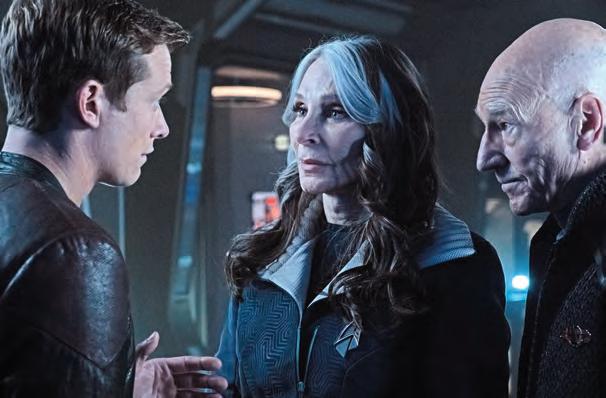
FRAKES: Our family of friends never stopped knowing one another, so there was no feeling of reunion. We hadn’t been apart. What was unfamiliar was stepping back into a turbolift, waiting to walk back onto the bridge of the Enterprise-D. That was quite an emotional experience.
STEWART: I found it wonderful, because there was a lot of talking before it was finally confirmed there would be a new Star Trek show called Picard. During those conversations, I had felt strongly—largely based on my pride for what we had achieved with The Next Generation—that I didn’t want to mess up the work by making the show a series of sentimental reunion episodes, with us having fun and going on adventures. We’d done that, and we’d done it very well. Not all the time, but most of the time [laughs]. But 20 years had passed. And I remember Akiva Goldsman saying to me, “Patrick, your life has changed in the past 20 years. So many things have happened to you. Are you the same person you were then?” I realized then that it didn’t have to make reference to The Next Generation at all. What had been happening to these characters in those 20 years? Who were they today? I already knew mine had been
up and down—captain, admiral, a desk job, not flying a spaceship.
MCFADDEN: The reason to come back was that Terry [Matalas] pitched a really great story, and I loved it. I liked the fact it was different, that the character was much more three-dimensional as far as I was concerned. I loved that it was a story about the corruption of the Federation, because our world today is so full of corruption; of the environment, of the values we’d grown up with. You read three newspapers in the morning and you’re ready to go back to bed.
Star Trek has always been at its best when it’s shrouding real-world issues and human experience in science fiction. This season too, Patrick and Gates, you’re working out your relationship as Picard is discovering a son, he never knew he had, and what that means for his life, for his legacy. Jonathan, you are dealing with grief over the loss of your son. I’m sure you’ve heard from people who have been affected by that kind of loss in their own lives.
FRAKES: I certainly have, and it has been very moving. Terry pitched a really satisfying arc for the third season, so it wasn’t necessarily a reunion. Each of the characters had to earn their entrance, and meet their position in the storytelling, and we each brought those 20 years of life back to it. There was conflict again, which as we know is the basis of all drama. Matalas really delivered what he promised us all at lunch one day, and I was thrilled to be a part of it.
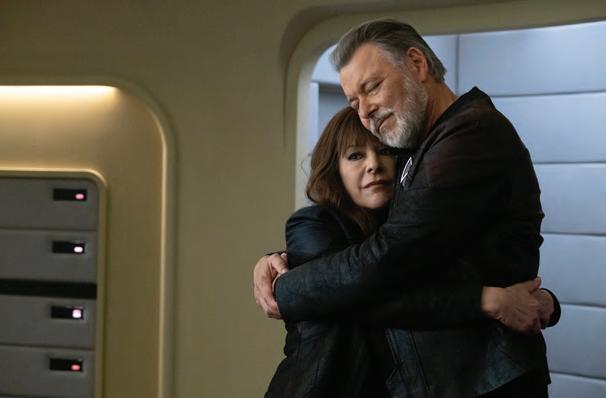
MCFADDEN: Terry did such a great job because he really loved TNG, and he loved our characters. There were more Easter eggs planted on that set than even I knew about. He knew more about the series than most of us, and certainly me. Some fans have said, “It was all action, and not enough talking about philosophy.” But look at the world. We have to take action, to prevent voter fraud, to stop this corruption that’s all around us in so many ways.
STEWART: It was very significant that we had Jonathan, who had broken down the barrier during The Next Generation of, “No, no no. The actors don’t get to direct episodes as well.” He broke that barrier down, and so he was able to bring his role as director, and all
the experience he’s had, to this set.
Even though Jonathan, better than anyone else I know, can switch very easily from one move to another, at times he would have to make critical comments about what he was seeing that he thought wasn’t right. Now, that’s not an easy task ever, but under circumstances like these it’s even harder. At the heart of it all is affection, and I speak for everyone on our cast and crew. There is respect, there is admiration, and an intense love for one another in order that we protect this show and these characters. I mean it when I say this was a unique experience. I’ve had many wonderful experiences in my life, but there’s been nothing quite as unique as what we had in The Next Generation and, now, in Star Trek: Picard
MCFADDEN: That’s true of Jonathan, and it’s also true of LeVar, too, when he directs. I feel we all will help each other out, because we want everyone to do the best, and we know one another and know what we’re each capable of. That’s very different from other sets, because I don’t have the history with anyone else that I have with this cast. You’re not going to be bold enough to say, “Hey, if I were you, I’d roll that line just a little faster.” We do, because we know we’re on one another’s side.
What has the reaction to the show meant to you?
FRAKES: LeVar said the other day that we didn’t dare hope it could be this good, or that we could revisit this world, this friendship, this family. I think it’s even better than we could ever have dared hope. I’m proud of the work, the time and the experience. And it has only made our friendships stronger.
Audiences reacted in a way I have never experienced before, as an actor or a director. The outpouring of support has been, at times, a little overwhelming. I don’t want to be caught in the bubble of it because that’s a danger, but I’ve been so grateful.
MCFADDEN: I’ll toast to that. I’m grateful and I feel the same way. It has been a complete surprise; a surprise that it happened and a surprise that it has been so well-received.
STEWART: It was a gamble, wasn’t it?
FRAKES: It certainly was. A
DEADLINE.COM/ AWARDSLINE 39 TRAE PATTON/PARAMOUNT+
From left: Marina Sirtis as Deanna Troi with Frakes; Ed Speleers as Jack Crusher, Gates McFadden as Dr. Beverly Crusher, and Stewart.
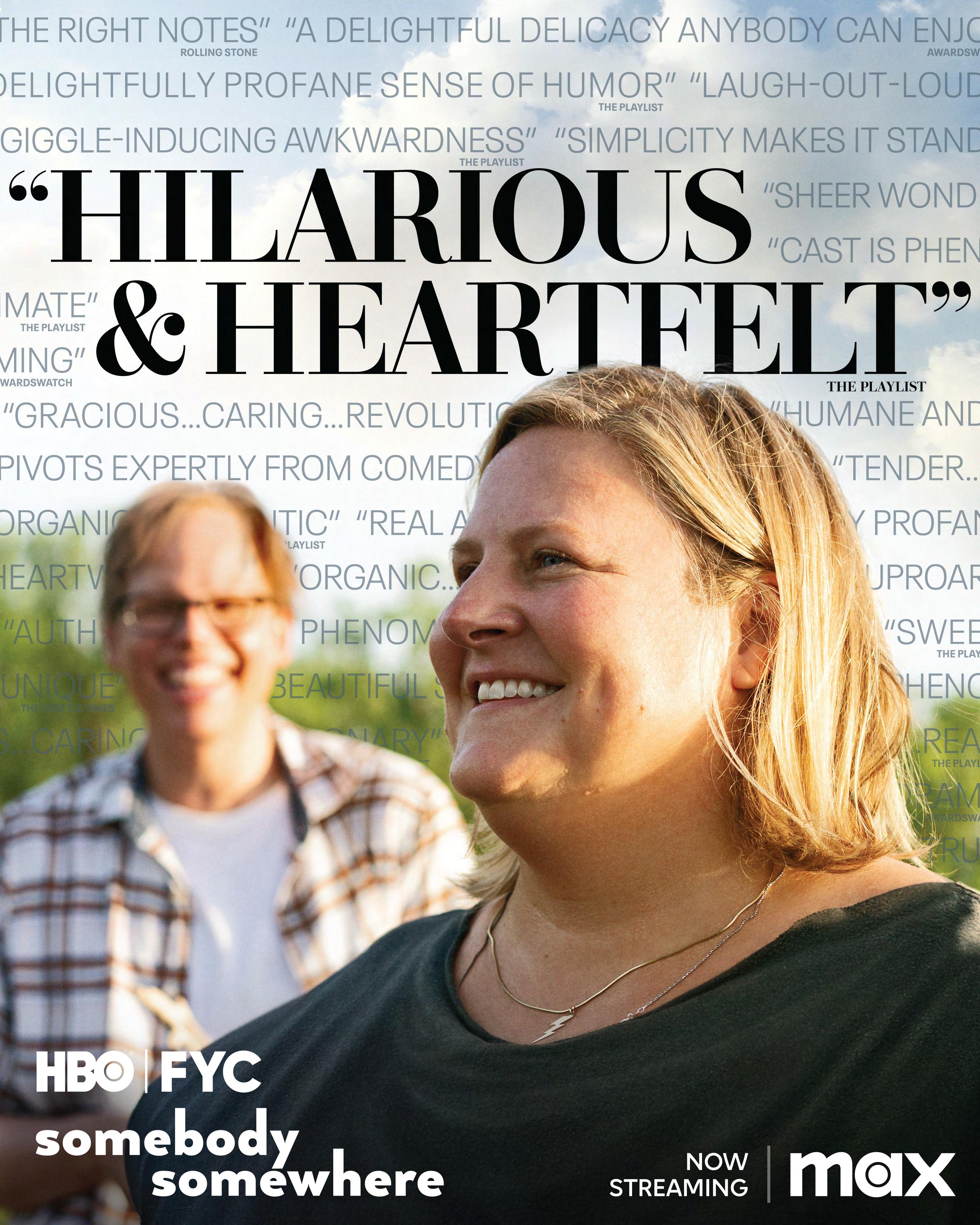
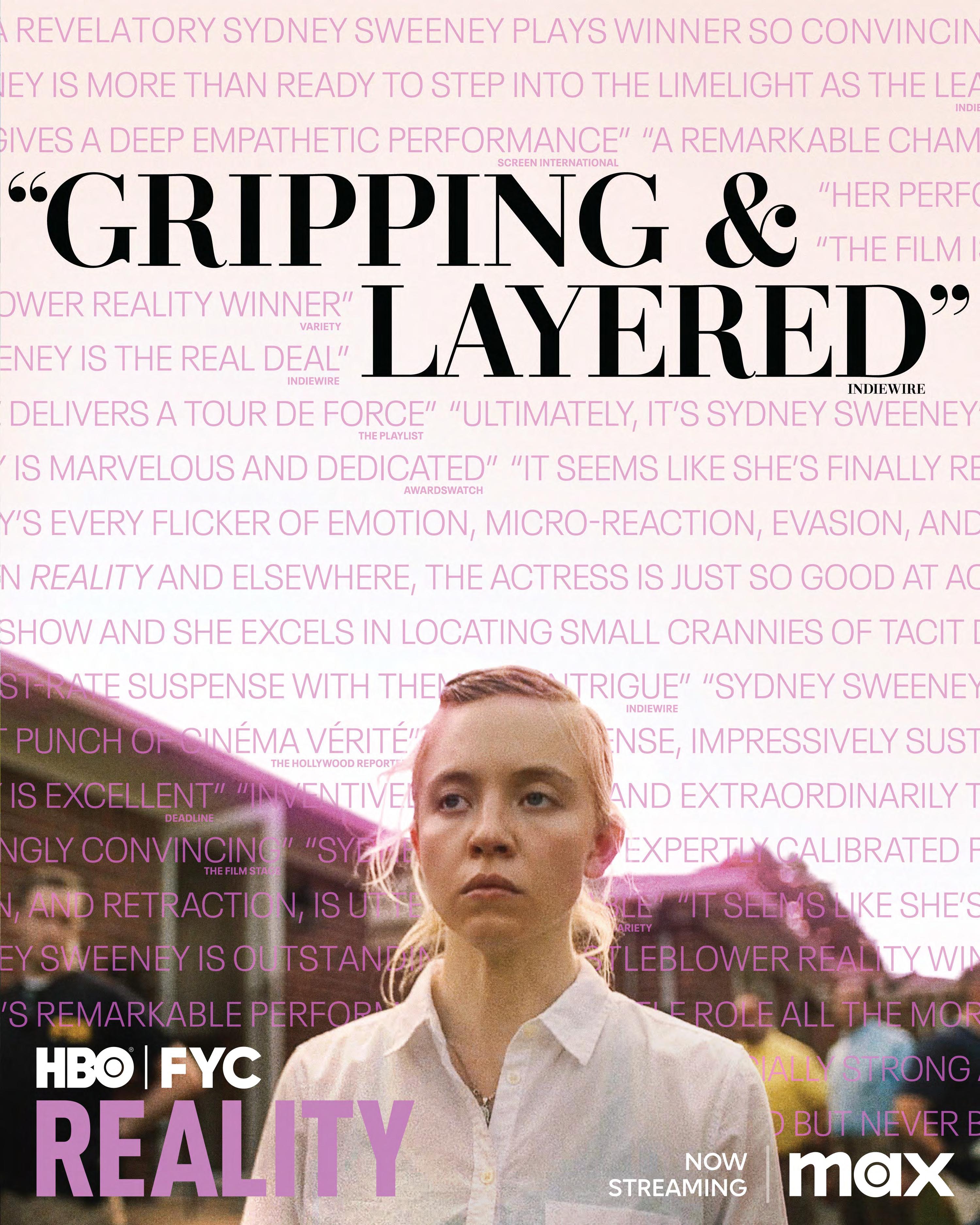
Michael CHIKLIS
BY KATIE CAMPIONE
A A A A A
Michael Chiklis was so ignited by his role as a frightened dad who must confront the realities of his troubled son’s behavior in Fox’s anthology series Accused , he decided to come back for more. After starring in what would become the pilot episode, “Scott’s Story”, he told creator Howard Gordon that he’d like to step into the director’s chair. Gordon handed him “Jack’s Story”, another gripping tale that wrestles with the realities of a post-Roe v. Wade world. Chiklis discusses infusing his work with nuance in order to handle two of the most sensitive and current topics in the U.S. for broadcast television.
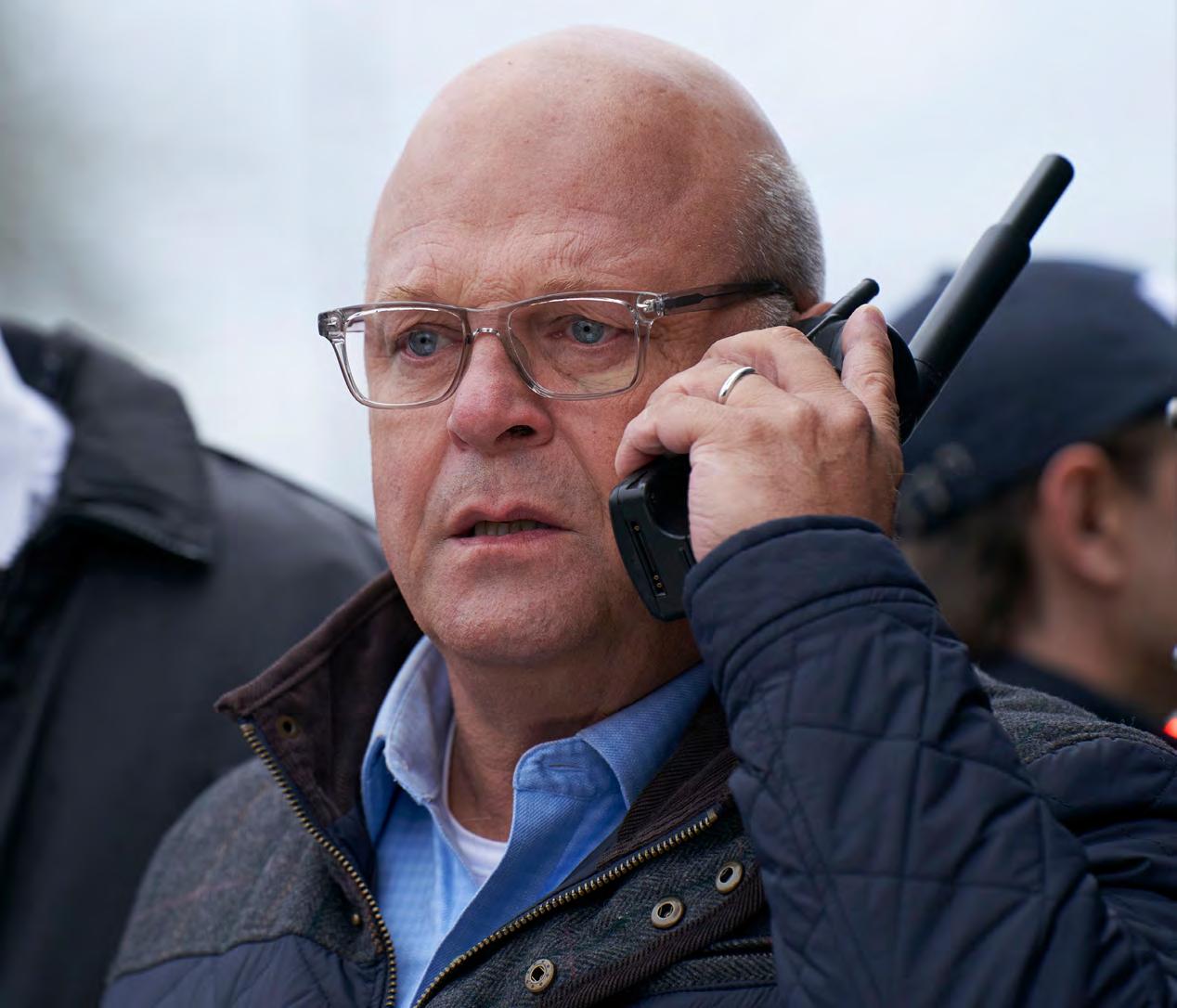
Both of your episodes, “Scott’s Story” and “Jack’s Story”, tackle some of the most hotly contested issues in the nation right now. How did it feel working on those stories? Interestingly, it’s both the reason I was attracted to doing it and the reason I was trepidatious to do it. Whenever you’re going to handle this
kind of subject matter, it’s incredibly sensitive, and you want to make sure that it’s handled in a particular way that shows tremendous humanity and empathy, and respect. It starts on the page, and Howard Gordon happens to be an excellent writer and his writing staff are fantastic. So when I read the pilot, I honestly was blown away. This is a subject that
42 DEADLINE.COM/ AWARDSLINE
The Accused star on addressing hot-button topics and dealing with the death of nuance
STEVE WILKIE/FOX
none of us can avoid in this country. It’s just madness at this point. What I liked [about “Scott’s Story”] is that it puts you as a viewer in this person’s place. At least, it did for me. Imagine if you knew in your gut that your child was mentally ill, and then you found their manifesto. What would you do? How could you respond to that? Especially if you did everything within legal boundaries? I love it when storytelling entertains you, but it also makes you think and feel. I think that’s the trifecta for me. I just don’t like it when people sort of benignly watch something. It’s so much more important to me that they’re moved.
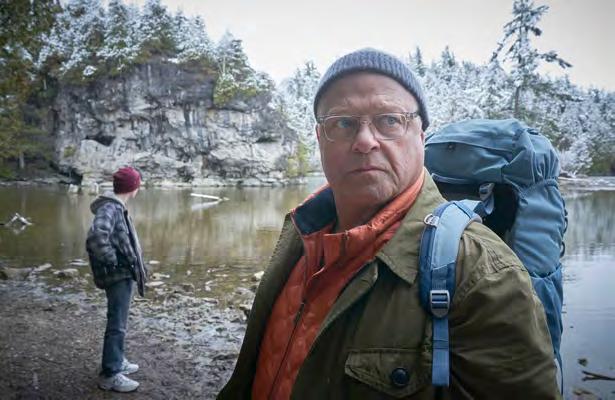
I was very passionate about both of these pieces. The crew was worldclass, to the point where I turned to Howard at one point on set, and I said, “I’d really like to direct one of these.” And the very next day, he sent me the script [for “Jack’s Story”], and it was the first draft of it. Now, that one really spun me out. I was both nervous and very excited to take it on. Howard wasn’t interested in taking a position politically. He just wanted to stay in an ambiguous place but ask questions like, what happens when the government becomes involved in your personal matters? I just was thrilled by the performances that I got out of my cast. Directing is something that I’m going to be doing a lot more of in the fourth quarter of my life. I want to bring 35 years of experience in film and television, and an additional 10 years before that of theater, to bear as a director. I feel like I’m finally at a point where I have some things to say.
Knowing that Howard didn’t want to take a position, how did you, as the director, help strike a balance in the performances? Especially when “Jack's Story” is addressing such a profoundly sensitive subject.
You have to be incredibly communicative. I was particularly interested in what the women in the cast had to say and really took a cue from them. You have to listen a lot [as a director]. I think being an actor, we’re naturally empathetic. So, you try to walk a mile in another
person’s shoes every time you take on a role. So in this way, as a director, I look at both sides of any question and try to put myself in a person’s shoes, whether or not I personally believe what they might espouse, and I try to see their point of view, and then help the actors try as evenly handed as possible to pick those viewpoints in a way that adds such a level of complexity to the story. These are incredibly nuanced, complex questions that Accused was taking on. I think one of the real tragedies of what’s happening in our country right now is the death of nuance. Or, certainly, it’s on life support. Everything’s either this or that, black or white. That’s not the way things are. Things get very, very complicated in life and not so easily explained away or not so easily dismissed. We tend to make snap judgments. We see a headline and make a judgment about a person without really delving into what’s happened. What I loved about both of these [episodes], is that there’s very little action, but there’s so much tension throughout. It’s just so palpable. It was just a joy actually to do something really smart and thoughtful, and nuanced.
With “Scott’s Story” there’s so much emotional turmoil from the beginning. It’s so difficult to imagine being in that position, like you said. As a parent, how did that inform your approach to this script?
It’s an impossible set of ideas. I have
to say, I even chided myself at one point, because you tend to think to yourself, ‘It’s got to be the parents. There’s got to be a problem with the parents. They have to have been responsible for it in some way.’ But, like in every family, there’s people who are struggling for a number of reasons. We tend to look away from those people so often, mainly out of self-preservation. You can’t take on everybody else’s grief and problems. But I just found it really horrific trying to put myself in the position of a father who actually had to contemplate taking his own kid’s life to save other people’s lives, because I read his manifesto and knew he was going to flip out. That was just a brutal place to go as an actor, as a father, as a human.
“Jack’s Story” feels a little more black-and-white to me, at least in his initial decision to help Clara.
It was pivotal that he finds her in the act of committing suicide, as that’s the thing that absolutely prevents him from doing anything other than helping her because he’s so terrified that she might harm herself again. Otherwise, the conceit doesn’t work. I just thought it was another fascinating question. That’s what I actually really appreciated about “Jack’s Story”. I really was very keen on making sure that the chemistry between Wrenn [Schmidt] and Jason [Ritter] was there… a couple that is otherwise beautifully happy. This thing happens, and they come from
different philosophical backgrounds, and these things that normally wouldn’t come into play in their life and their situation, all of a sudden, caused this incredible turmoil.
In watching the show, there were many times when I didn’t know what I would do in a certain situation. I can’t imagine how that felt as an actor.
I would love it if, in public schools all over America, philosophy and ethics were introduced in seventh grade… it’s the thing that breaks down barriers between people, because I think there’s just a tremendous amount of fear of each other in the country and in the world. It’s my experience traveling around this planet that people are essentially the same. They have families. They want the same things. They want a roof over their head, food on their table and education for their kid. They want to feel safe and protected and heard and validated. The only way you do that is by communicating with each other and walking a mile in each other’s shoes. And I love storytelling that advocates for that.
I think we all want to think that we have all these very deep-seated beliefs until we’re presented with these types of conundrums that make a decision feel impossible. At the very least, you might not agree with the person you’re in a philosophical debate with, but you’ll get to hear their point of view in an intellectual and emotional setting, in a classroom where it’s a safe place to talk… I think that’s the very core [of this show]. When Howard sent me the script, I was floored, because first of all, it was incredibly bold. It’s tragic, especially for network television. It’s not streaming. It just goes to show you that you don’t have to have language or nudity for something that’d be powerful. It’s just a nice reminder that you can do things on broadcast and be powerful. That was my reason for coming into it. It’s the material and who’s doing it, and then from there, it just builds on itself.
DEADLINE.COM/ AWARDSLINE 43
A Michael Chiklis and Oakes Fegley in the Accused episode “ Scott's Story ”.
Emily BLUNT
How she flipped the script on the traditional Western woman with limited series
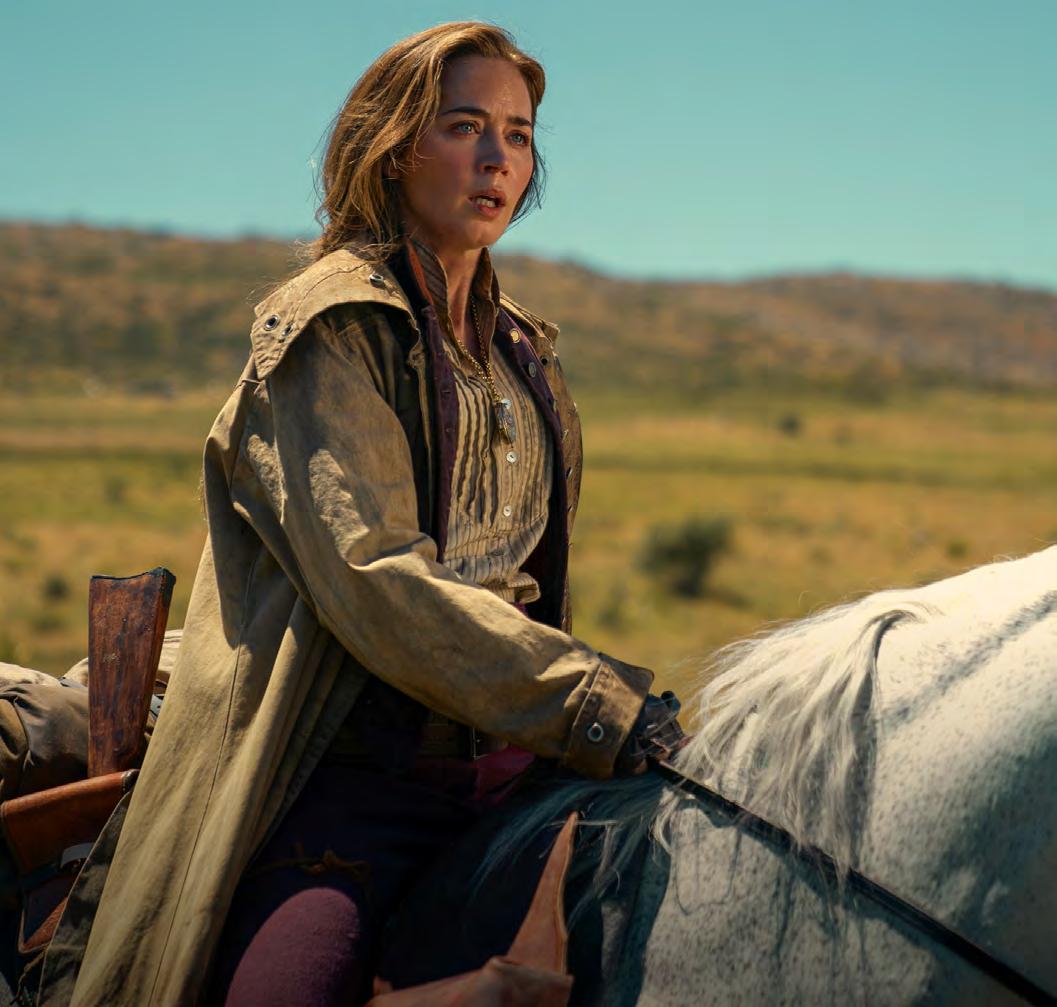 BY ANTONIA BLYTH
BY ANTONIA BLYTH
Emily Blunt just added another string to her bow. From Queen Victoria to Mary Poppins, to a cutthroat Vogue assistant in The Devil Wears Prada, a gun-toting alien killer in A Quiet Place and a straight-up action hero in The Edge of Tomorrow, one thing Blunt had never done was a Western. But her role in Hugo Blick’s The English is no damsel in distress: Cornelia Locke is a woman dead set on revenge, with the bow and arrow to prove it. Teamed up with Chaske Spencer as Eli Whipp, a Pawnee warrior, Blunt brings a complex, real woman to the Wild West.
Hugo Blick has said that he fitted the part of Cornelia to you. This project is also the first time you've taken on a producing role, so how did you and he collaborate to develop the character?
She’s the most alive character I’ve ever read on a page. She was so spontaneous and free and really unpredictable. She was so odd in some ways. Hugo’s writing doesn’t follow the rules and this character doesn’t follow any archetype or character you’ve read before. But then you realize, oh, no, that’s real
life, that’s what people are like. And you just have to surrender to the fact that she is as surprising as all human beings are and as multifaceted as everybody is. Usually in film scripts and TV scripts and theater scripts, I feel like people are wrapped up with three adjectives and it’s very difficult to do that with Hugo’s characters. I just surrendered to this incredible writing style that had panache, but reality to it. There’s a sense of theater to how Hugo writes, but he wants you to play everything very real.
I guess once in a while, you meet a writer and you feel like you speak the
same language. And I feel that with Hugo. I feel we have this kindred thing and I see all of him. I see everything that he’s doing. And so, it was just a really easy partnership and I allowed myself just to be surprised by her, I guess. I don’t know if I offered anything helpful at all to him. I just let him perceive me as he wanted to, and therefore, inject into her what he wanted of me.
When we first meet Cornelia, she appears to be that Western trope of the naïve woman in the frilly dress. She seems clueless and entitled when she offers Ciarán Hinds’ character money to free a prisoner.
Yeah. I’m going to give you money and I’m going to figure this out because I’m posh and rich. There’s a sort of air of, oh, I’ll just square this away because this is what I’m used to doing and I’m used to a world where money resolves things.
Then after a while you realize, oh, no, actually she just doesn’t care if she dies or not.
Yes, she’s a fish out of water, but she carries this secret, and this fevered determination for revenge, which does give her a fearlessness, as you said, this freedom, I guess, to speak plainly and directly and connect or disconnect with people.
The scene where you sit opposite Ciarán and eat the calf’s testicles! I remember that moment in the script where Ciarán Hinds’ character punches her in the face and it’s so shocking. And then when she challenges him and she eats the calf testicles. I just will never forget reading that scene going, “I’m doing this show. This is amazing, this woman’s world. Is it a face-off over eating calf testicles? That’s a gunslinging scene with calf testicles!”
Have you ever seen anything like that in a film?
No. I remember reading it. The way Hugo wrote it was like, she bites into it and the inside of it dribbles down. She spits the rest of it out and looks at him defiantly. On the day when we ate those things, we were just crying with laughter as well. They were made of gelatin and condensed milk, and I hate milk and I hate anything to do with milk. I just hate the color of it, anything. Ciarán actually had to fully eat one and swallow it, and it just took way too long to eat. And I was like, “You have to swallow it.” I said, “I cannot listen to you chew that for that long.”
Speaking of Ciarán, the cast is just phenomenal. How did it all come together? At what point did you come on and decide to produce?
It was brought to me with the invitation to produce, so it was given to me as a pilot and that was all it was at the time. I’d been wanting to produce something, but also to really carry something through from an embryonic stage. And not to have a vanity title, but actually a proper, “Let’s put this thing together, let’s build this together.” I just was so intoxicated by Hugo’s writing that it felt like the right project. Then I went out with
44 DEADLINE.COM/ AWARDSLINE
The English
DIEGO LOPEZ CALVIN/PRIME VIDEO/BBC
A A A A A
them; Amazon and a few other places wanted it, but Amazon just was so passionate about it, and the BBC obviously had it already. They’ll do anything Hugo writes.
Really the big mission was to find Eli, who is the heartbeat of this show as much as she is. And to find someone who was a Paul Newman character with that kind of gravitas, who just happens to be Native American. It was between three guys. And I will never forget Chaske just changing the air in the room. When he came in, it was disarming, because in real life, he’s the complete opposite to the character. He’s sweet and bouncy and loose and adorable. And then he turned it on to play Eli, and it was like everything submarined and he was lethal. And he was still. It’s that still courage to do very little and be that magnetic. And when he got the Mohawk cut, the Pawnee knot that he had… He’s brilliant.
Westerns have such a specific set of tropes and are obviously deeply American. What were your feelings about tackling the genre?
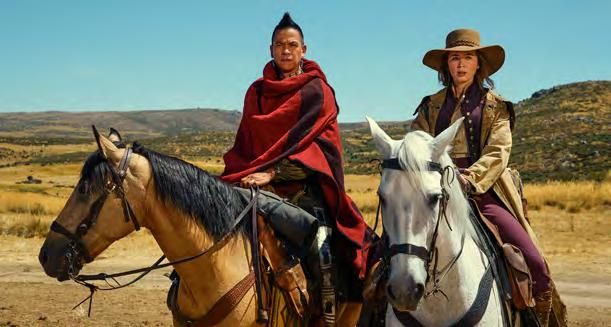
I’ve always loved the genre. I have very early memories of watching Shane, which was one of my mum’s favorites. It was beautiful. And even the modern Westerns like Giant, and then The Unforgiven. They were quite prominent in my house growing up, but I think you’re right, there are certain tropes that we were trying to carve out new space away from. And it did feel like a re-imagining of a Western because, yes, we had all of those themes of a Western, like the restoration of justice, which I think people really cling to, maybe more so in our world we’re in now because things feel so unpredictable, and accountability has sort of gone out the window. There’s a sort of urge for that restoration of justice that the Western really pursues. And yet, it’s a very specific type of justice that these two are seeking. It’s steeped in pain and the fact that their identities have been stolen from them, and it’s about race and love and power. So it just felt unusual, and she is not the damsel tied to a tree. There are two very different things about our Western. One is that your Clint Eastwood character is
played by a Native American, and the second is that your hero is a woman.
We rarely see female characters like this in a Western. I also feel like it was interesting to have both of them be these outsiders. Completely. And all they had was each other to survive, and they want to survive for very different reasons. Hers is to carry out an act of vengeance, even if it means she dies at the end of it, and his is to reclaim this land that was stolen from him. Both have this fevered need to survive and they need each other.
There’s that great scene that actually made Stephen Colbert tear up when you went on his show: she talks about the death of her son and the magic of how she and Eli have survived. It was an interesting nod to the popularity of mysticism in England then, but also how clueless she is…
I loved that scene where she goes, “I’m also a Scorpio.” And Eli goes, “Really?” And she goes, “My star sign in London, it’s all the rage. I’ll tell you about it.” Like he needs to be told about it. All he does is read the stars.
This is his whole soul. This is the pulse of his soul, this character. And this is generations before; this is not a fad. This is his essence. And her naivety in that moment, that’s so childish and funny. But he’s clever, Hugo, he does love to pepper in history without it being a lesson or a lecture.
How are your bow and arrow skills?
Quite good, actually. Not bad, not terrible. It is really hard. And then a few
times you let go and it pings on your forearm. I had endless bruises on my forearm. It’s not a walk in the park.
How has producing this project influenced your decision to do more of that? And what kinds of projects do you want to produce?
It just taught me that I loved it. I just wanted to do more of it. And it’s not just about the agency it gives you, it’s that you get to see something from its birth to when you bring it out. It’s so terrifying in some ways when you bring it out, because it really has become sort of a creative baby for you. I think I’ve been doing this a long time now, and I’m very interested in the idea of a multi-hyphenate—what I could potentially do and bring and offer to a production because I’ve done it for a while.
My sister represents the author Claire Keegan, and there was a short story she wrote that I bought that we’re working on now. And then there’s another one I’m developing now. And then I also produced Pain Hustlers It’s coming out in October, which again was just such an interesting project. It’s set to the backdrop of the opioid crisis. This is very much the lifting up the floorboards of the colossal crime behind it.
You're talking about the Sackler family and Purdue Pharma. Yeah. And it’s appalling and shocking. This tonally, is almost like Erin Brockovich meets The Wolf of Wall Street. It’s an incredibly dynamic, visceral piece, and it’s entertaining as well. But it’s an exploration of good people doing really shady things, and I guess the idea of shadiness in
all of us, which I don’t think you see very often. Particularly with a female character, you’re held to some likeable ideal, which is a bit tedious, because men can do The Big Short and The Wolf of Wall Street and it’s celebrated.
This is a good person who’s a single mother and she comes from nothing, and she’s got her back against the wall. And she gets pulled into that intoxicating world of selling pharmaceuticals and being really good at it. But at what point do you admit you’re dancing with the devil? What are the lies we tell ourselves?
We’re almost picture locked on it now and it’s really a very unusual piece. And I’d never done anything that political and contemporary.
And what’s your other producing project in the pipeline?
It’s for [production company] Seven Bucks, it’s about Kate Warne, the first female detective. It’s very, very cool. Kind of Sherlock Holmes-esque.
And you’re starring as Kate?
Yes. She’s an amazing character. It’s late 19th century and there is a lot of truth to what we’re exploring. But she was such a brilliant spy that there’s actually very little information on her.
Then Hugo and I are going to work together again. He’s written something absolutely extraordinary that came in before the writers’ strike. We’re going to look to do that.
What is the prognosis on The Edge of Tomorrow sequel?
Well, I would love to do another one. I don’t know when and I don’t know how, but I would love it. I don’t know if my back could take it.
I know you’ve said part three of A Quiet Place will be Lupita Nyong’o’s film. But are you in it even a little bit?
[Smiling] This is Lupita’s movie.
You’re not even giving us a little cameo action?
You’ll see why when you see it. It will all make sense. This is just new chapters of it and new ways of looking at what went down. I can’t say everything. A
DEADLINE.COM/ AWARDSLINE 45
Chaske Spencer as Eli Whipp and Emily Blunt as Lady Cornelia Locke.
Dominique FISHBACK
BY DESTINY JACKSON
A A A A A
Dominique Fishback didn’t mean to scare you. Despite playing a murderer on Prime Video’s Swarm , Fishback swears her intentions were pure. For her, the chance to star as Dre—an infatuated fan of an R&B superstar named Ni’Jah, who feels compelled to kill anyone with a negative opinion of the artist— was kismet. Created by Donald Glover and Janine Nabers, the series sparked critical discourse online regarding the representation of Black female characters and the dark side of online fandoms. Here, Fishback gets candid about her career path, her determination to uphold self-belief and how she approached playing a stone-cold killer.
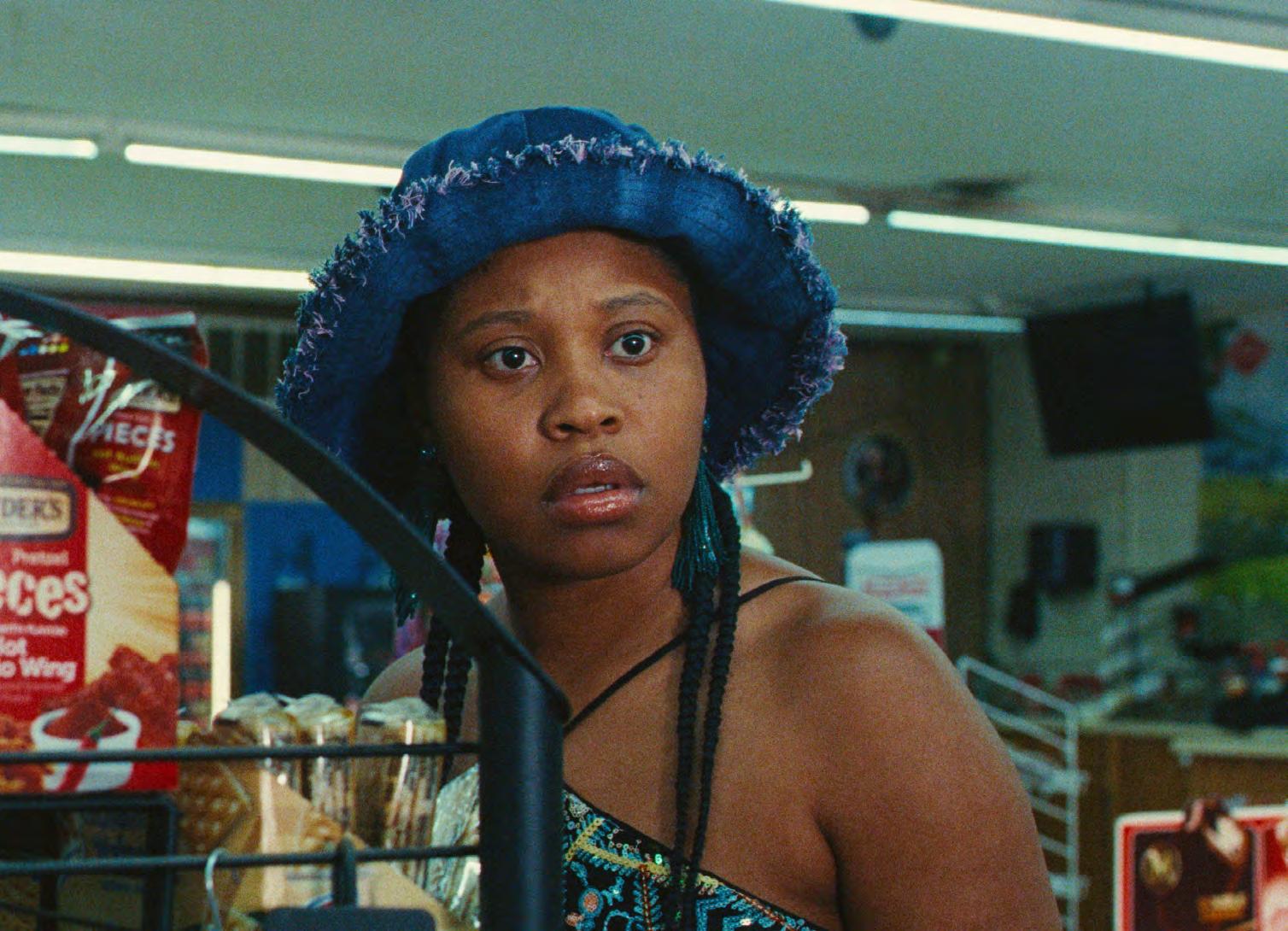
You got your start after basically googling ‘free acting classes’, and then you wrote and starred in a one-woman play in college. This sounds daunting. Yeah, I was 15. I have chills just thinking about it, but it wasn’t daunting. I started writing poetry when I was 12, and my mom used to say, “Wow, Dom, you came up with that by yourself?” And I’d be like, “Yeah.” She’s like, “That’s really good.” So, I always had a knack for writing, and then I found this theater company and just wanted to act. And in order to act with this company, I had to write my own stuff, which was great. I saw my first one-woman show there called No Child, where a woman became different characters right before your eyes. Eventually, the director Stephen DiMenna asked me to get up there and do the same thing. So, I wrote one
for my thesis to graduate from college called Subverted
It deals with the struggles of Black identity, right? What inspired this?
I was in a sociology class at Pace University—I was often the only Black person in my classes—and this white boy said, “If African American males and low-income communities dressed normally, they wouldn’t be stopped by the police.” And I was so mad. I was frustrated, and I was debating with him, and I was stumbling over my words, and I looked around and nobody could advocate with me because nobody came from where I came from. And I realized that a lot of people from my neighborhood don’t get to go to a private university. Because I had this opportunity, I then wanted to use
46 DEADLINE.COM/ AWARDSLINE
The Swarm actress shares how she manages to find the heart and humanity in the darkest of roles
WARRICK PAGE/PRIME VIDEO
it to tell stories like mine because I would be remiss if I didn’t. So, in the show, my character unpacks her own experiences, and it connects to the slave era. It goes back and forth between the slave and modern eras to show comparisons. I played between 20 and 22 characters.
You’ve cycled through heavy subject matter from Judas and the Black Messiah or The Last Days of Ptolemy Gray to Swarm. Do your characters ever come home with you?
I think they live in the body rather than in the head for me. I don’t think about them that much. And I do this thing where we can be doing a dramatic scene, and then they say cut, and I’m like, “What’s up?” I don’t stay in character. I’m not method in that way. It gets tiring pushing or wanting to be seen or prove that you can do something and waiting for that opportunity. But I saw that 11 years ago on Facebook, I wrote this post saying, “I heard six shots outside my window while I’m trying to sleep. No wonder why I run from bullets in my dreams. All I can see is my Brooklyn residency. Sunset Boulevard seems so far from me.” Because I knew I wanted to act. And now, seeing my face on one of the biggest billboards on Sunset Boulevard for Swarm is amazing. Manifestation is real. So, although I’m tired, I can only give thanks to God that my dreams have manifested themselves.
You were initially supposed to play Marissa (Chlöe Bailey, Dre’s foster sister) in Swarm before you were cast as Dre. Why Dre? And how did you advocate for yourself?
The role spoke to me because I’ve always loved Heath Ledger as the Joker in The Dark Knight, Charlize Theron in Monster and Hilary Swank in Boys Don’t Cry. And in telling me the idea of this story, not in these words particularly, but how they described this [concept] was all possible with one role, I said, “Man, I could do that.” So, when they told me they wanted me to play Marissa, I said, “OK.” But I already knew in the
conversation that I wanted to play Dre. And I was going to tell them, “I appreciate the offer, but I’m ready to tackle my own lead project. I’ve been supporting other people for a long time. It’s great, and I love to do it, but I’ve worked at this since I was 15.” So that’s the energy I had. When I wake up every day, I want to be challenged as an actor.
So, I got on the phone with Donald, and he said, “Well, tell me what’s going on.” And I said to myself, ‘Listen, after doing something like Judas and doing something like Transformers: Rise of the Beasts, what do you do next? How do you not catch up to yourself? I don’t want to even predict the type of roles that I want to do next. I want to go back to that inner child, that younger Dom that watched everything and said, I want to do this, this and this, and didn’t put limitations on what she wanted to do.’ And that’s how I approached it with him.
Donald basically said, “Well, if that’s the role you want, that’s the role you get.” And I was like, ‘Did he just give me the role?’ It was no audition after that. And it was nice not to have to prove myself because I knew I had done these different projects, and I’m like, ‘I can do this.’ And I’m glad I didn’t have to put on a show to show I can do it because I feel like if I had done an audition, sure, it would’ve probably gone well. But I got to tap into Dre because there was ownership.
Dre has some quirky physicality in the way she binge eats after killing or the intense way she
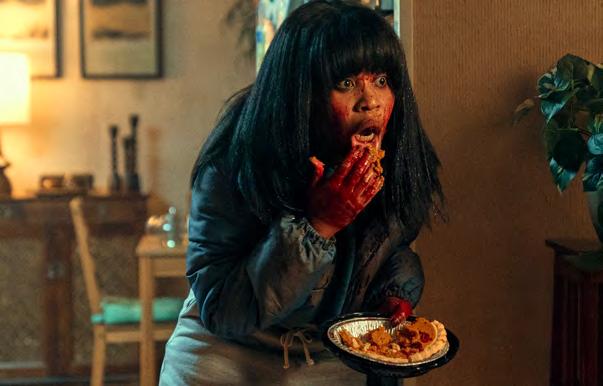
stares at people. How did you come up with her traits?
That was so fun. It was me being like, ‘OK, she’s emotionally stunted. What does that mean?’ I felt like when she’s asked questions, she probably mimics Marissa. So, if somebody says, “Marissa, how you doing?” She’d be like, “Girl, I’m tired.” And then Dre would try to copy that, but she has to search her mind to try and say the right thing at the right time. She doesn’t have a poker face. So that means everything, like when a guy touches her in episode three at the gym, she’s like, “Why are you touching me?” it became just allowing her to be impulsive and not too small. I just tried different things that were free and fun. I think I was dealing a lot, too, in my life with masculine and feminine energy and knowing that we all have both of those polarities inside and figuring out the balance.
A lot of times when I do a role, I’m questioning myself in mind and body, and Dre was no different. From the beginning of the show, she has this dark, sexy feminine energy. And by the end of the show, she has wounded masculine energy. In school, you learn how the character differs from the beginning to the end of the scene. That’s structure, but then everything in between is fair game. So masculine energy is structure and feminine energy is flow. And that’s how I approached this character in a structured way. I allowed myself to be influenced by what was actually happening. Dre has an opinion about everything. The way a chair feels, the way a table feels. Maybe she don’t like the texture of the chair, but if she
don’t like it, you’re gonna know. And that was fun to figure it out.
There’s a lot of discourse online about this portrayal of a Black female murderer, a character we don’t really see in media. Where did you settle on her as a person? Should we be sorry for her?
I approach all my characters the same way. And it’s heart first. And it’s me figuring out what it is. And for her, it was love. She loves Marissa and she loves Ni’Jah. And her love is convoluted. And I don’t know her love in that way, but I know what it means to love my sister and my family. And I think that’s universal for all of us. I never want to make a character just an unrelatable monster. In fact, I will do my very best to find the things that are relatable. This book I love, Auditioning on Camera: An Actor’s Guide by Joseph Hacker, talks about how a character will be what they are no matter what because it’s written that way. So, if a guy is a thief, you don’t have to play him slimy because he’s going to steal anyway. I read that when I was playing Darlene in The Deuce. I realized I don’t have to ‘play’ a sex worker. I don’t have to walk or talk like what we imagine a sex worker to walk or talk like, because she is that no matter what, because those are the given circumstances.
I come from humanity, heart and love, and all of the things that I believe we have to have as human beings. I never tried to play Dre as a scary serial killer that people are freaked out by. And it’s so interesting because people come up to me like, “Yo girl, you scared me. I couldn’t watch it with the lights out.” And I’m like, “Scared you?” And I’m almost jealous that I can’t watch it from that angle. The hardest stuff in acting sometimes comes when it’s the easiest direction, like, ‘She laughs’ or ‘She walks.’ Like in Episode 2, when the strippers joke about Dre having a dead body in her trunk, she laughs [awkwardly]. When reading the script, I’m like, ‘Well, we’re going to see how that laugh goes.’ And then I just throw myself into the moment. And I was really happy that people were responding to that laugh. It was freaky. A
DEADLINE.COM/ AWARDSLINE 47
Dominique Fishback in Swarm .
Evan PETERS
BY MATTHEW CAREY
A A A A
Evan Peters has played an assortment of twisted characters in Ryan Murphy productions, from a cult leader to the ghost of a murderer, not to mention a serial killer-turned-hotelier. But Dahmer - Monster: The Jeffrey Dahmer Story called on the actor to plumb new depths of depravity to embody a creature not of the imagination, but of grim reality. To portray the real-life serial killer, Peters channeled Dahmer’s distinctive Wisconsin accent and chillingly detached demeanor, going so far as to strap lead weights around his arms and pack weights into his shoes to capture Dahmer’s robotic physicality.
How did you get into the mindset so that you could play this character convincingly? In some ways you’re really underplaying him. It was really just doing as much research as I possibly could on the case, finding out the facts of the
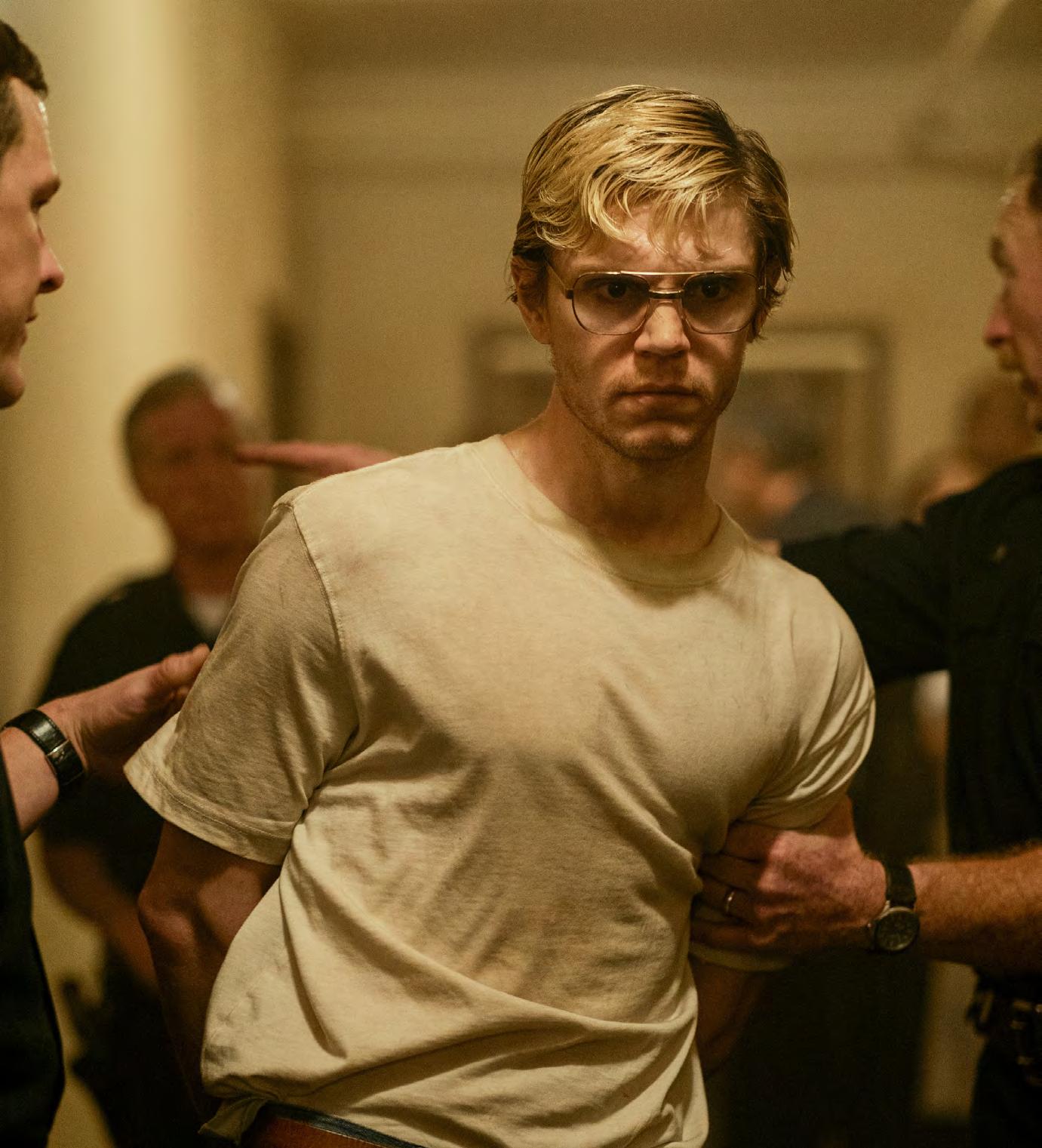
48 DEADLINE.COM/ AWARDSLINE
The star of Dahmer - Monster: The Jeffrey Dahmer Story is moving out of the darkness
NETFLIX
A
case, timelines, really digging into that. It’s such an absolutely tragic and overwhelming case that one of the things I was really trying to do was get out of the way of it—let the facts and the writing and the series speak for itself.
One of unusual things about Dahmer was that he seemed to have a kind of perplexity about his own behavior.
One of the keys to unlocking the character was that, from all the research and interviews, you do see that he has a form of regret and really a confusion about why he even wanted to do what he did, his understanding that it was wrong and his struggle with it and self-medicating with alcohol, and ultimately choosing to cross over the moral code that we all have and to commit these atrocious acts. It was really a deterioration into a compulsion, mixed with his worsening alcoholism. He just completely lost himself and couldn’t control it anymore. He’s definitely confused about why he even wanted to do that.
Were there particular scenes in the series that were the hardest to shoot?
They were all hard, but I think Episode 6 [about Dahmer and one of his victims, Tony Hughes, a Deaf aspiring model] was a very difficult episode to shoot, just very affecting emotionally for me as a person.
There are actors who have taken on really scary roles like this, sometimes based on real people. You’re unusual in that you’ve been willing to do this more than once. I think most actors would say, “I’m going to do this one time. Never again.”
Prior to reading this series, I said, “All right, I’m going to take a break from playing the darker characters and really explore the light.” And then, of course, I read it and the writing was brilliant and very careful to show many different perspectives, not just Dahmer’s—trying to illuminate how the system tragically failed the victims’ family members, neighbors who
tried to sound the alarm, because of prejudice. I was in a state of stunned disbelief after I read it and continue to be. I just felt really compelled to do it because I didn’t know the case, I didn’t know any of the details. I felt changed by it and I sincerely hoped that some good would come out of it if people watched it. So, that’s why I signed on to do this one. I said, “OK, now this will be the last one.”
There’s a kind of blankness to Dahmer. Yet, as the lead in a series, by definition you have to be compelling, otherwise no one’s going to be drawn into it. How do you remain true to this character who is not flashy, but make it compelling?
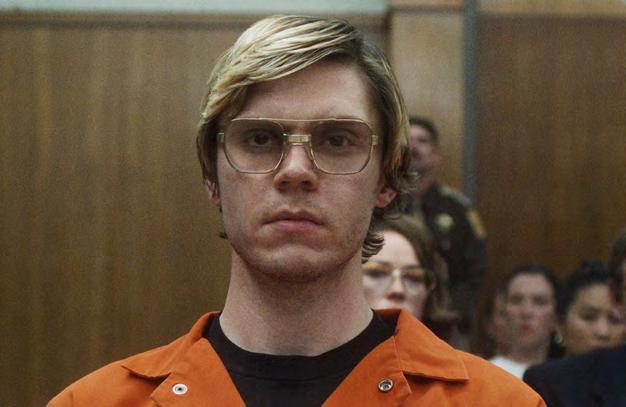
That was definitely a challenge. I felt like the way Jeffrey Dahmer reacts in a situation is completely different from how you or I would react. His emotions, in a lot of the footage that you see, he does seem to be fairly affectless. Even when he is speaking about regret, it seems to be a fraction of what you or I would be expressing or feeling. Again, a detachment from what he was doing. It was really trying to remember that a lot of that footage and things that you read, was after he was arrested and he’s medicated and not drinking. So, it was almost a case of working backwards from there… It was a lot of exploration with all of the directors in having the emotion and then swallowing it, then seeing how it bubbled up, and being surprised by that and where it came out. That was something that we felt was right
for a lot of these scenes. There was another element to it as well, that there’s a private Jeffrey Dahmer and a public Jeffrey Dahmer. How he’s acting behind closed doors is completely different from how he’s acting in front of a camera for the interviews or the detectives interviewing him, or even for that very short home video footage online of him where he seems completely normal—quiet—but very, very normal.
It was just exploring that as well, being very specific about the relationships with all of the people in his life and the lies that he was telling them to hide the private Jeffrey Dahmer.
You’ve had a long association with producer Ryan Murphy. What do you think he saw in you when you were a young unknown actor?
According to him, he saw that I resembled Jessica Lange slightly, and that was the real reason he cast me in that role [Tate Langdon opposite Lange’s Constance Langdon in American Horror Story: Murder House]. I really don’t know. I just know that I really love working with Ryan Murphy. I find him to be an incredibly caring, loyal and collaborative creator, director, producer. He gives you the freedom to explore and take risks and do your work, do your process, all the while being there to help and give his input, which, by the way, is usually 10 times better than anything you could have ever thought of. You’re sitting there listening and watching, going, “Yes, please, give me more ideas.” I
feel very, very, very grateful that he gave me that initial opportunity to work on Horror Story and continues to give me opportunities.
The Dahmer shoot was quite lengthy, around six months. How do you decompress from something like that?
It’s just like running a marathon. You see that finish line and you’re just giving everything to get there. And then once you’re there, you just let it all go. You have to try to decompress and that’s of course easier said than done. I think that it’s hanging out with family and friends, going back to St. Louis. Throughout shooting and four months prior to shooting, you’re putting all of this case in your mind, in your being. You’re absorbing all of this really tragic information. It was really just a matter of changing that and starting to put in some comedies or lighter music and trying to think about other things.
In Mare of Easttown you really got to show another side of your talent, playing quite a sweet guy, the detective Colin Zabel, opposite Kate Winslet as Mare. Was it a bit of a relief to play someone lighter?
It definitely was. It was also terrifying because you’re working with Kate Winslet. It was really a dream come true. I still really haven’t fully processed that we were able to work together and have scenes together. It was just such a surreal, amazing experience. I’ve said it before, but she really exceeded every expectation. I learned a lot from her, and I really looked up to her and I try to channel her, like, “What would Kate do?” Incredible endurance and a great leader and kind person and really the gold standard. Again, I was terrified to work on scenes with her but quickly found that she was very welcoming and warm and amazing. But I was still terrified to do the scenes, to get them right, because she’s also one of the best, if not the best actress that there is. It was an incredible amount of pressure, but yeah, it was really nice to just play somebody who was normal. A
DEADLINE.COM/ AWARDSLINE 49
Evan Peters as Jeffrey Dahmer.
Elizabeth DEBICKI
The Crown ’s Princess Diana on searching for her narrative in a sea of subjective views
BY RYAN FLEMING
A A A A
When Elizabeth Debicki auditioned for a minor role in The Crown, the thought that she might one day play Lady Diana Spencer didn’t even cross her mind until the show’s casting director planted the seed. Now, marking her second season in the Diana-verse, she’s paired her talent and passion for research to embody the troubled royal. Following Emma Corrin’s Emmynominated turn as Princess Diana earlier in the show, Debicki’s version of the people’s princess starts out much less hopeful— after an upsetting second honeymoon, it becomes impossible for Diana to ignore that her marriage to Prince Charles is failing.
How did you get involved with
The Crown?
I auditioned for a small part in Season 2, and I was in London doing a play at the time. Robert Sterne, the brilliant casting director, was holding auditions, because as you know, there are so many cameo parts in The Crown I went in and auditioned for it, and did not get that part, but they saw something Diana-y in the audition, unintentionally. So, a combination of me doing bad acting and somehow good acting at the same time.
They called my agent, saying, “Not that part, but we’d like to keep her in the Diana-mix,” which was
about 4,000 years down the road. So, I thought, ‘Oh, well, better luck next time.’ I had hoped, as one does, especially in the beginning of your career, when people say things all the time. They would say, “You know what? You would be amazing in this or that,” and there’s a piece of you that hopes it’s going to come to fruition. But you don’t really let yourself believe it, because then you’d be constantly shattered by a sense of rejection.
I probably told my sister about it at the time or something, but then about four or five years later, they actually came back around, and they said, “Oh yeah, you’ve always been the
person that we had in mind. Would you be interested?” By that point, Emma [Corrin] had already been cast and they had begun to shoot Season 4 Diana. I remember hearing about Emma being cast, and thinking, again, ‘Oh well, better luck next time.’ Because I didn’t know how many seasons they were intending to do. That’s how it happened. It’s a strange road to what has ended up being the most amazing job of my career, and yeah, did not see it coming really, although I had hoped it would come.
When you were auditioning, did it even register in your mind that this would lead to playing Princess Diana?
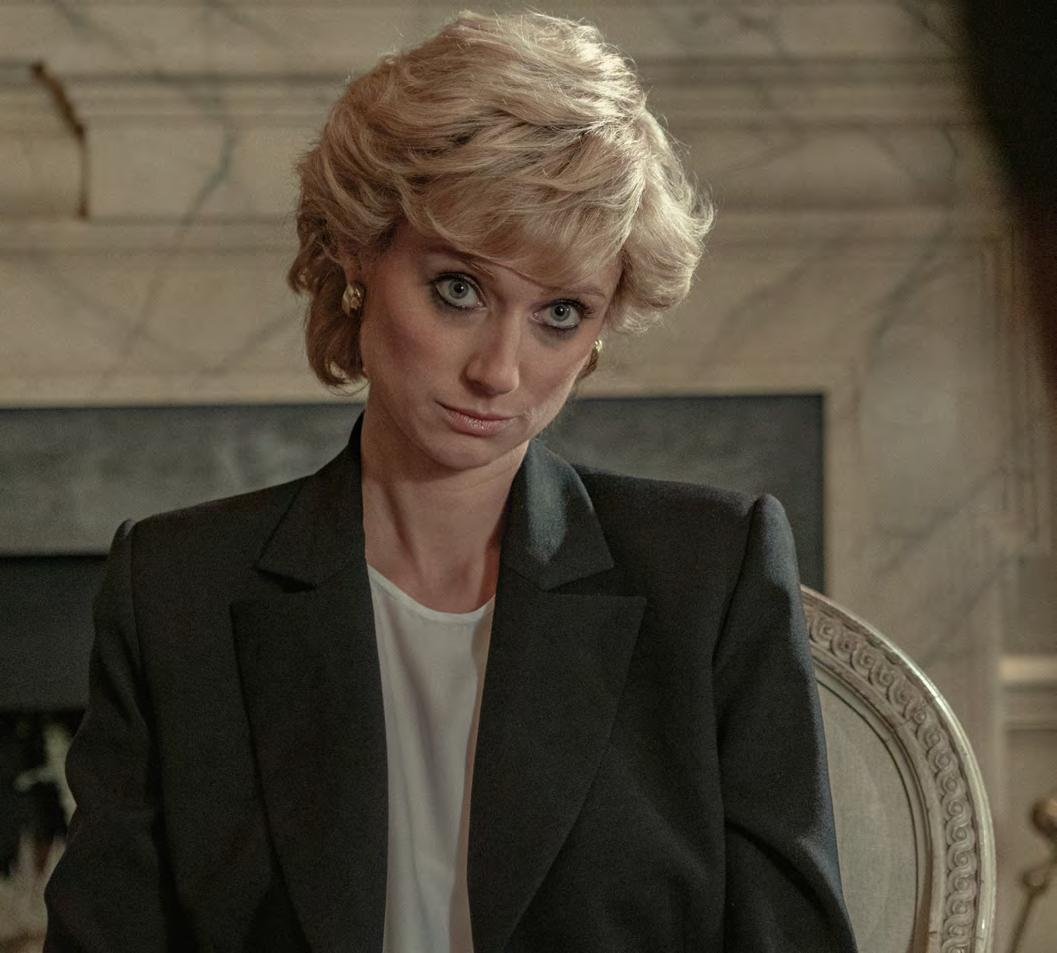
No. I’d never tell anyone what the role I auditioned for was, because the person who ended up playing it was amazing. Also, I was so physically wrong for that part. I was really confused that they had even asked me to come in and read. But my agent was absolutely right, as she always is. Hylda Queally is always right, have it
on record. She said, “Just go in and do it.” Because Season 1 had just come out a week or two before, and I had binged the whole thing. My friend Vanessa [Kirby] was playing Princess Margaret, and it was like this huge television event, Season 1 of The Crown. It was so lush and beautiful and expensive, and everyone was doing such good acting. I was like, “Holy hell, this is the best TV I’ve ever seen.” When they said, “Come in and do it,” I said, “Absolutely.”
Did you watch Emma Corrin’s Diana portrayal before you started work?
Yes, that’s the really unique thing about this show, which is kind of an extraordinary thing to do. But also, I would be lying if I said it didn’t add a layer of pressure onto the actors who come in after, because everybody is so good in the show. It’s like a baton pass. And what they did was so beautiful and nuanced and had this openness. I also immediately could see that the two of us were going to be playing very different eras of this character, and that there was going to be a severing in terms of just chunks of history, or an essence of an era.
One was definitely going to feel younger and in the ’80s, and all the history and memory we have associated with that incarnation of that character. Then I was going to pick it up and it was going to feel like a page turn, like a different chapter. That helped me understand my task in a way as well, because I am older than Emma. And I knew that my Diana was going to have a slightly different load on her shoulders, if that makes sense.
In trying to recreate a reallife character, what was your research process like?
It was extensive, and it was definitely the most research I’ve ever done for anything, and may ever do for anything. It was driven by both fear and curiosity, a winning combination for extensive reading, and also facilitated by the Archival Research Department. I was in Australia at the time, during Covid, and I got on a Zoom with this amazing woman named Annie who runs the research
50 DEADLINE.COM/ AWARDSLINE
KEITH BERNSTEIN/NETFLIX
A
department. And Annie is a very straightforward New Yorker. Annie said, “How much do you want?” And I said, “Just give me all of it.” And she gave me this look like, “OK.” Then lo and behold, some enormous UPS truck comes to my house in Australia, and it was full to the brim. It was books, it was research, it was just printouts from the archives… Don’t worry, I recycled all of it.
I just sat there with my highlighter on the couch in the blazing hot Australian summer. I just worked my way through it. It was a joy really, because I’m a research history nerd. It’s very natural for my brain to want to be very thorough with that more analytical side of research and character. Obviously, there’s also hours of video archive. In the end, it was a combination of understanding the structural factual framework that the series was going to take.
For the second honeymoon episode, there’s all this very factual research. Which is the tent pole that the then imaginative interpretation is hung on. I let myself understand the framework quite deeply, so that it would inform the psychological journey. Then I just watched a lot of footage really, because obviously a part of doing The Crown is trying to embody the essence, the physicality, the vocal impression of the person. That just takes a long time for me to get, because you can’t really rush it, because then you’re probably going to be reaching for it. I knew that I had to pull out all my little nerdy stops, and really do my homework, because on that first day it was pretty terrifying. If I hadn’t layered in all that research for a really long time, I think I would’ve felt a bit lost. But I didn’t, I did my homework.
When you’re watching these videos, what were some of the important mannerisms or idiosyncrasies that you needed to learn to play Diana?
Well, I think for all these characters, it’s quite interesting because we have so much footage of them. As soon as you get into the ’90s, there’s just that 24-hour news cycle that really got filled up by so much royal news. If you ask a normal somebody on the street,
“What does Princess Diana look like when she speaks? Or what does Charles do with his body?” People can do a mirroring, it’s very deeply in our collective consciousness. Obviously one of the things for Princess Diana, was the way that she moved her head, and the way she looked at people. So, that was the most obvious place to start. But then it’s also mapping the body through space. As an actor, you have to think, ‘I can see there’s a shape in the body that is something that we recognize as belonging to this individual, but why does this person move through space like that? What’s the psychology behind it?’
I think to this day, the royal family are still plagued by ‘body language experts' being like, “This is why they put their hand in this pocket. This is why they get out of the car on this side.” Because when people are that much public-facing, when they’re being viewed so much, I think it’s natural that the body learns how to navigate that very unnatural experience of being looked at by thousands of people all the time. It’s just something that your body would do to protect you from that gaze. It’s a whole bunch of that—figuring out and imagining why. Then, of course, you have to start to practice it so that it feels natural. The same thing goes for the voice as well because, as a viewer of The Crown, one of the things I always found really satisfying was how accurate the dialects seemed to be that all the actors were doing.
Especially when you go back into the olden days of The Crown series. It’s such a funny pleasure you got out of thinking, ‘Oh my God, did people really speak like that?’ And then you
go back and you find archival footage of Margaret or someone addressing something and you realize that really is how people sounded.
As you’re talking about this ’90s media cycle where Royals were covered all the time, there were many people, tabloids or the royal family that wanted to push their own narrative of who Diana was. Was it difficult to find the ‘real Diana’ in your research?
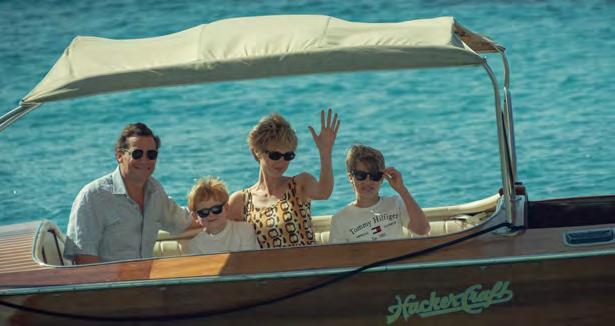
It is difficult. And I think in the end, no one would know who that real person was except her and probably her boys and Charles, and people who were very intimate with her. My avenue to trying to get close to that was a combination of things. One of the things I learned very quickly was when I tried to read books written about her, even by people who had been very close to her, people who had worked for her or friends... At a certain point of reading it, I always shut the book angrily, slammed it shut, and thought, ‘Well, you can’t say that.’ Every book has a subjective viewpoint, or they’re trying to sell a narrative.
Funnily enough, the real Princess Diana really attempted to push back against the other narratives that were being pushed into the media by trying to be as close to the source of the information about her as possible, whether that was a collaboration with Andrew Morton on the book or the Panorama interview. Those things are very interesting entry points into where that human may have been at that time. Obviously, take into consideration, like with the Panorama interview, all the tragic information that came to light afterwards, realizing how manipulated
she was and how strained the arrangement may have been and how that could have been transforming her point of view on certain things. So, you need to listen to it, but then understand the events that were affecting it to understand maybe different layers of it.
Is there anything that you learned while portraying Diana that you think is going to stick with you for your next performances?
It’s taught me a lot because it was very challenging. It’s definitely the most complicated acting task that’s ever been put to me. All the layers of it are quite extreme in a sense. Here’s an excellent show that’s been running for five seasons and it has this amazing built-in audience. Before you have come all these extraordinary actors and you’re going to play the most famous and beloved woman that’s ever lived, and off you go. And you think, ‘Oh my God, how on earth do I manage this?’ I think the level of that challenge and the length of shooting, it was over just two years of making it, is a combination that definitely teaches you as an actor how to let go of a lot.
There’s a lot that you learn to just release, it’s quite freeing. You just think, well, I’ve done my best at that and now let’s move on to the next scene and let’s just flow a little bit. Because if you’re trying to mentally keep all the pieces together, you just couldn’t.
What’s next for you? Are you working on anything currently?
I actually just wrapped on another thing that I was shooting. I was playing a part in MaXXXine, in the Ti West X trilogy. It was just so far from what I’ve been doing on The Crown, but just a joy as well. Acting is acting and I love doing it. I really feel so grateful when I get to go to work. That is the honest truth. Even just jumping onto Ti’s set for a second and just a totally different world with different people and just thinking, ‘I feel very fortunate to do what I do.’
I’ve also got a few little things simmering. I think I might just take a wee little rest because it’s been a long gig. I always say I’m going to do that, and then 48 hours later someone sends me a script and then I’m like, ‘OK, I’m going to Iceland.’ A
DEADLINE.COM/ AWARDSLINE 51
From left: Dominic West, Teddy Hawley, Elizabeth Debicki and Timothée Sambor.
Keri RUSSELL
The Diplomat star on seeing the dark humor in U.S. politics after a bad day in the foreign office
BY KATIE CAMPIONE
A A A A A
Keri Russell broke out in the late ’90s as a young woman finding herself in New York City in her first awarding-winning role, Felicity . In the years since, her genre-spanning career led to her turn as a KGB spy on The Americans , which earned her three consecutive Emmy nominations. She’s now following that up with another political drama, The Diplomat , in which she plays the U.S. ambassador to the United Kingdom, a woman who is trying to set the world right while dealing with her messy marriage situation. Russell discusses the mundane realities of the State Department and finding humanity in powerful people.
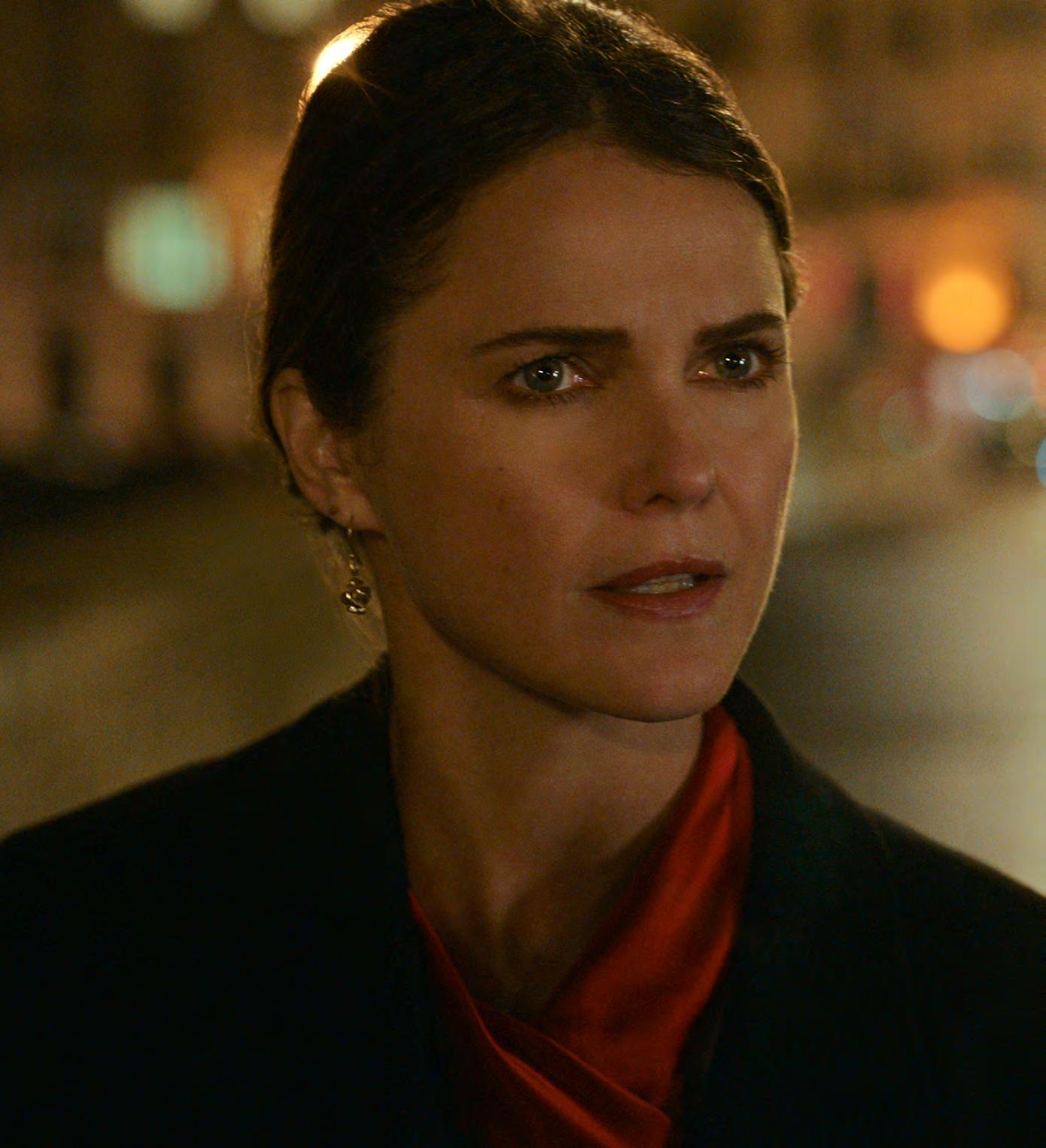
What led you to follow up The Americans with this?
A lot of things, I guess. I mean, one, it has been enough time. There was a nice break in between. I think I just hadn’t read something quite like what Debora Cahn had created. It’s just such
52 DEADLINE.COM/ AWARDSLINE
ALEX BAILEY/NETFLIX
a messy mix of smart political jargon and then that whole world that is really interesting of the State Department and the Foreign Service, but mixed in with Debora’s really specific brand of humor involving the minutiae of everyday life. This character that she created, it’s just fun and good. It’s as simple as that. For me, signing on to TV shows, I already have three kids, so it’s like, I’m busy enough. It’s like having three more kids to sign on to a television show because it’s such an uphill climb. You have to be up for the sprint of it and know that you can take some time off after. So, you have to really love it. I just thought it was fun.
She is a very specific character, and although she is in this position of power, she has no interest in being an inspiration for other women. How much of her character was written on the page versus what you brought to her?
A lot of her specificity was written on the page. That first episode that I read, the discomfort and the sweating, and the social awkwardness at times, that was definitely implied, if not explicitly written. I think one of the more complicated things about this show, and I guess one could say we’re still figuring it out, is really the tone because it could go so many different ways. But to me, where the tone was, starting about episode 3, I think it is really where it lives. It’s not for everybody, but I find it very enjoyable. I like that it’s someone who can be really smart and know their shit and then also be a total train wreck in their own relationship, and be mean and be a baby and be wrong and all those things people are. I don’t think one disqualifies the other.
It also adds a bit of humanity to these people who are in huge positions of power.
Completely. I don’t want to put words in Debora’s mouth, but I have heard her say it—this was her love letter to the State Department. Yes, these are incredibly powerful people managing governments throughout the world, but you can still have a shitty day or you can still be asked to make this monumental decision, but you haven’t
eaten for 10 hours. So you’re cranky, and someone just needs to get you a granola bar, and things will look up. These people are so busy, like they just have so many people running their lives and their schedules on a daily basis. I personally hate that. I don’t like anyone around me. I just had my kid’s seventh birthday party, and I needed to go lay down after being around that. It’s stressful for some people, especially just being in such a public-facing position, where it matters, every single thing that you do and what you wear, especially for a woman. That stuff is hard. So it’s fun to get to play with that.
Your work with Rufus Sewell is so specific. It feels like a roller coaster at times. How did the two of you nail that emotional turmoil in the onscreen relationship?
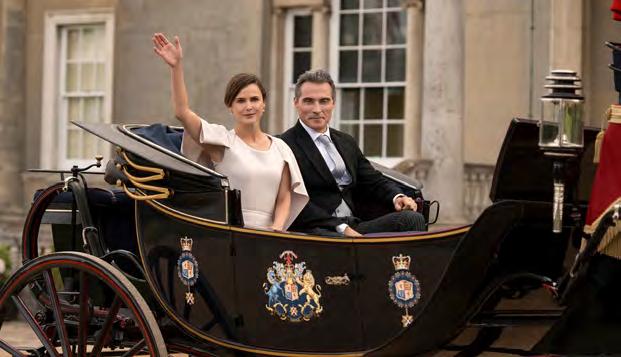
There’s a great line that Rufus’ character Hal has, I think it’s the first episode, where Stewart’s questioning him like, “Are you getting divorced?
The ambassador tells me that you’re getting divorced.” And then his response is, “Have you ever been married?” I think that’s the point. These people are insanely connected to each other and respect each other immensely and get each other going in every way. But they want to kill each other too, because it’s a lot of energy between them. It’s not always for the best. But how do we nail it? I don’t know. It’s really in the writing. It either works or it doesn’t. I don’t think it’s something that you can work at. From day one, we were like, ‘Oh, this will be fine.’ He’s just a total pro and he’s good, and he’s there
to work. He doesn’t bring extra bullshit to it. He is delighted in everything that I am delighted about the scripts. So, it’s just like a grown-up, great working relationship.
I have to ask about that scene where you tackle him in the gardens. I was shocked, but I also was so satisfied. It definitely, at that point in episode 3, takes a real screwball turn. Much to my delight. It is bonkers in the best way to me. I love watching this person who is so on top of it… I feel like Kate’s entire job is to be in control and manage everyone. Get everyone into the dinner on time. Her whole job mom-ing everybody. She’s like the mom to the world. And you know what? Moms are calm until they’re not. And he broke her. And then she had to break.
To be fair, I think we’ve all had moments where we wish we could tackle someone. What’s amazing is Rufus as a person, he’s a very big guy. I am not a big person. We just looked at each other and said, “Are we just gonna do this? OK, let’s just do it.” I felt like he was the big brother letting the little brother just go for it so that the little brother didn’t hurt themselves. I was just going crazy. We were laughing our heads off. They did have stunt doubles, and I’m sure they would have done it, but we just didn’t want it to look slick or rehearsed or choreographed. We wanted it to be very uncool, like slapping and ridiculous and desperate and stupid.
Your characters in both The Diplomat and The Americans
are a lot rougher around the edges than Felicity, which is where you started and it’s a role that so many people associate you with. Was that an intentional trajectory?
I don’t think I plot it like that at all. I think it’s just whatever writing catches me. I really believe there are way better actors in the world than me. I tend to sit back and wait it out until there’s something that I really feel like I want to do, and I need to know that there’s some part of that character that I really understand and can do. I don’t go, “Oh my gosh, I’d love to be in that movie. Just give me any part.” There’s no fucking way I’d do that. I have to really innately know something about the character or feel like I can move around in it. Otherwise, I would be bad. I’m positive. So for me, it’s the writing. I think every once in a while something just catches me and this time it was [The Diplomat].
The end of Season 1 is pretty insane. How did it feel leaving the audience in that place?
Crazy. I was totally surprised too. But Debora is such a veteran. She’s been doing this forever. She’s such a pro. She knows what she’s doing. I’m assuming she had that plan for a while, but I was completely surprised.
Since we know that The Diplomat has been renewed, what parts of that character are you excited to explore more in Season 2?
To me, I just love all the simple stuff. I really love the human behavior stuff. That’s what I find the most interesting. A show needs the bigger sweeping plot point things, but that’s not what gets me going. To me, it’s a really good dramatic fight scene with Rufus or a really funny scene. There was some scene [in Season 1] where I walked off the plane and had to take Clorox wipes to wipe down myself because I was so hungover. I like that fun, weird stuff. I don’t know. I’m just getting to this really grateful point in my life and career where I haven’t always enjoyed being in this business. I didn’t grow up wanting to be an actor. I fell into it, and so I haven’t always loved it. I’m really enjoying myself on this one. A
DEADLINE.COM/ AWARDSLINE 53
Keri Russell and Rufus Sewell in The Diplomat .
Choreography
Musical Moves
Choreographers Jamal Sims , Sonya Tayeh and Christopher Gattelli drive the narrative through motion
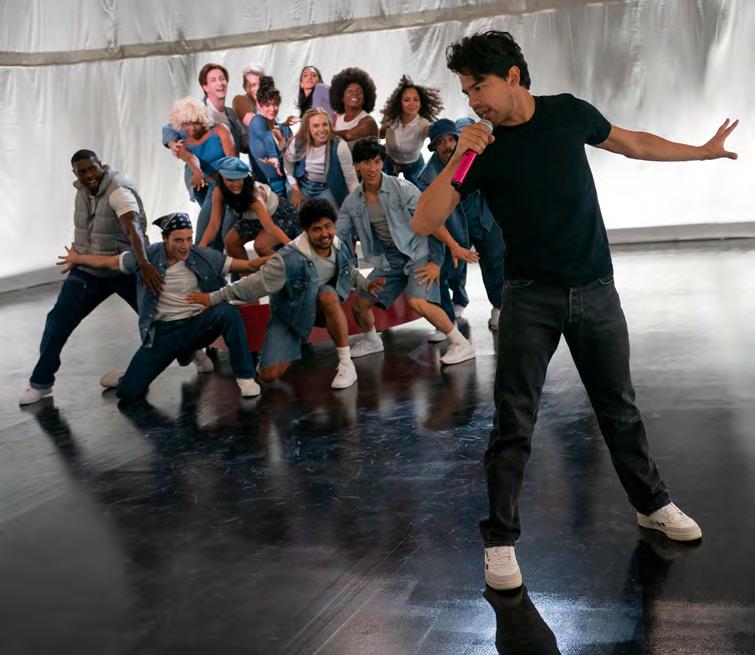 By Ryan Fleming
By Ryan Fleming
Singing is essential for telling stories in a musical, but the choreography makes up the visual component that allows the narrative to unfold in front of our eyes. This Emmy season has a number of musical series and specials, and the choreographers are in charge of visually driving those stories forward.
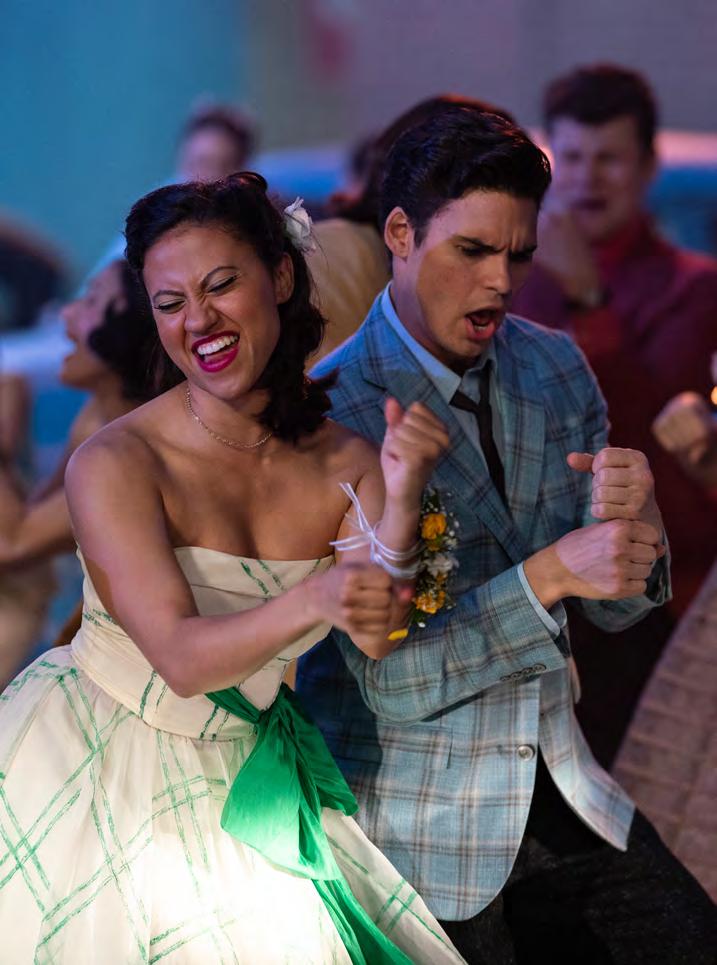
Grease: Rise of the Pink Ladies expands the universe of the 1978 film and brings a modern touch to the ’50s. Based on the stage musical of the same name, Up Here brings a motion-based narrative to inner thoughts. And inspired by musicals from the ’60s and ’70s, Schmigadoon! takes a dark turn in the land of Schmicago.

54 DEADLINE.COM/ AWARDSLINE
CRAFT SERVICES EDUARDO ARAQUEL/PARAMOUNT+/APPLE TV+/SARAH SHATZ/HULU
Grease: Rise of the Pink Ladies Schmigadoon!
Up Here
Grease: Rise of the Pink Ladies
While the show is not a remake of the original Grease film, choreographer Jamal Sims views Grease: Rise of the Pink Ladies as an extension of what’s already been developed. “There’s some modernisms in there,” says Sims, “but it’s not totally modern because I really wanted the ’50s to come through.”

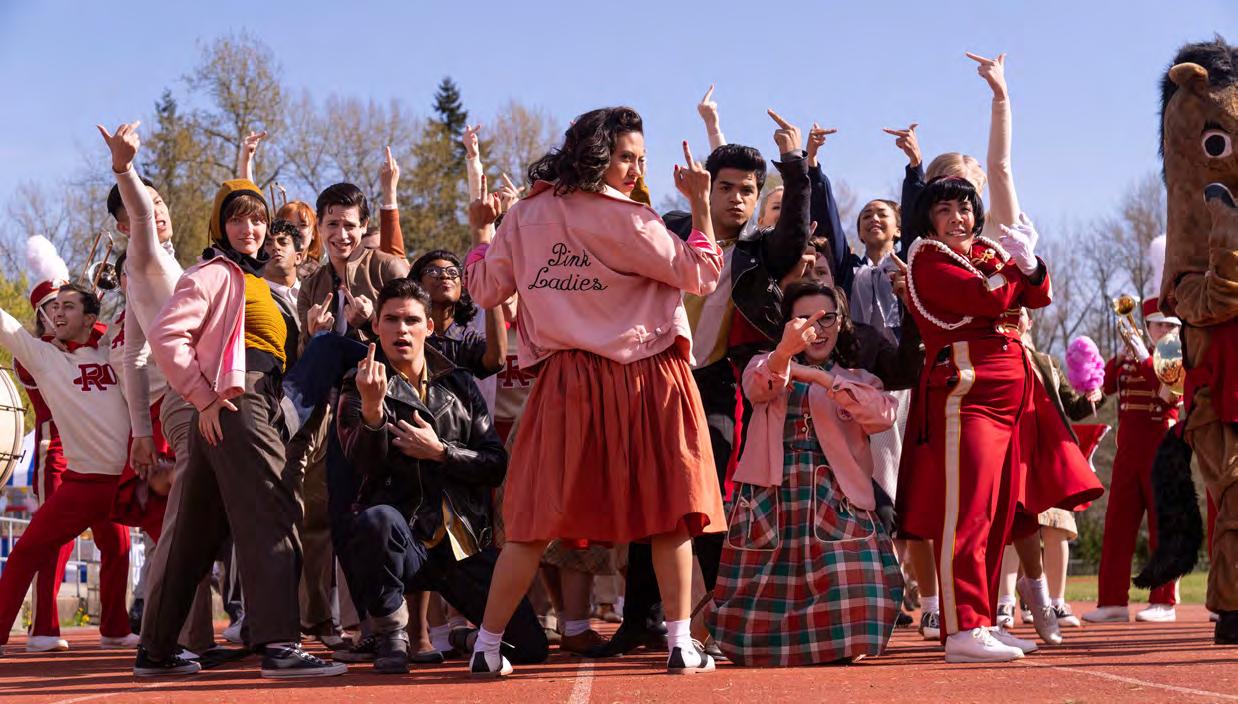
Grease: Rise of the Pink Ladies takes place four years before the original film’s events and follows the beginnings of the girl gang that would usher Rydell High into a new era. Sims took inspiration from the choreographer of the original film, Patricia Birch, who he says was “in my bones” during the production.
“I knew every step from the original,” says Sims, “so I felt like when I was coming up with material, there were ‘isms’ that Patricia would put into her choreography that I would infuse into my choreography.”
Though Birch served as a jumping off point, Sims wanted to make sure that the audience didn’t feel like they were getting more of the same. “I wanted to pay homage to her, but I also wanted to feel like it was fresh and new. I would call it ‘ Grease it up’, which means it wasn’t too perfect because these are real kids dancing.”
Sims’ approach meshed well with the intention of showrunner Annabel Oakes and director Alethea Jones, who wanted to make sure that each character would stand out. “We always keep our characters in mind and always fill the frame,” Sims says. “No matter where they are or what they’re doing, I always want to make sure that their character’s story was involved.” Even though a song begins, each story needs to continue. “Just because they stopped talking and they started singing doesn’t mean that we just stop everything. We’re still telling the story, and everybody still has something to do because their characters are still on a journey.”
The most challenging number of the season was “World Without Boys”, which Sims says he “blocked out” because it was so difficult. “Our visionary director Alethea Jones, came up with this idea that we were going to shoot the whole thing in reverse, so the dance is in reverse,” he says. Sims initially thought this would only be a challenge in choreographing a dance that looked good in reverse, but soon realized a bigger issue. “I didn’t really think about how they’re lip-syncing, so the lipsyncing has to go forward while they’re going backwards,” he says. “We decided that we were actually going to choreograph backwards moves, so that they could lip-sync while they were going.”
DEADLINE.COM/ AWARDSLINE 55
“Pointing Fingers”
“A World Without Boys”
Choreography

Up Here
For Up Here , choreographer Sonya Tayeh never felt constrained by the original choreography of the musical. “We didn’t talk about the stage production much,” Tayeh says. “It felt really fresh delving into how it would resonate on film.”
Up Here follows Lindsay (Mae Whitman) and Miguel (Carlos Valdes), a pair whose greatest obstacle in life is their own inner thoughts. As Lindsay struggles to become a writer and Miguel tries to rise in investment banking, they both have to deal with a trio of antagonistic voices in their heads. “The fear that those scary monsters in your mind, those traumatic experiences from your past that creep up into scenarios of stress, or taking a risk, or falling in love… those things are the root of the story,” Tayeh says. “That was my inspiration—what does it feel like to unlock that fear?”

The best example of this is “I Am Not Alone”, a song where Miguel is stuck in a bathroom and singing about opening himself up to love. “The walls of his heart that have been closed off are breaking down, and that’s what the dance conveys—a melding and a waltz with words and the body.” To replicate the idea of walls being broken down, Tayeh asked the production designers if they could take the walls of the bathroom down as part of the choreography. They could have created a way to automate the walls moving, but she says it wouldn’t have felt right. “What’s so beautiful about the show is the emotionality and how tactile it is that the mind of Miguel is what’s breaking the walls down, so we used our incredible ensemble. That was a really challenging piece to mock up.”
Choreography was a large driving force in the narrative of the musical story, which Tayeh says is often overlooked. “I think dance gets underestimated and misunderstood,” she says. “When you’re in a musical and you’re singing the narrative, the movement is also singing the narrative in a different way.”
Tayeh is by no means discounting the importance of the songs, but she believes that the movement is an amplification of the singing. “When you’re singing and the body starts to move, you can almost hear the words like they’re in bold and capitalized,” she says. “You hear them deeper because the body is in motion conveying what the words are saying, which I think is beautiful.”

56 DEADLINE.COM/ AWARDSLINE
PATRICK HARBRON/SARAH SHATZ/HULU/APPLE TV+
CRAFT SERVICES
From Top: Carlos Valdes as Miguel in “Tiger Shark”; Mae Whitman as Lindsay in “So Many Ways”; Whitman and Valdes in “Signs”.
Schmigadoon!
Coming into its second season, Schmigadoon! took inspiration from musicals in the ’60s and ’70s, which choreographer Christopher Gattelli was very excited about. “It’s so much fun to have a whole bunch of new choreographers to pay homage to,” he says. Growing up with musicals during the time of Bob Fosse and Michael Bennett, he says it was a great opportunity to “dig back into their work and get to play with that.”
This season of Schmigadoon! sees Melissa (Cecily Strong) and Josh (Keegan-Michael Key) searching for a return to the fantastical land of Schmigadoon, only to find themselves in the much darker locale of Schmicago. Gattelli says they took inspiration from shows like Cabaret , Chicago , Sweet Charity , Annie and many more. “Once you start to talk about inspirations, it goes off in so many different branches because it was such a great time for theater.”
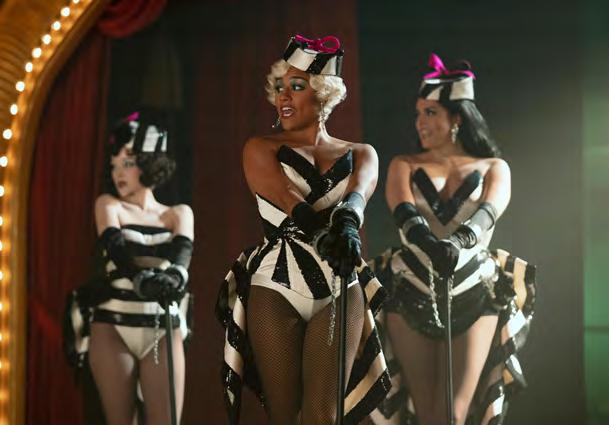
One of the biggest changes this season was in how the numbers were filmed. “The camera angles and the way things were shot in the ’60s and ’70s started to get more experimental,” he says. Whereas
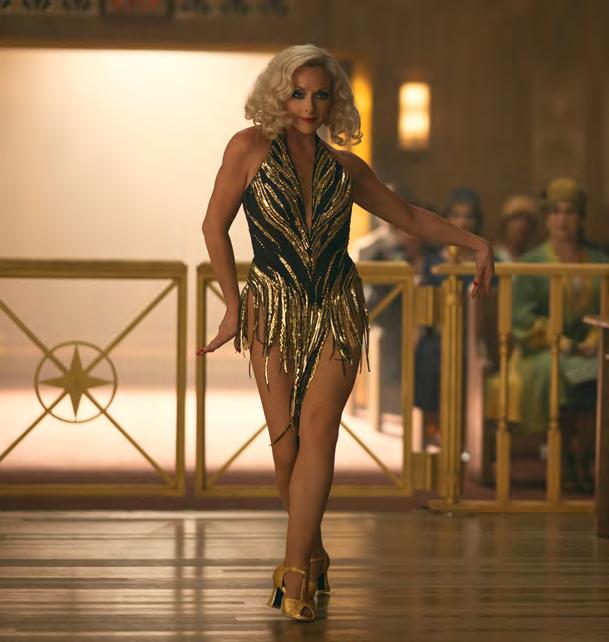
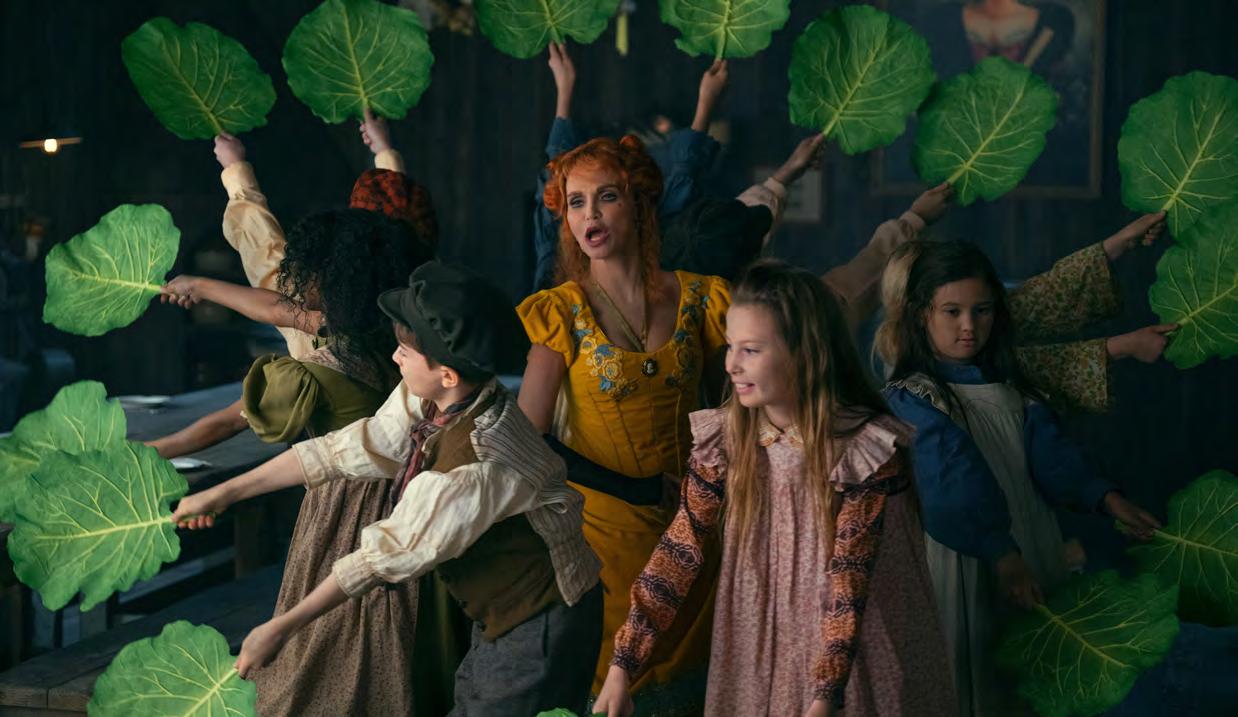
inspirations for the first season, like Oklahoma! , focused on more wide, continuous shots, this season took an approach that made each detail of the choreography more important. “Fosse especially played with a lot of camera work, in terms of isolating a dancer’s foot, or their face, or a wrist snap. It’s just a great eye for detail in terms of wanting to tell a story.”
Fosse’s choreography was so ingrained with musicals of that time period, that Gattelli says he needed to have some homages. “I think the iconic thing is Fosse with his jazz hands,” he says. “It’s very iconic, just the physicality of the position.” With a series that takes inspiration from many different places, it was important for Gattelli to include his own flair. “You try to check all the boxes for everything people are going to feel familiar with, but not lift it completely.”
Since closeups and experimental shots were used, Gattelli says their scheduling became more efficient as dance numbers did not need to be filmed all at once. “Because of the different camera shots, we were able to go in and plan the days,” he says. “We did a lot of pre-production. It was really shot out of order for the most part because we were trying to be efficient with getting as many awesome, different viewpoints for the numbers.” ★
DEADLINE.COM/ AWARDSLINE 57
From left: Jane Krakowski in “Bells and Whistles”; Dove Cameron, Ariana DeBose and Cecily Strong in “Bustin’ Out”.
Kristin Chenoweth in “Good Enough to Eat”.
Portrait Gallery / Drama
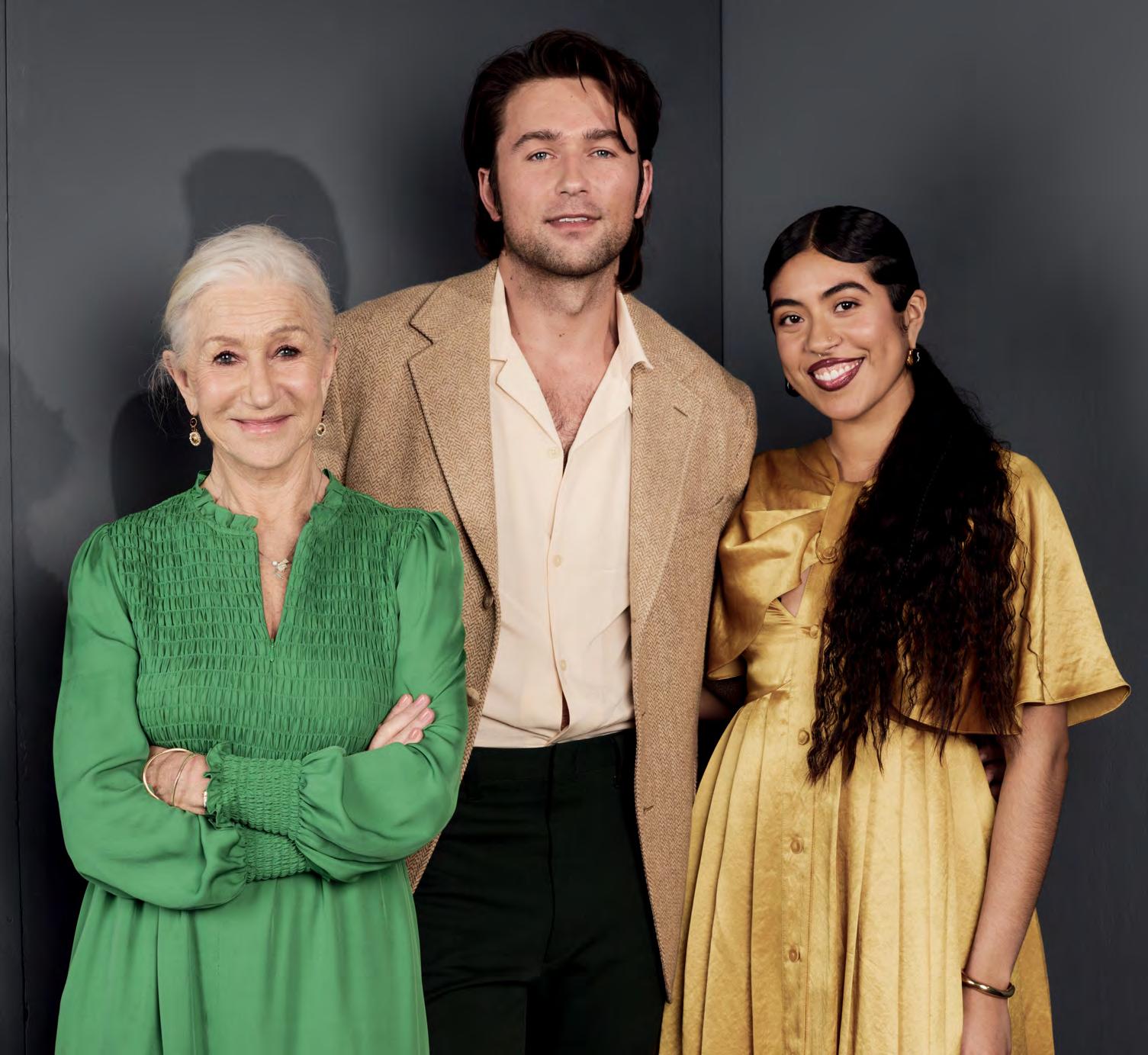 Over two days at the Directors Guild of America, the cream of the drama crop gathered for Deadline's flagship celebration of TV.
Photographs by MICHAEL BUCKNER
Helen Mirren
Over two days at the Directors Guild of America, the cream of the drama crop gathered for Deadline's flagship celebration of TV.
Photographs by MICHAEL BUCKNER
Helen Mirren
1923 58 DEADLINE.COM/AWARDSLINE
Brandon Sklenar Aminah Nieves
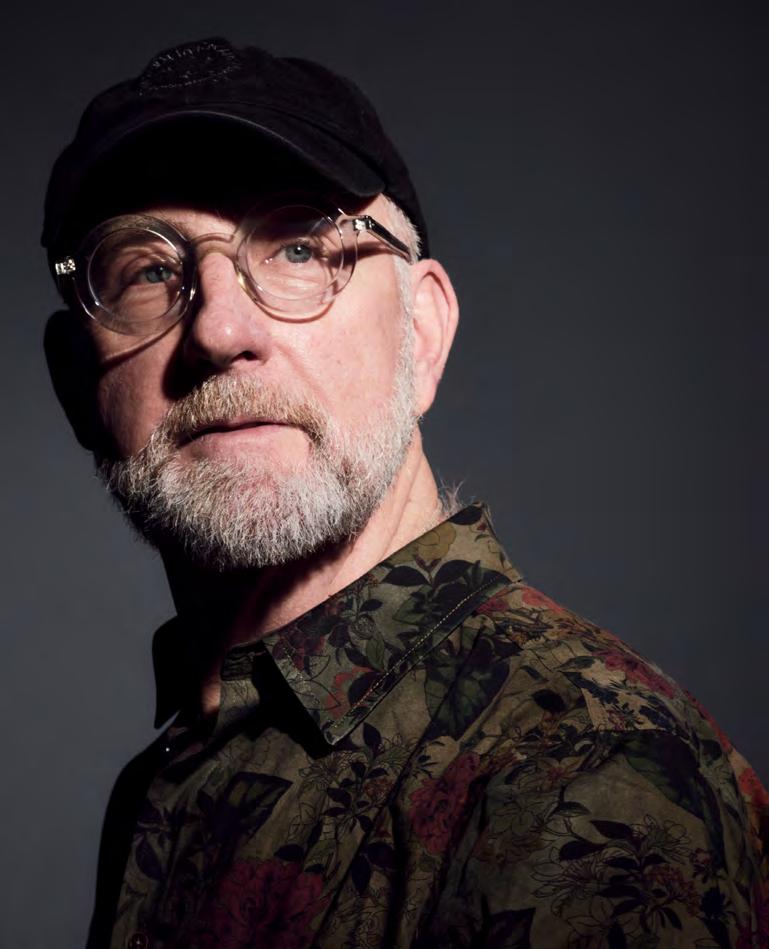
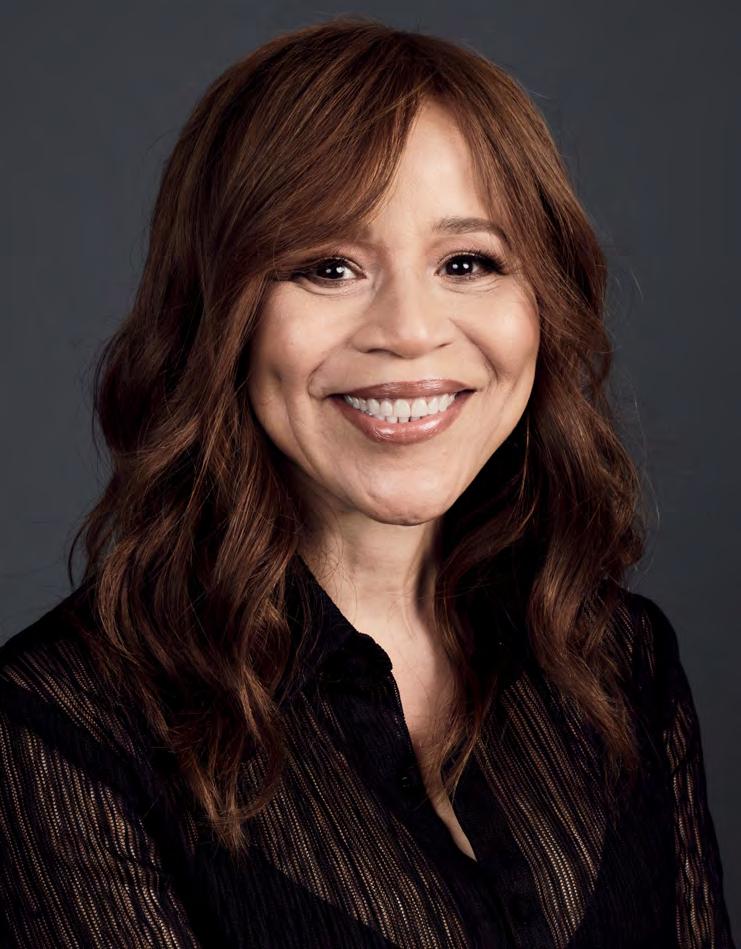
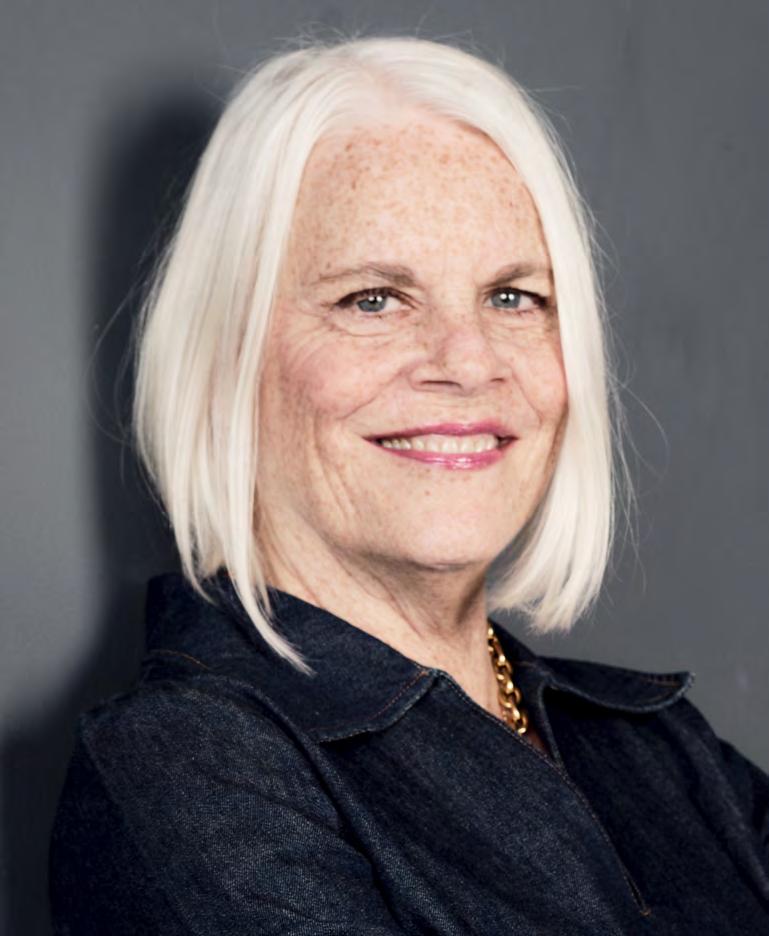
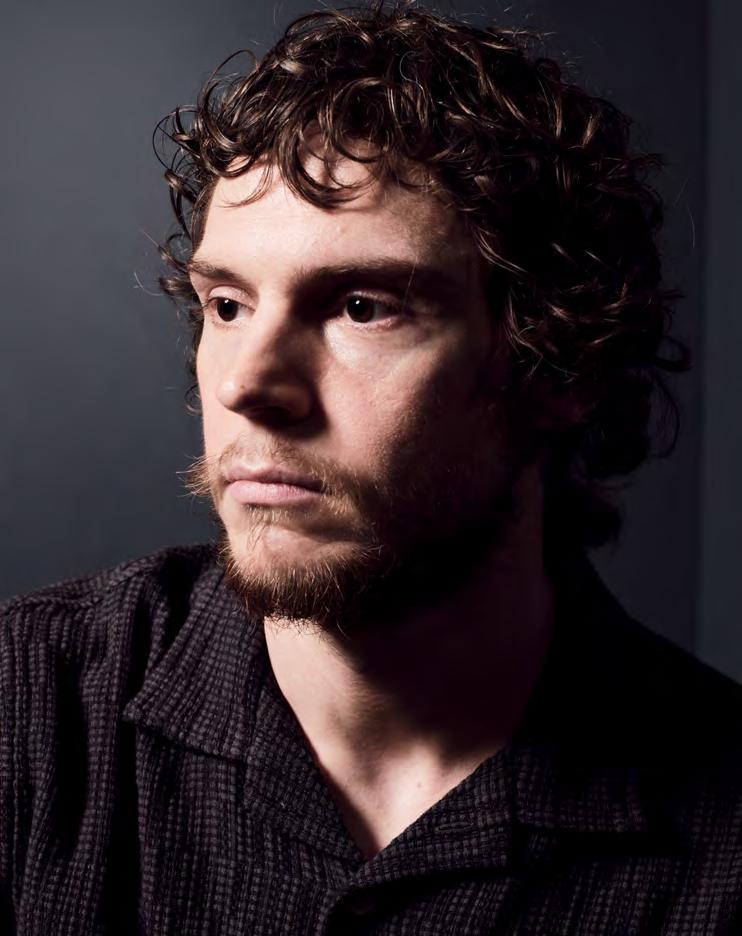 Rosie Perez
YOUR HONOR
Ramsey Avery
THE LORD OF THE RINGS: THE RINGS OF POWER
Evan Peters
DAHMER – MONSTER: THE JEFFREY DAHMER STORY
Joan Rater
A SMALL LIGHT
Rosie Perez
YOUR HONOR
Ramsey Avery
THE LORD OF THE RINGS: THE RINGS OF POWER
Evan Peters
DAHMER – MONSTER: THE JEFFREY DAHMER STORY
Joan Rater
A SMALL LIGHT
Taron Egerton
Paul Walter Hauser
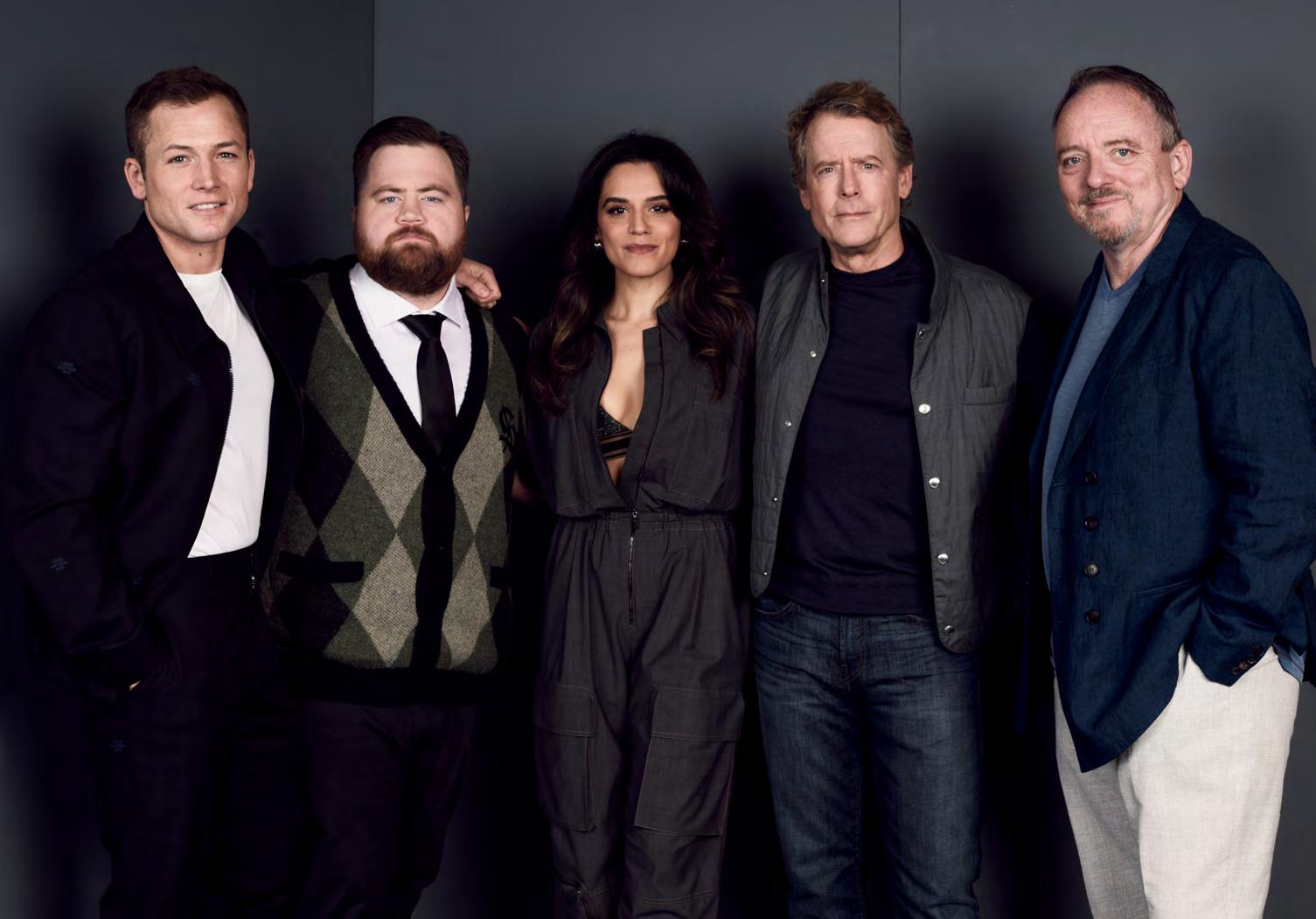
Sepideh Moafi
Greg Kinnear
Dennis Lehane
BLACK BIRD
Paddy Considine
HOUSE OF THE DRAGON
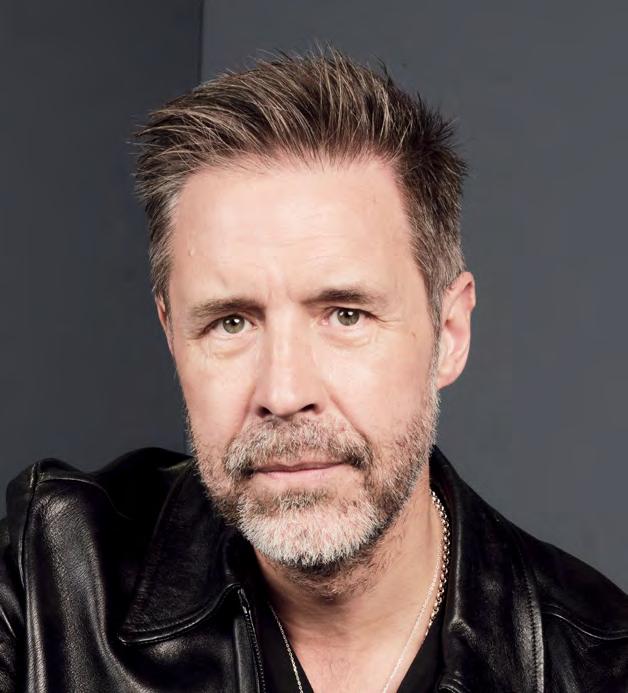
60 DEADLINE.COM/ AWARDSLINE
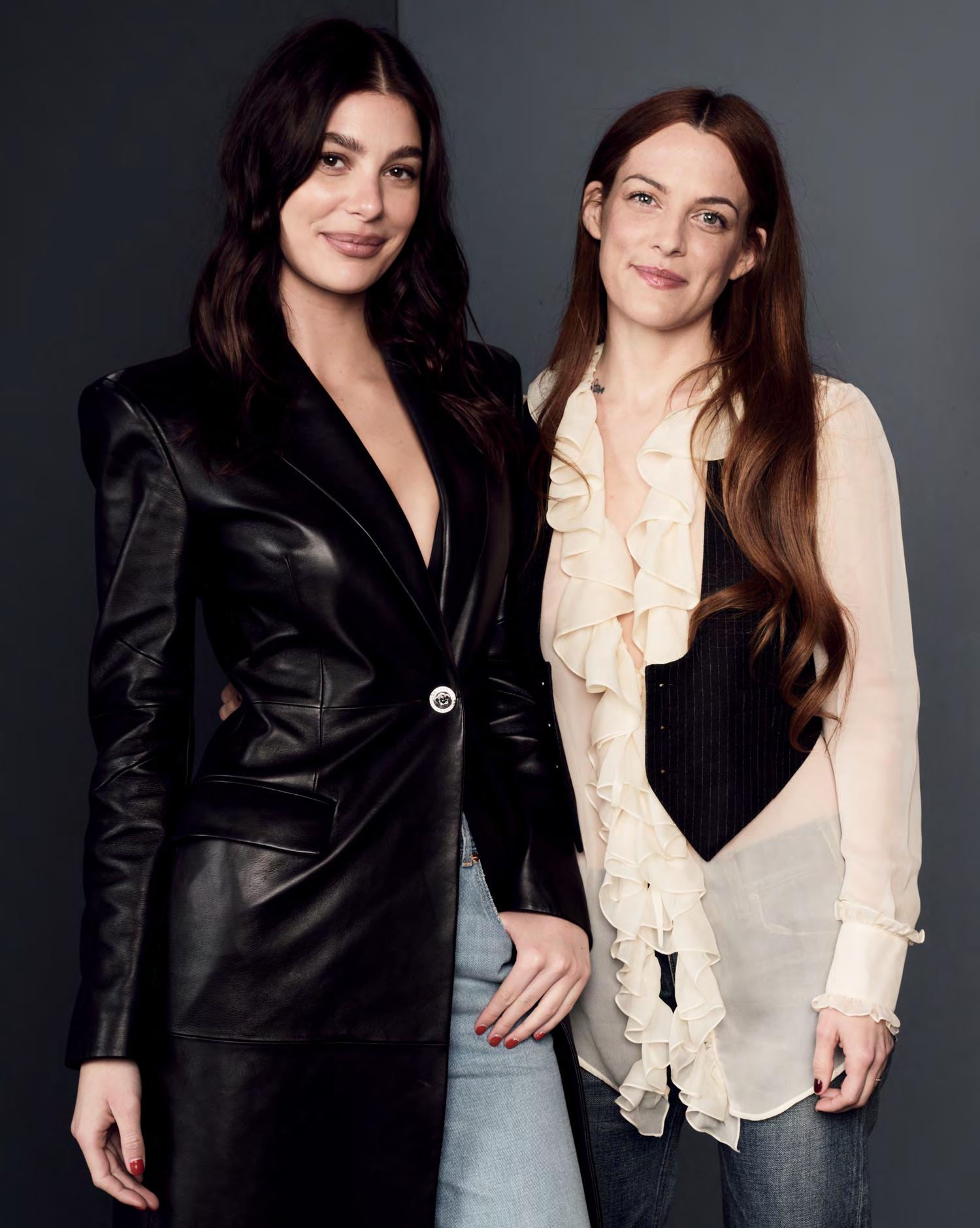 Camila Morrone Riley Keough
DAISY JONES & THE SIX
Camila Morrone Riley Keough
DAISY JONES & THE SIX
Wes Bentley
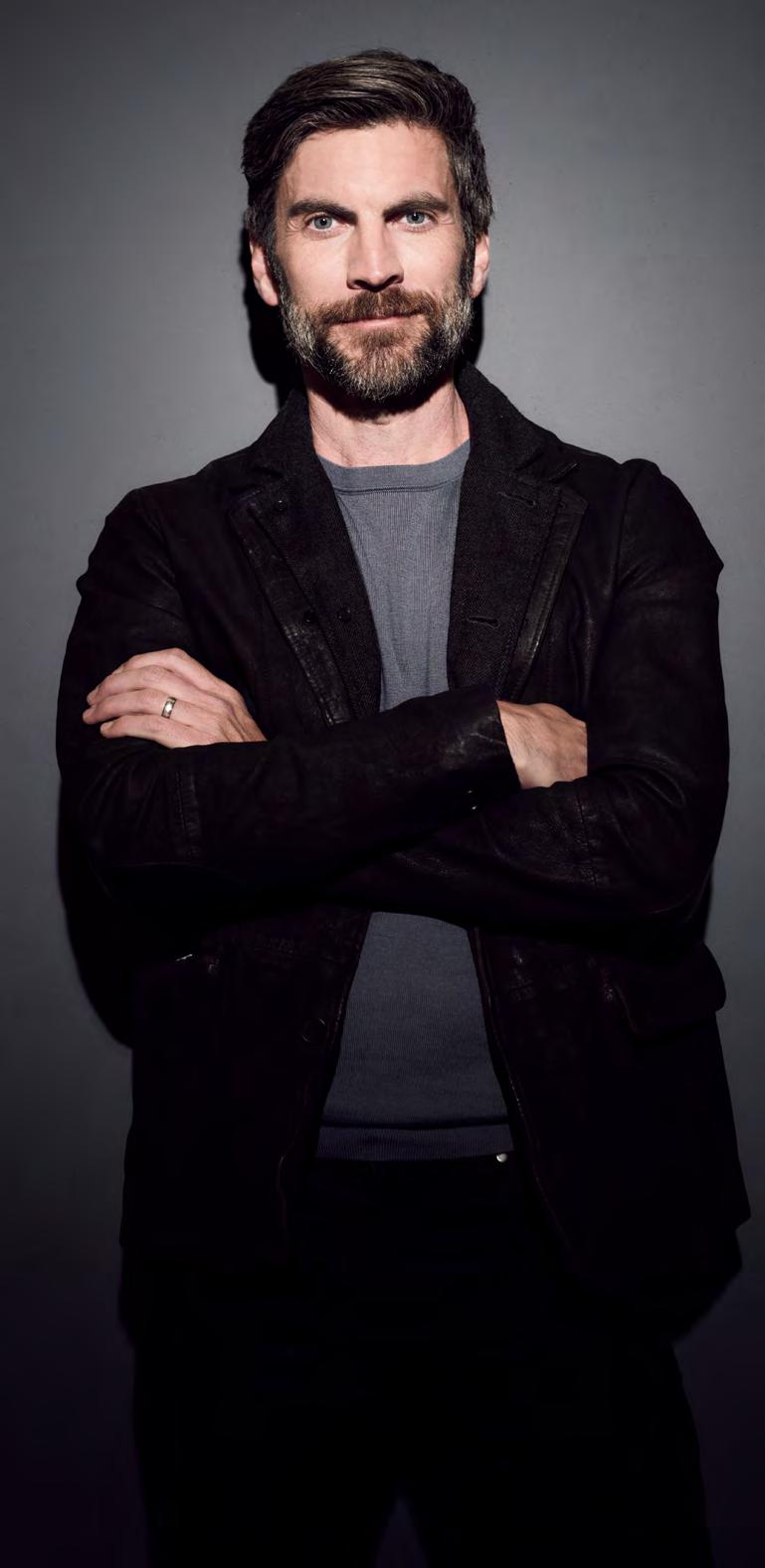

62 DEADLINE.COM/AWARDSLINE
YELLOWSTONE Lio Tipton A FRIEND OF THE FAMILY
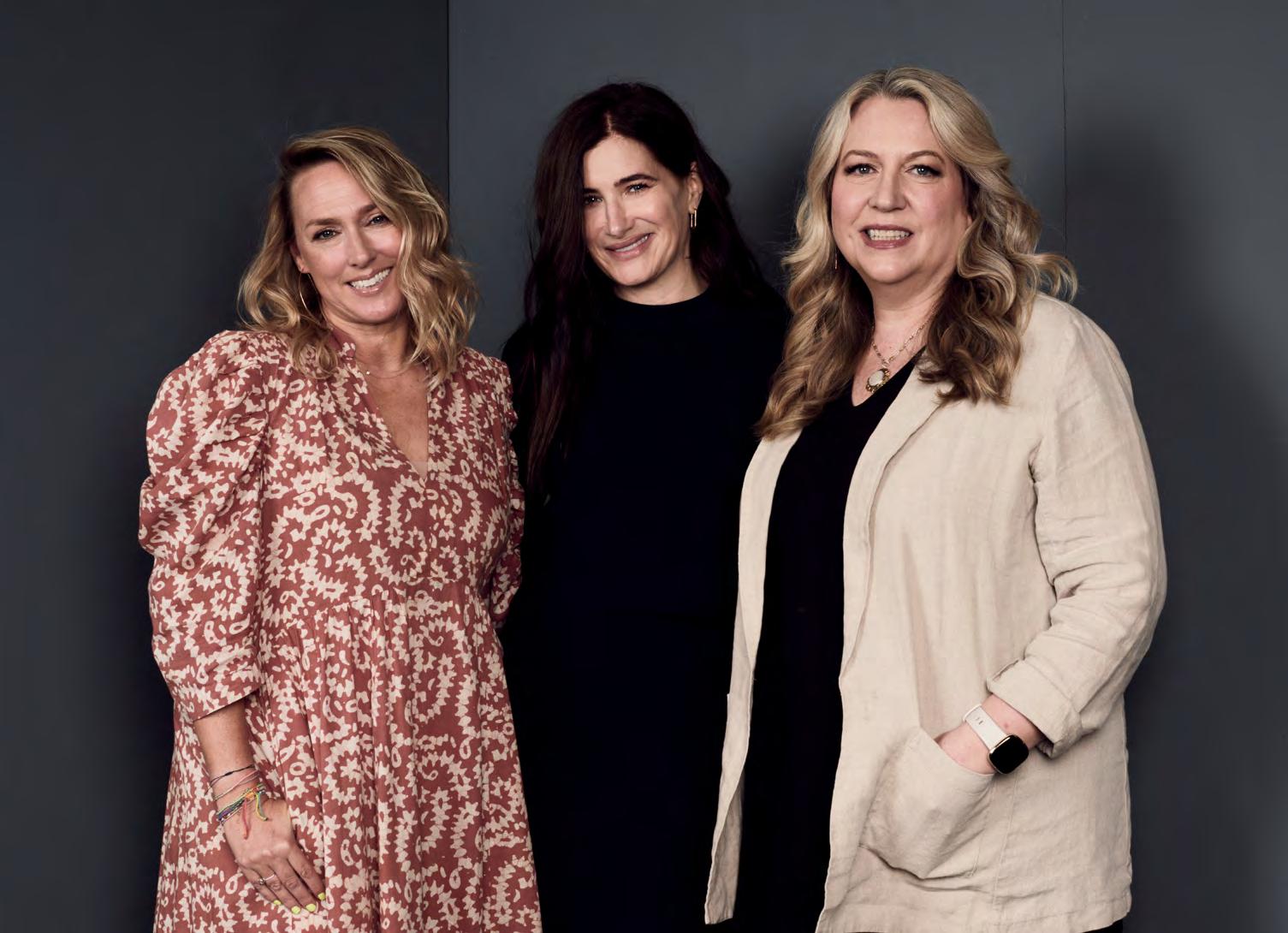
 Liz Tigelaar
Kathryn Hahn
Cheryl Strayed
TINY BEAUTIFUL THINGS
Bryan Cranston YOUR HONOR
Liz Tigelaar
Kathryn Hahn
Cheryl Strayed
TINY BEAUTIFUL THINGS
Bryan Cranston YOUR HONOR
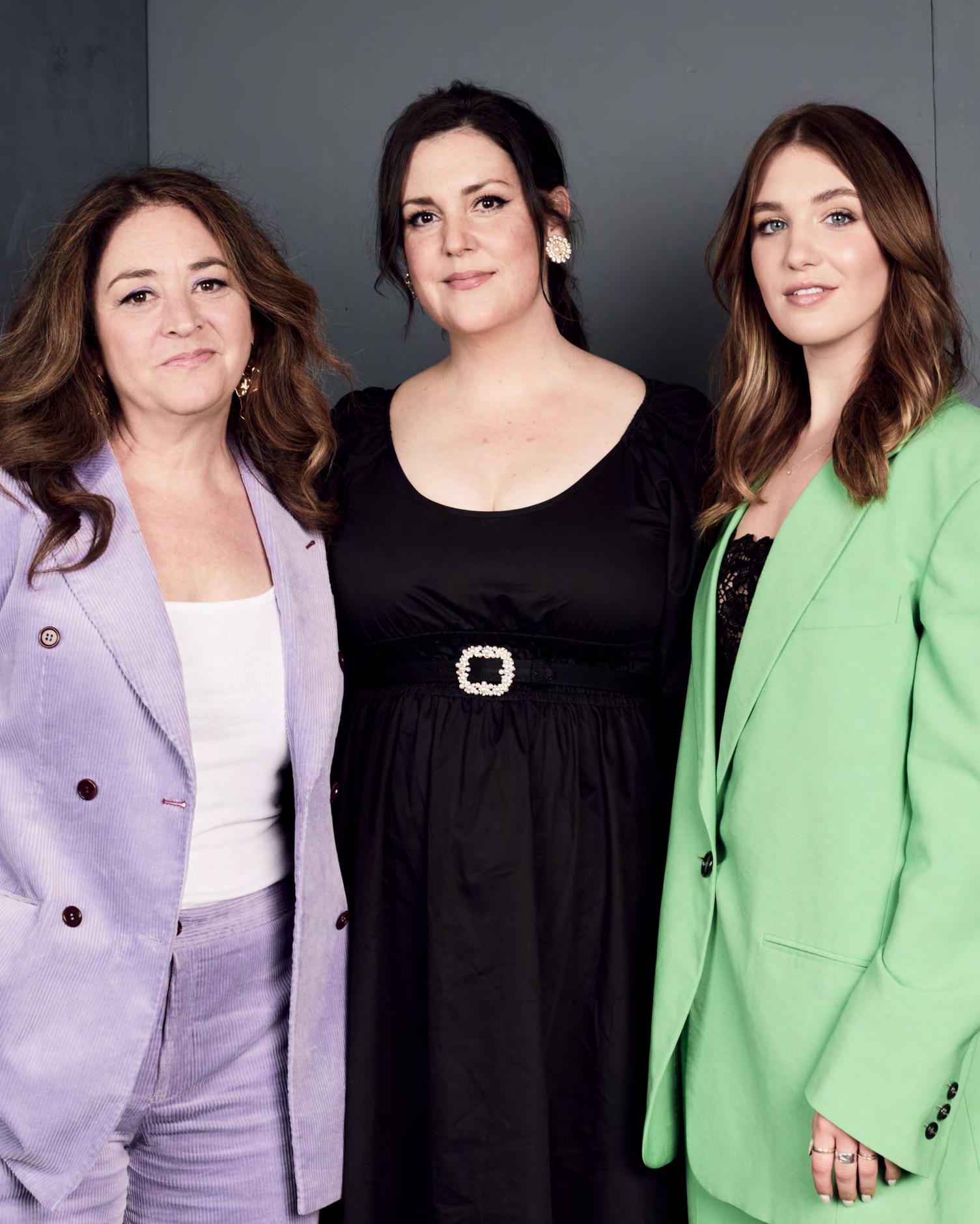
Liz Garbus Melanie Lynskey Sophie Nélisse YELLOWJACKETS
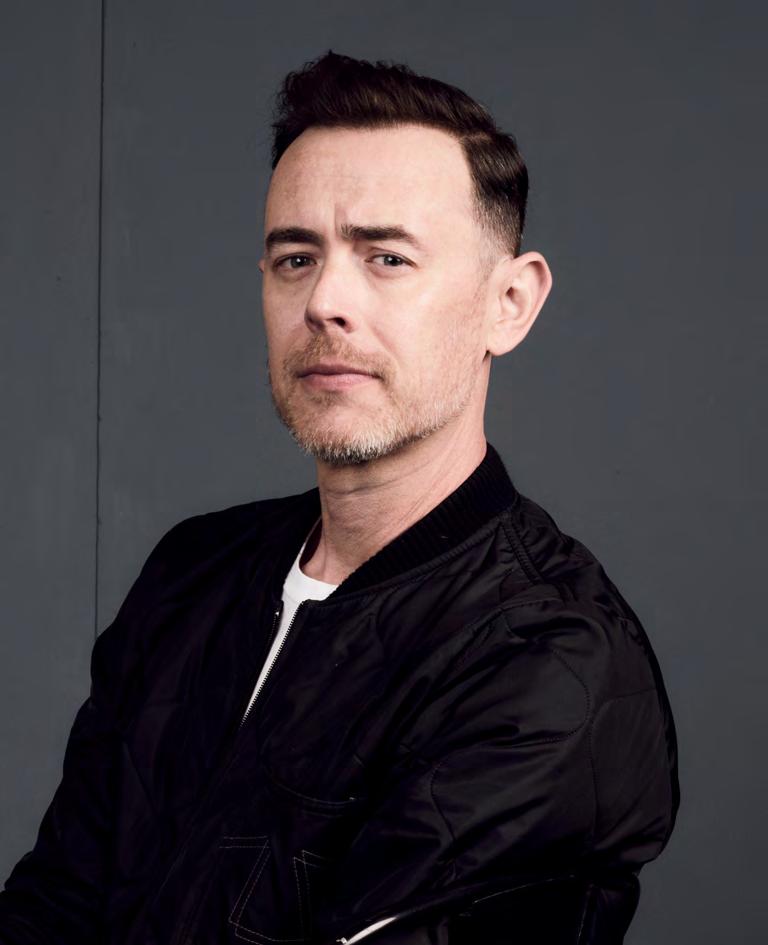
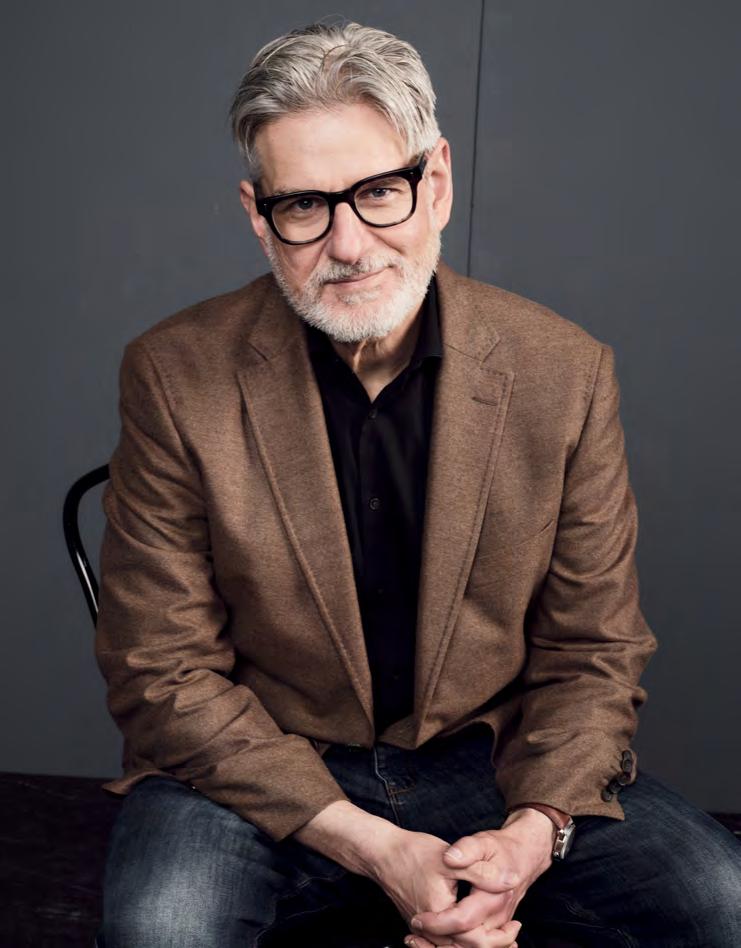
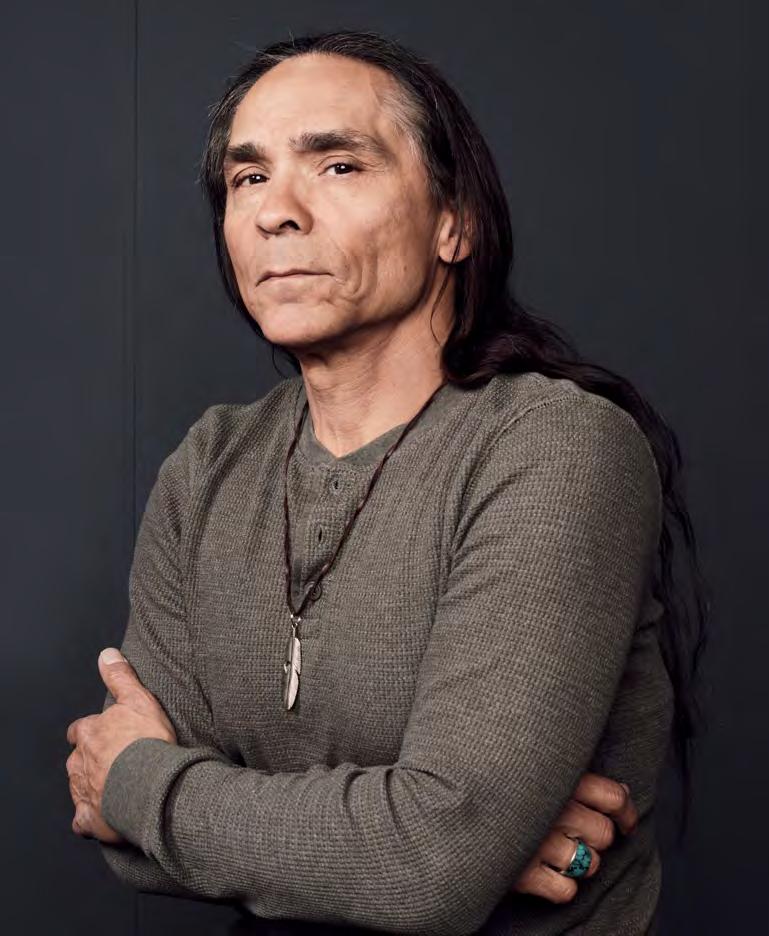
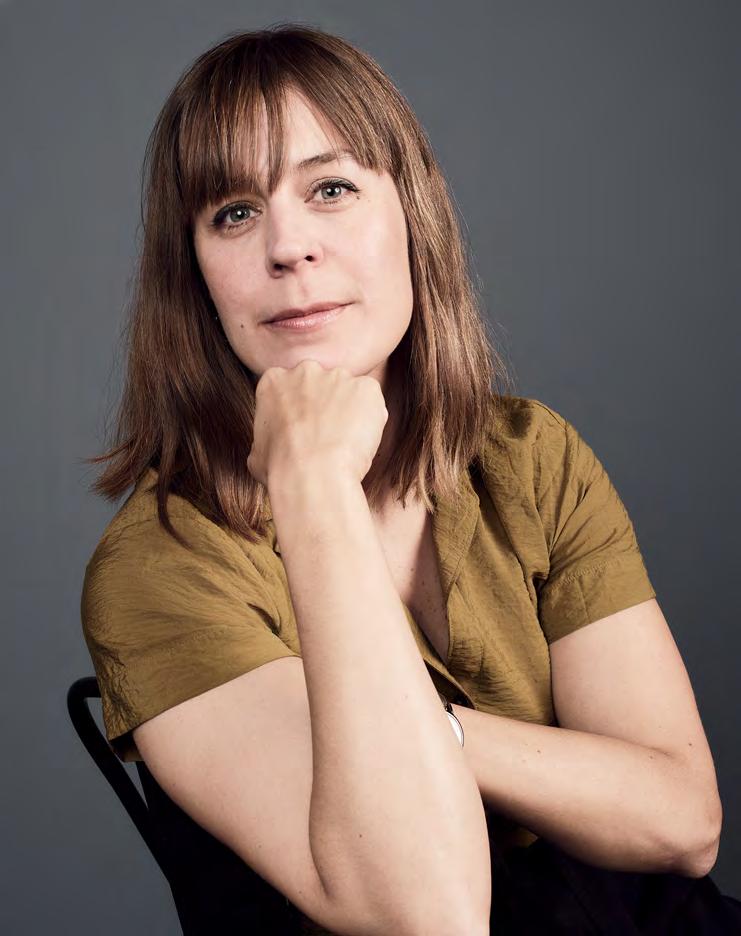 Peter Gould BETTER CALL SAUL
Colin Hanks
A FRIEND OF THE FAMILY
Zahn McClarnon DARK WINDS
Dorothy Fortenberry EXTRAPOLATIONS
Peter Gould BETTER CALL SAUL
Colin Hanks
A FRIEND OF THE FAMILY
Zahn McClarnon DARK WINDS
Dorothy Fortenberry EXTRAPOLATIONS
Bear McCreary

THE LORD OF THE RINGS: THE RINGS OF POWER
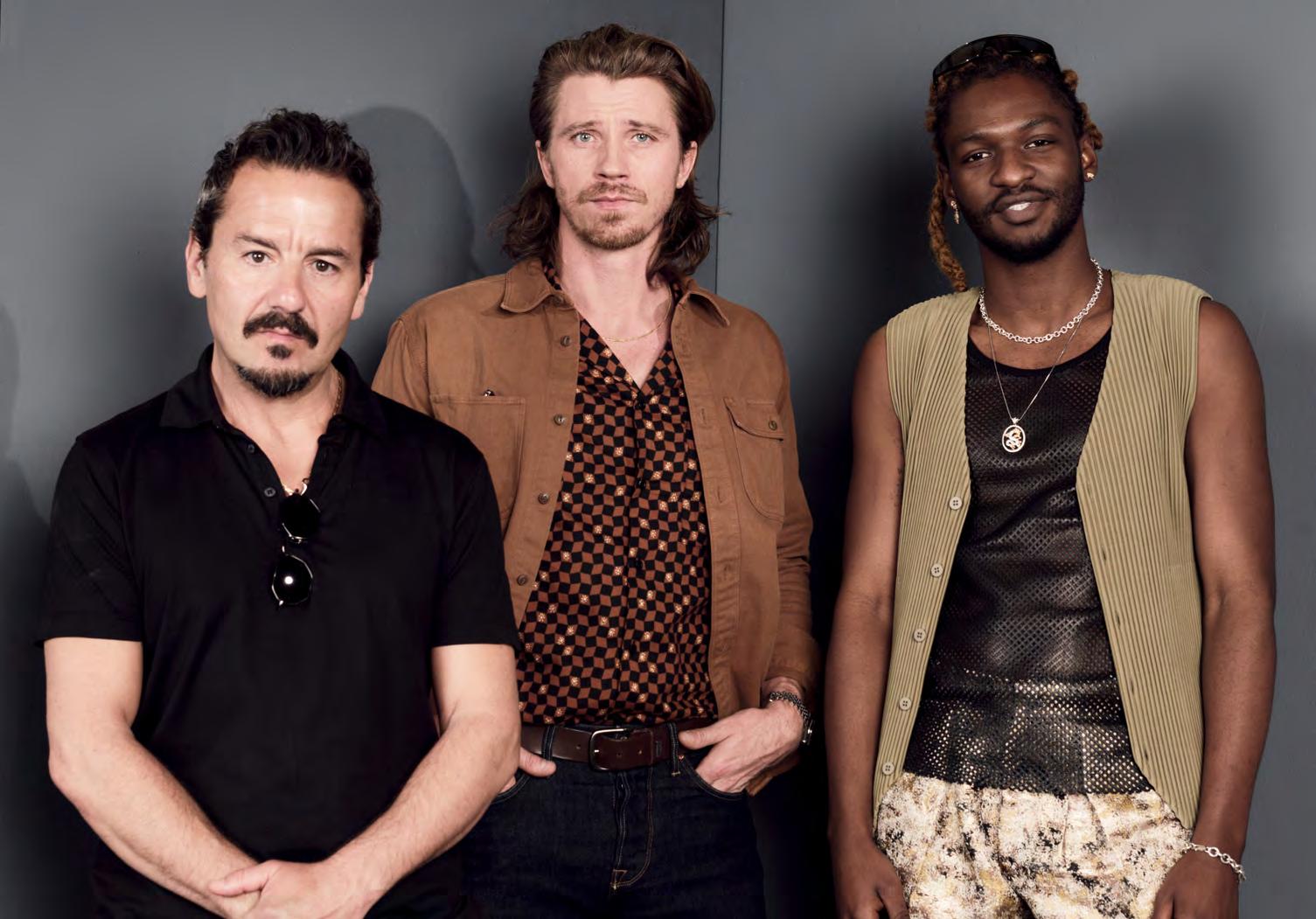 Max Casella
Garrett Hedlund
Jay Will
TULSA KING
Max Casella
Garrett Hedlund
Jay Will
TULSA KING
66 DEADLINE.COM/AWARDSLINE
Piper Perabo YELLOWSTONE
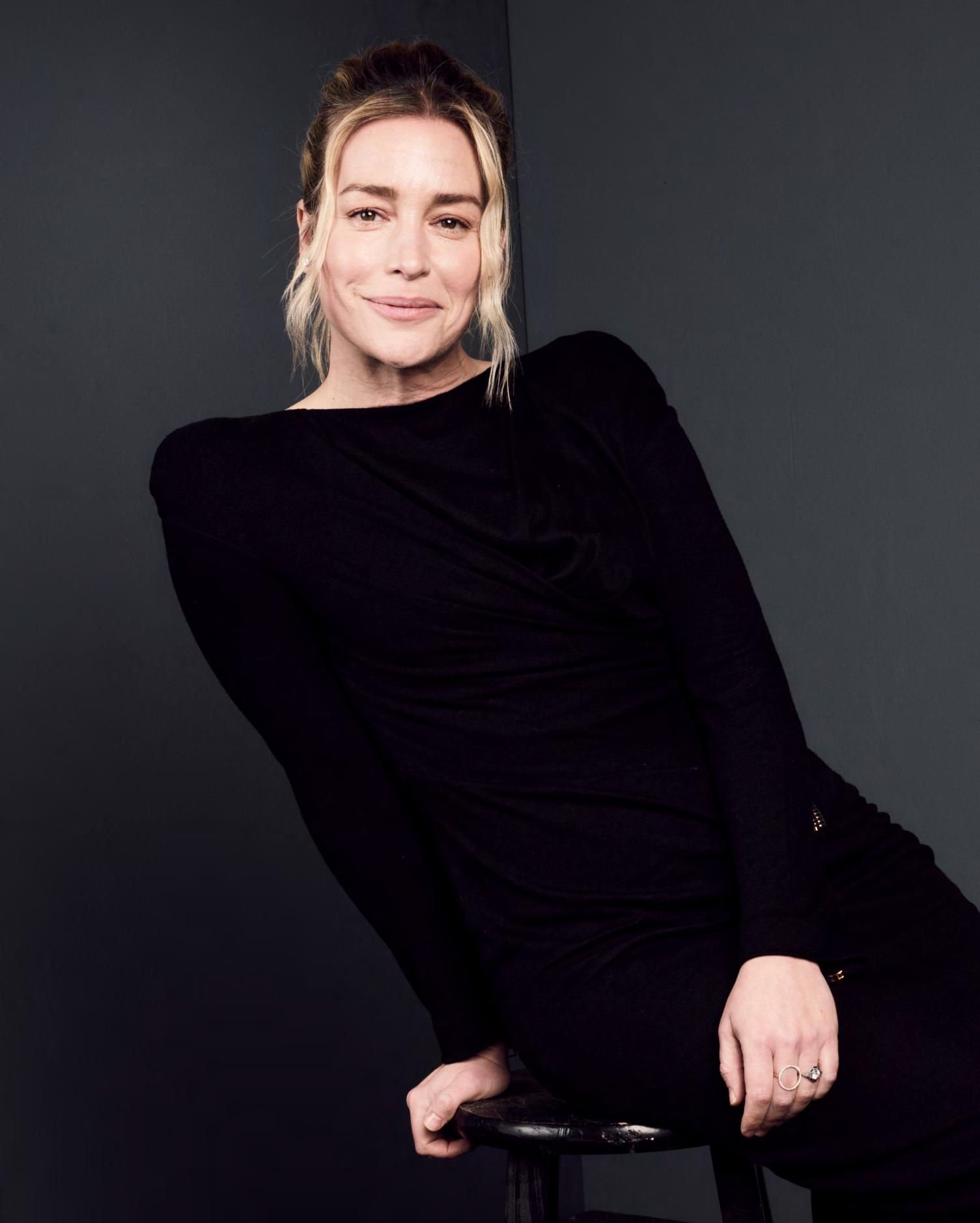
Niecy Nash-Betts
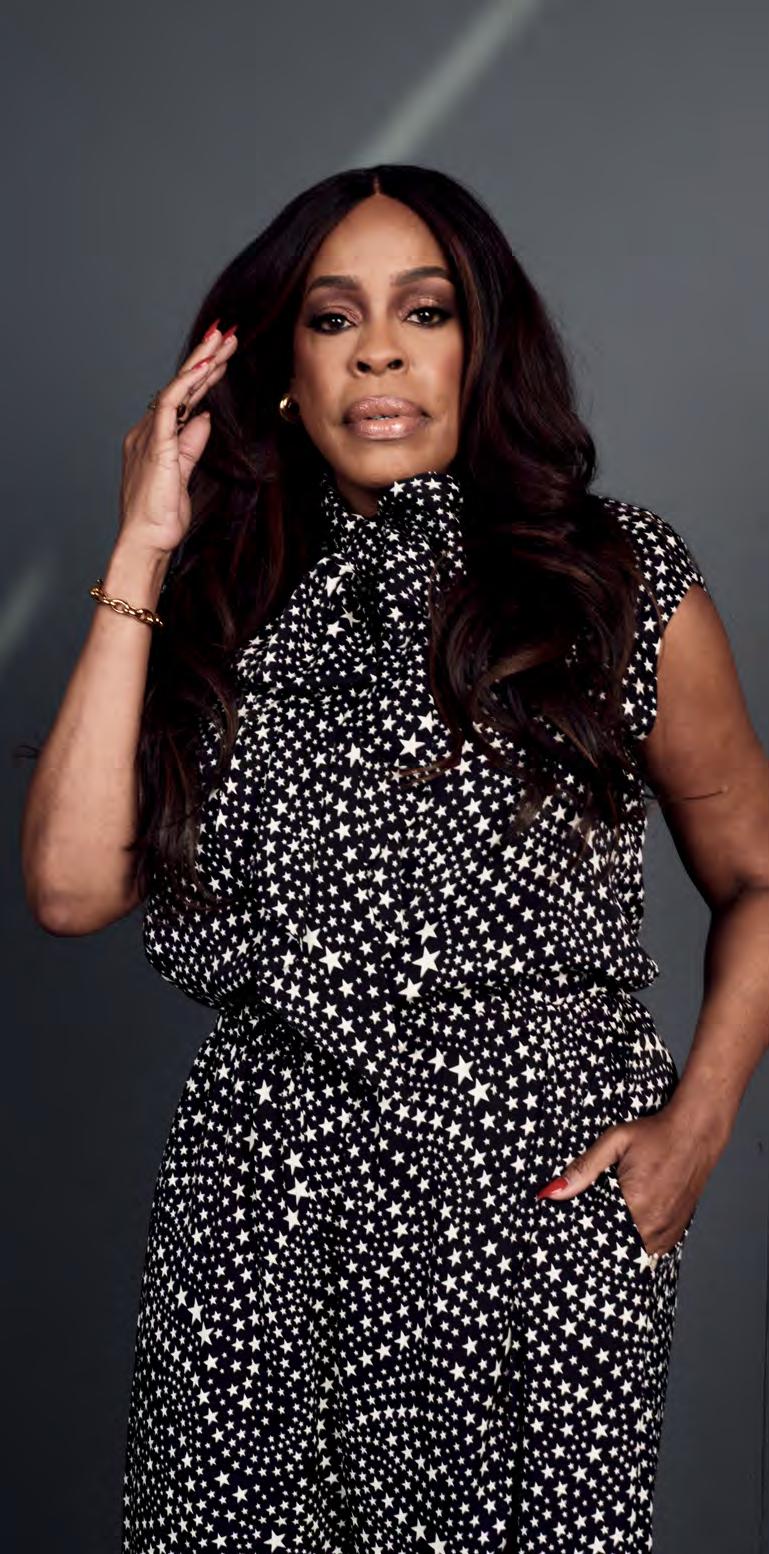
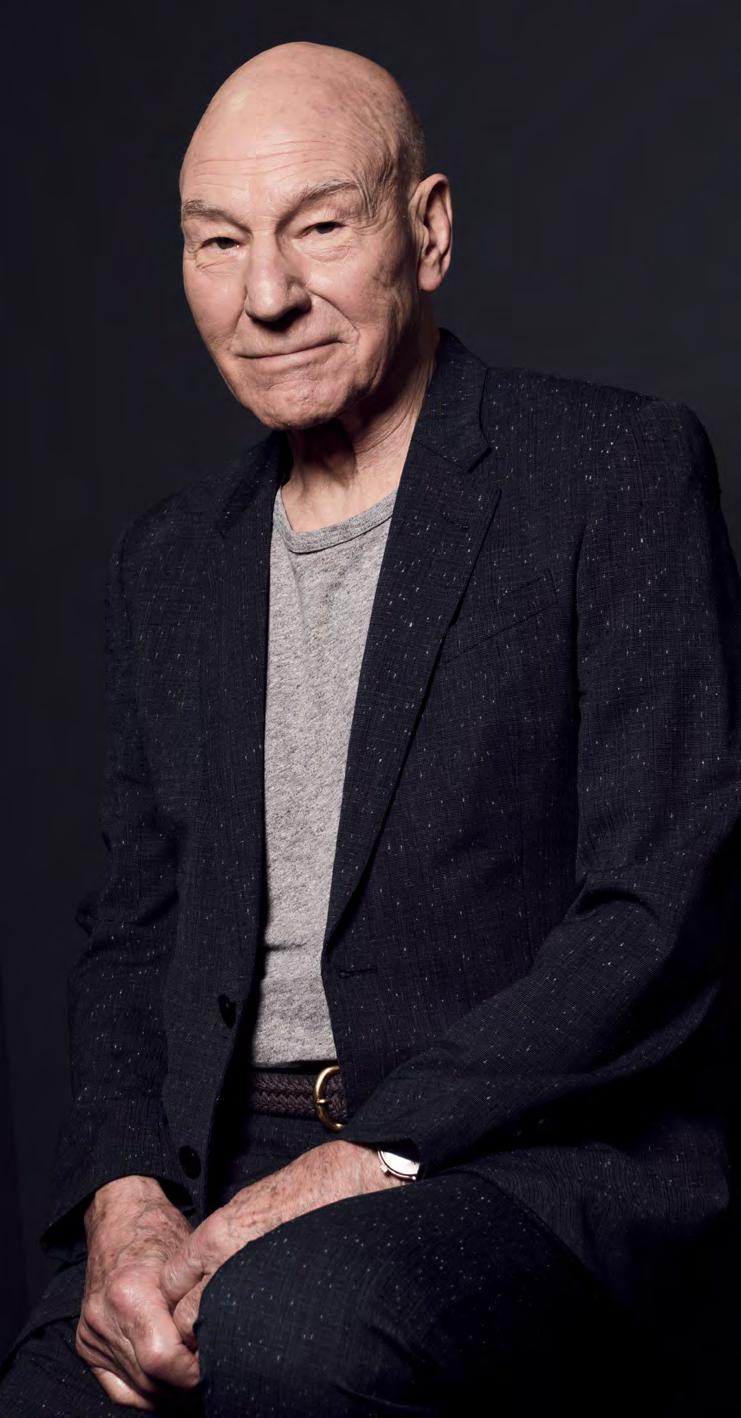 Patrick Stewart
STAR TREK: PICARD
Patrick Stewart
STAR TREK: PICARD
68 DEADLINE.COM/AWARDSLINE
DAHMER – MONSTER: THE JEFFREY DAHMER STORY
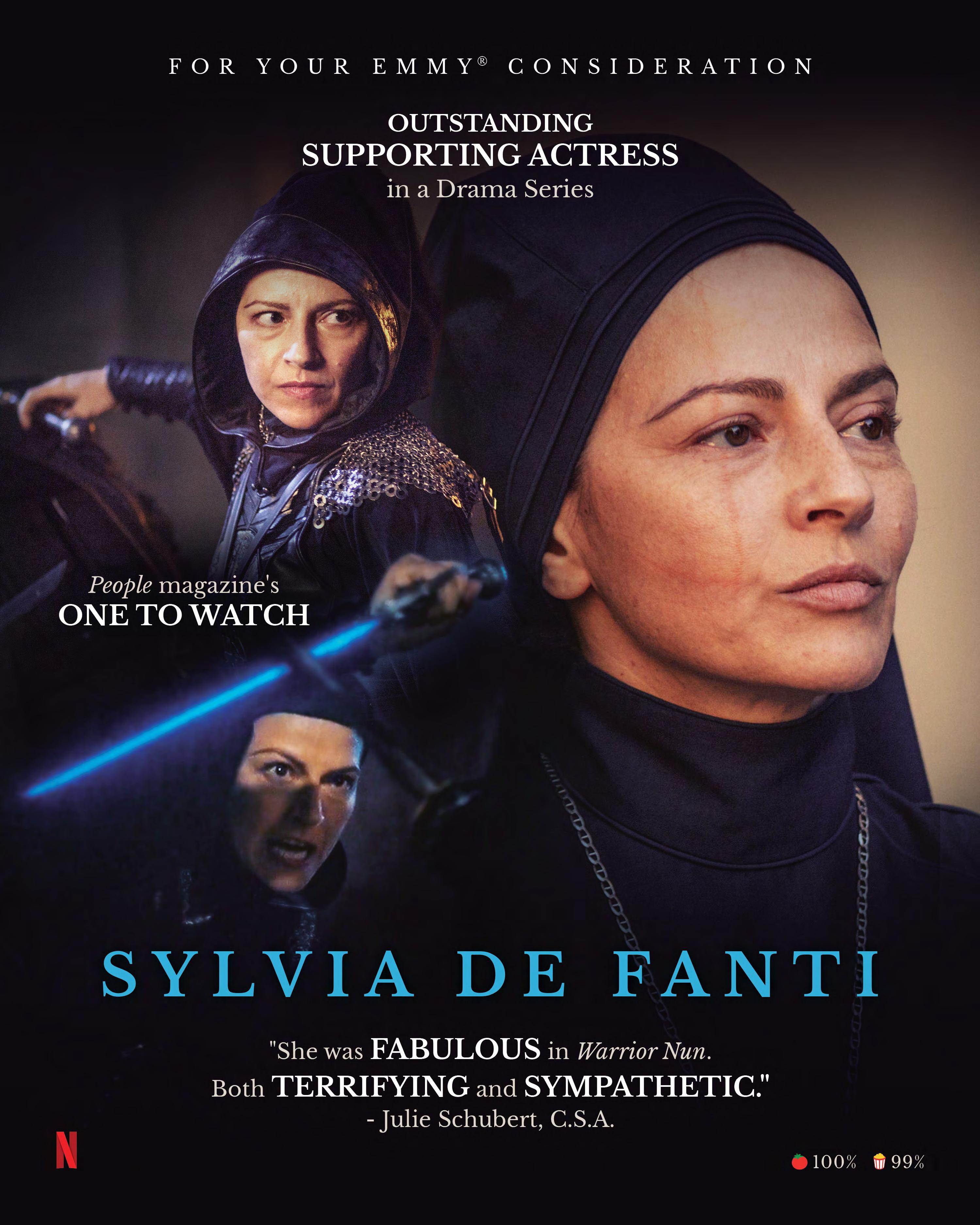
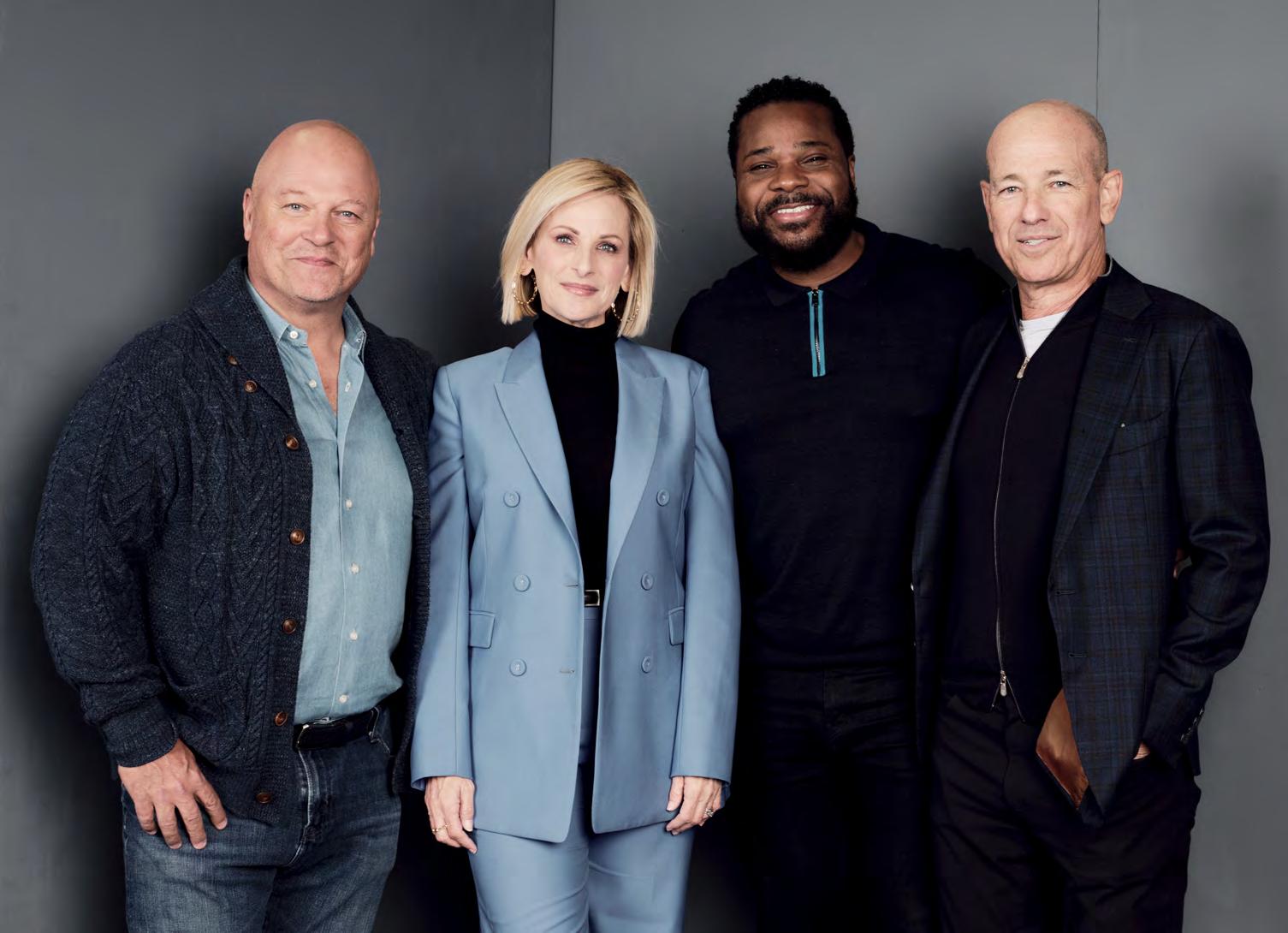
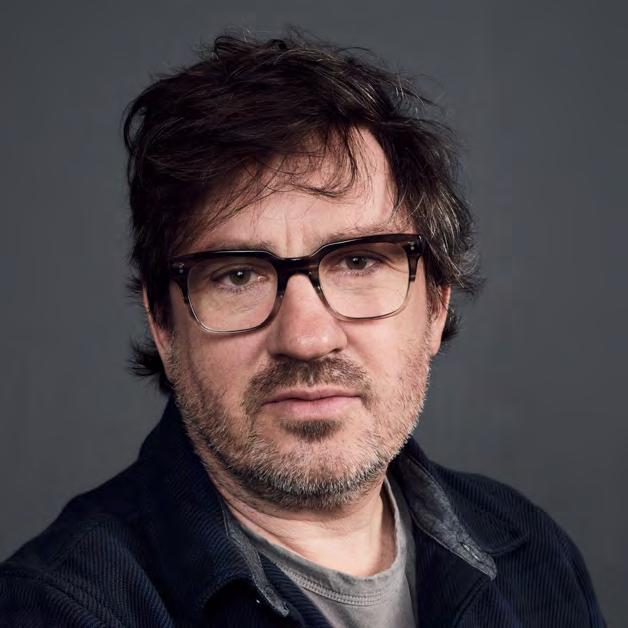 Michael Chiklis
Marlee Matlin
Malcolm-Jamal Warner
Howard Gordon ACCUSED
Alexander Cary
Michael Chiklis
Marlee Matlin
Malcolm-Jamal Warner
Howard Gordon ACCUSED
Alexander Cary
A SPY AMONG FRIENDS
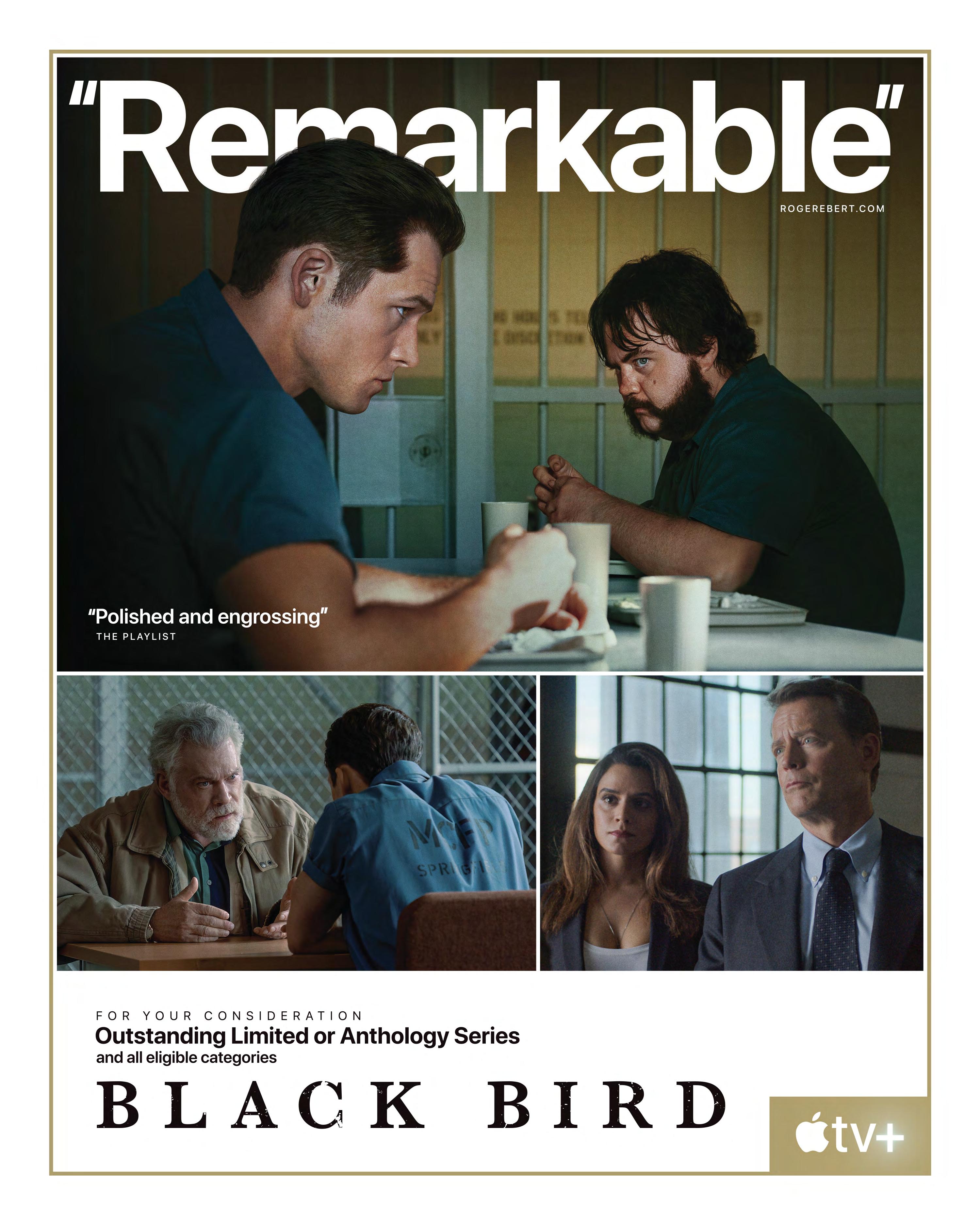

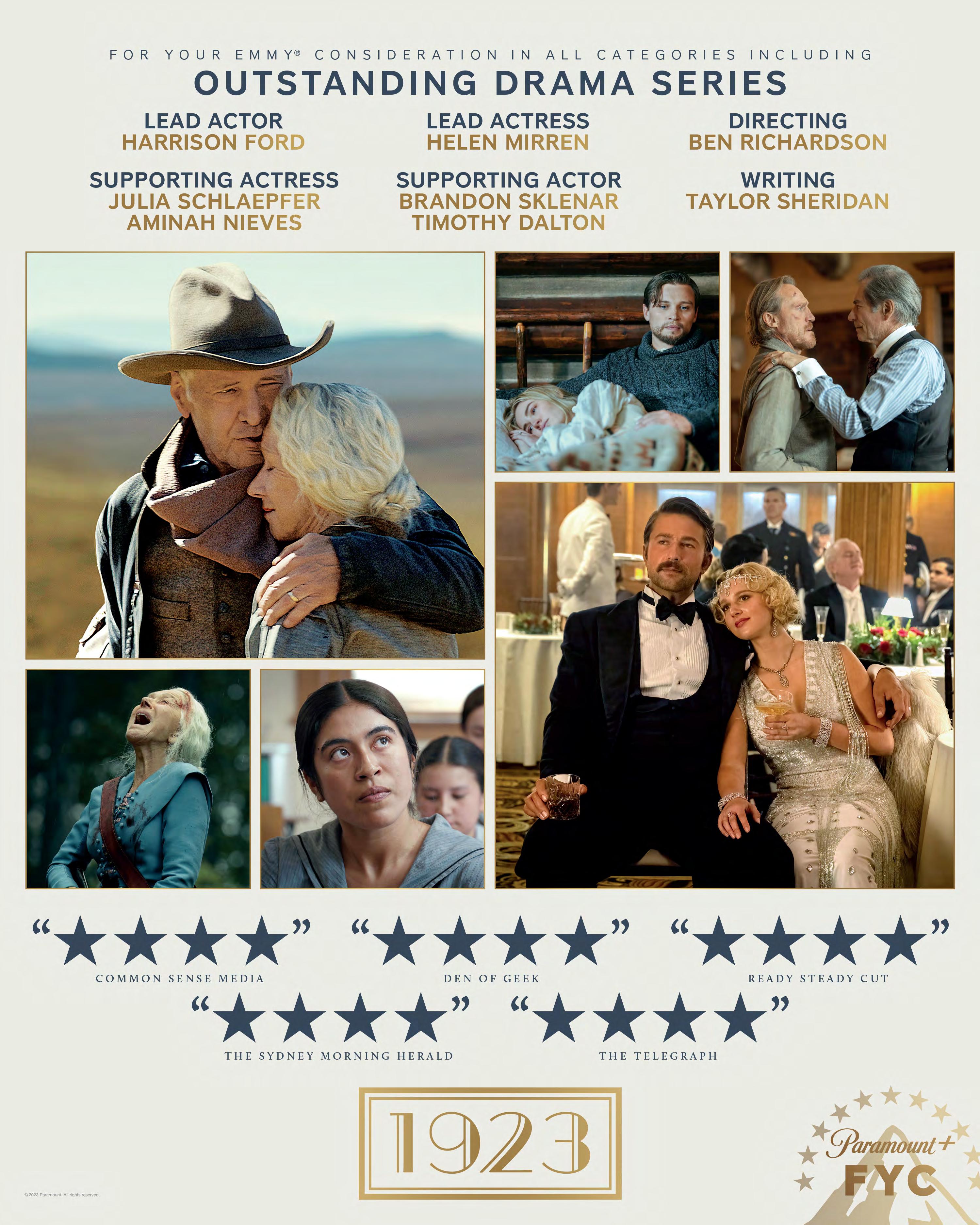















 By Joe Utichi
By Joe Utichi




































 Bella Ramsey styled by Fabio Immediato /The Only Agency
Bella Ramsey styled by Fabio Immediato /The Only Agency




























 BY ANTONIA BLYTH
BY ANTONIA BLYTH









 By Ryan Fleming
By Ryan Fleming










 Over two days at the Directors Guild of America, the cream of the drama crop gathered for Deadline's flagship celebration of TV.
Photographs by MICHAEL BUCKNER
Helen Mirren
Over two days at the Directors Guild of America, the cream of the drama crop gathered for Deadline's flagship celebration of TV.
Photographs by MICHAEL BUCKNER
Helen Mirren



 Rosie Perez
YOUR HONOR
Ramsey Avery
THE LORD OF THE RINGS: THE RINGS OF POWER
Evan Peters
DAHMER – MONSTER: THE JEFFREY DAHMER STORY
Joan Rater
A SMALL LIGHT
Rosie Perez
YOUR HONOR
Ramsey Avery
THE LORD OF THE RINGS: THE RINGS OF POWER
Evan Peters
DAHMER – MONSTER: THE JEFFREY DAHMER STORY
Joan Rater
A SMALL LIGHT


 Camila Morrone Riley Keough
DAISY JONES & THE SIX
Camila Morrone Riley Keough
DAISY JONES & THE SIX



 Liz Tigelaar
Kathryn Hahn
Cheryl Strayed
TINY BEAUTIFUL THINGS
Bryan Cranston YOUR HONOR
Liz Tigelaar
Kathryn Hahn
Cheryl Strayed
TINY BEAUTIFUL THINGS
Bryan Cranston YOUR HONOR




 Peter Gould BETTER CALL SAUL
Colin Hanks
A FRIEND OF THE FAMILY
Zahn McClarnon DARK WINDS
Dorothy Fortenberry EXTRAPOLATIONS
Peter Gould BETTER CALL SAUL
Colin Hanks
A FRIEND OF THE FAMILY
Zahn McClarnon DARK WINDS
Dorothy Fortenberry EXTRAPOLATIONS

 Max Casella
Garrett Hedlund
Jay Will
TULSA KING
Max Casella
Garrett Hedlund
Jay Will
TULSA KING


 Patrick Stewart
STAR TREK: PICARD
Patrick Stewart
STAR TREK: PICARD


 Michael Chiklis
Marlee Matlin
Malcolm-Jamal Warner
Howard Gordon ACCUSED
Alexander Cary
Michael Chiklis
Marlee Matlin
Malcolm-Jamal Warner
Howard Gordon ACCUSED
Alexander Cary



